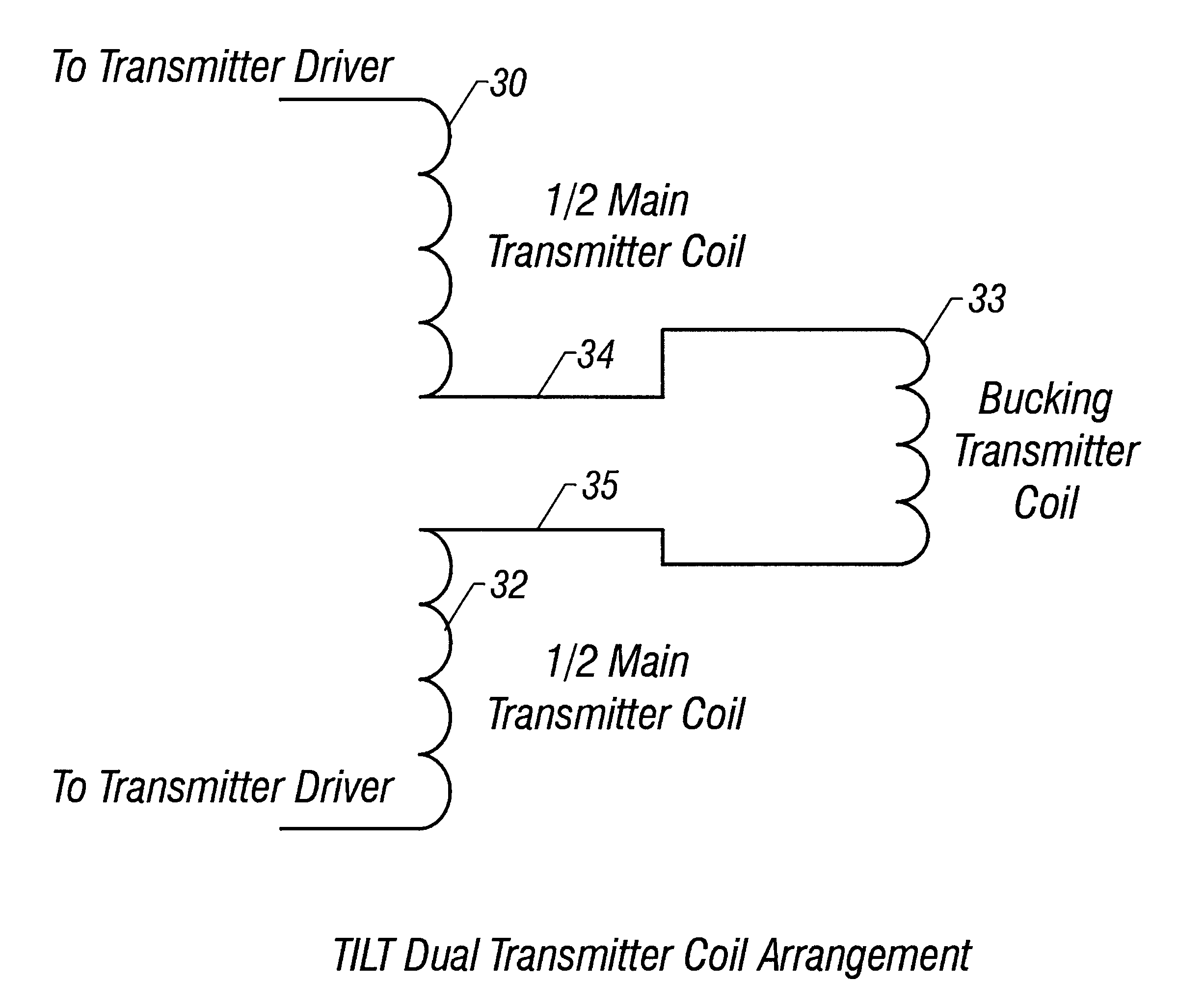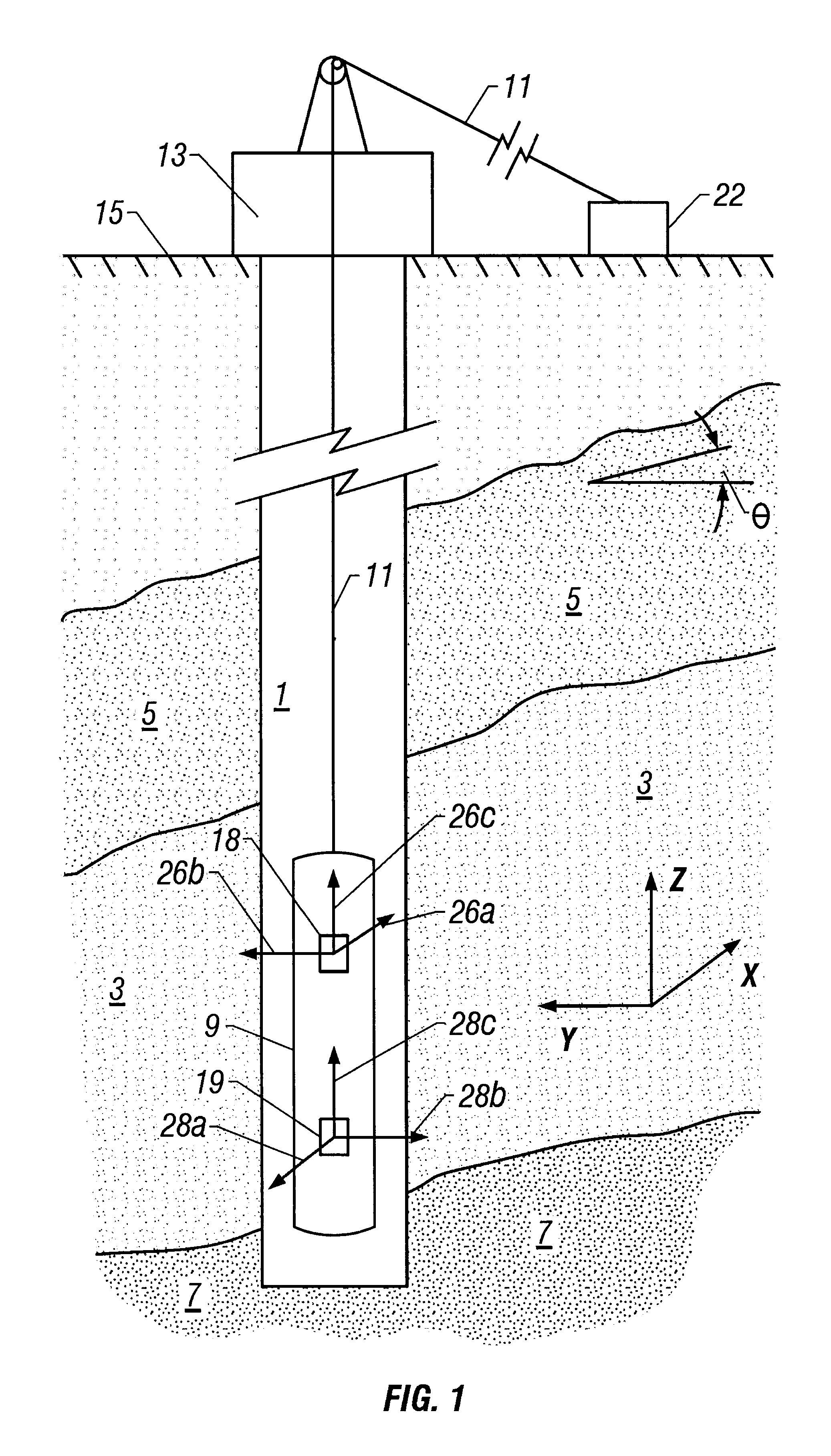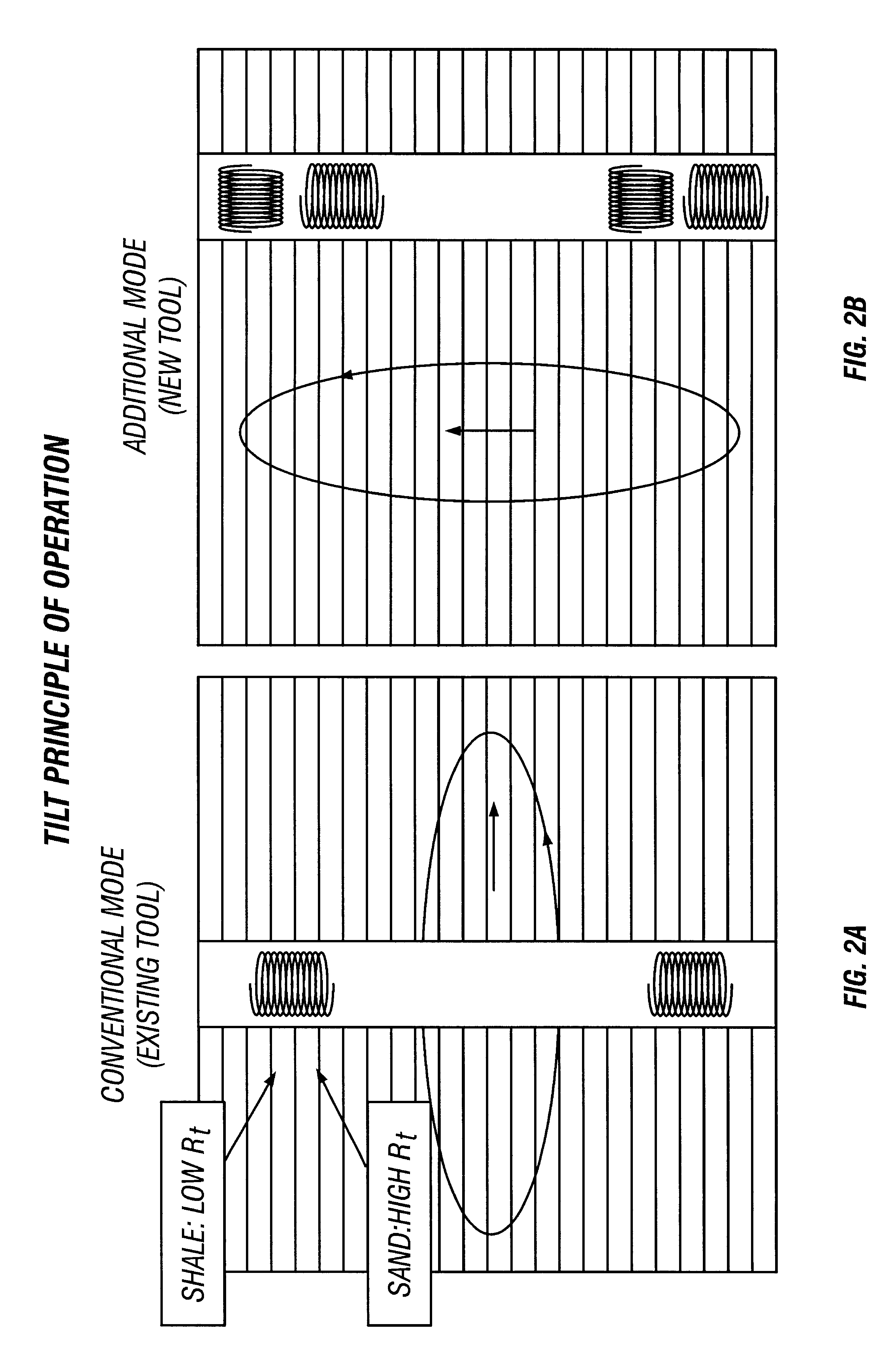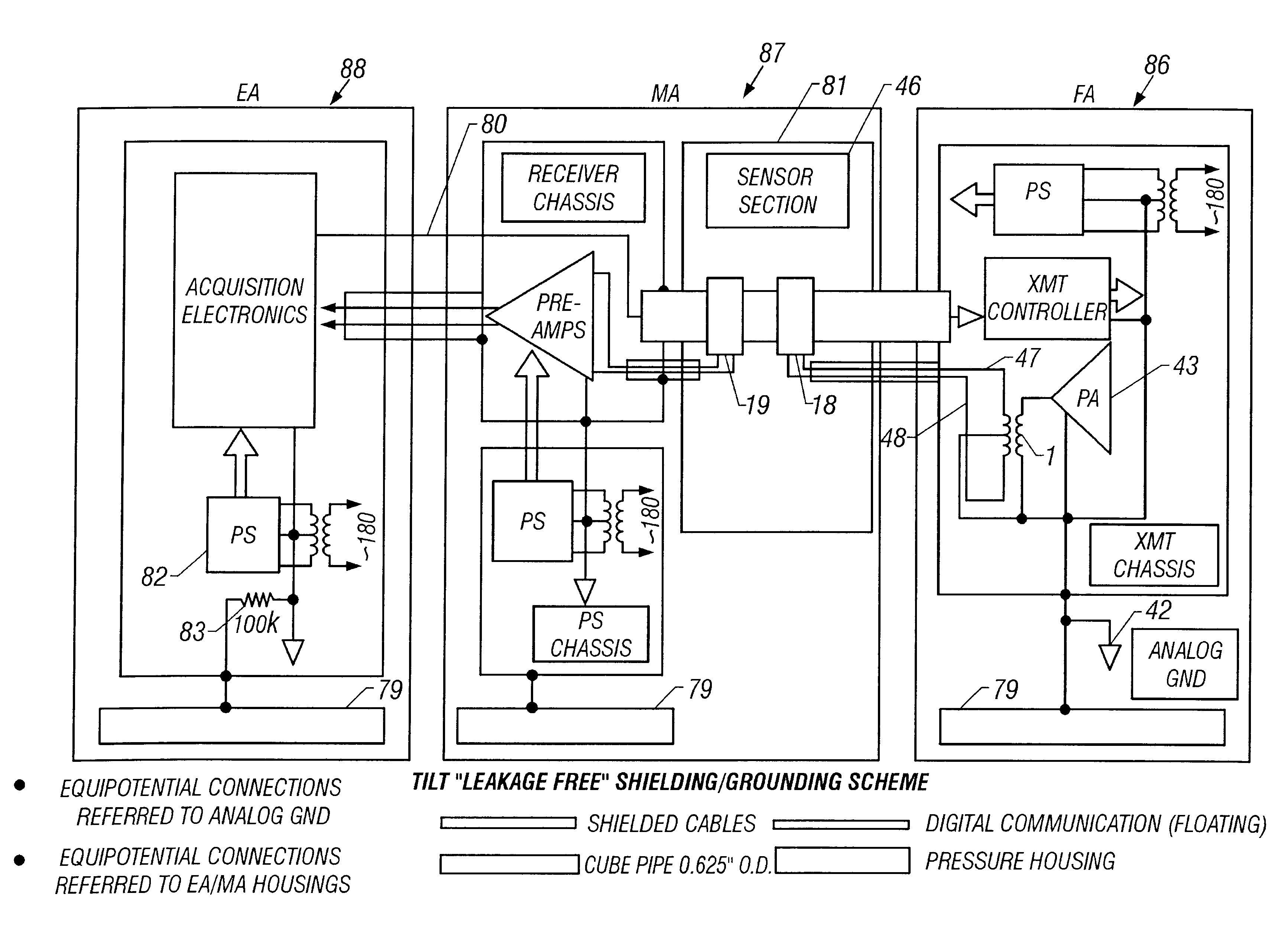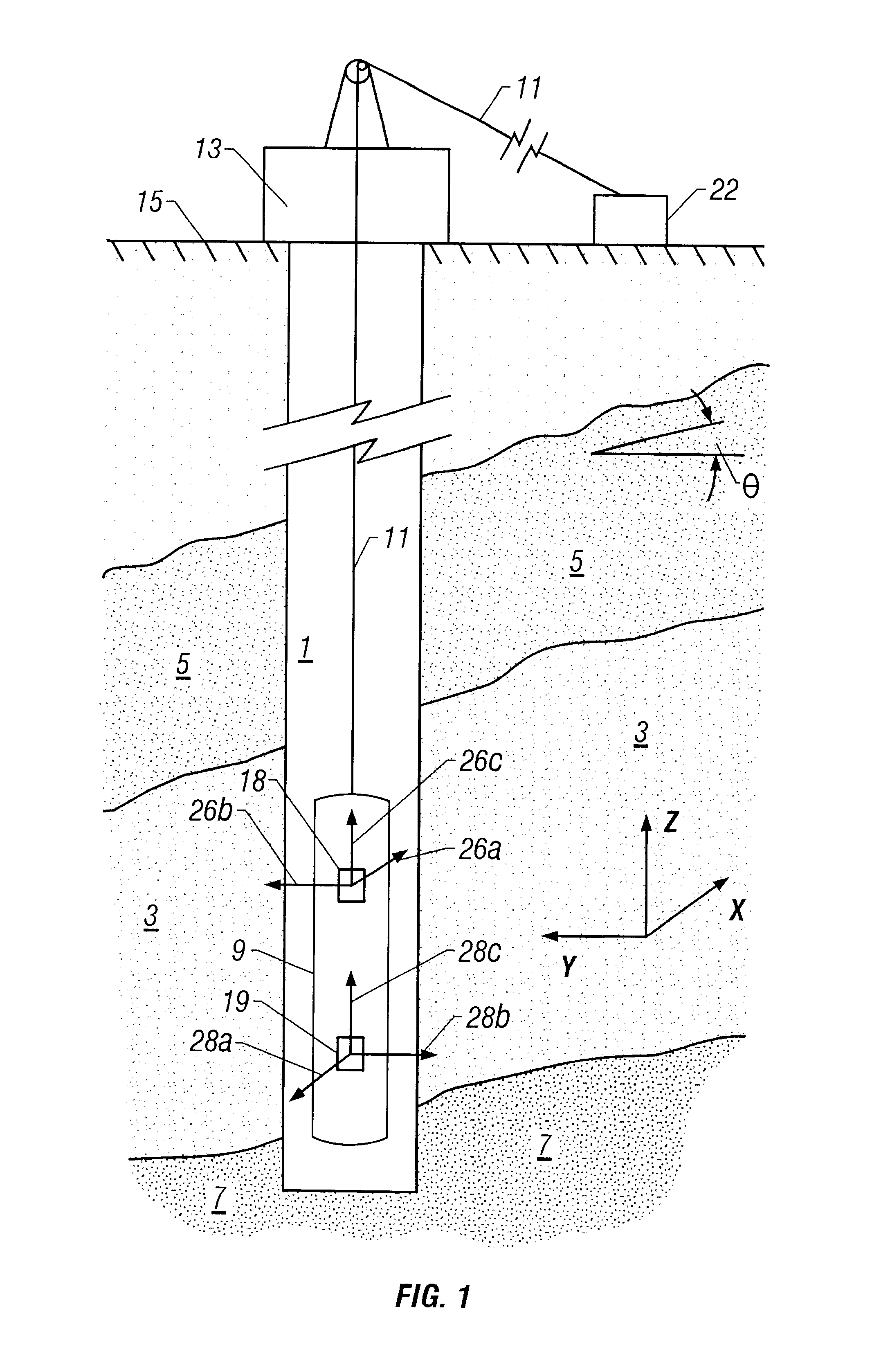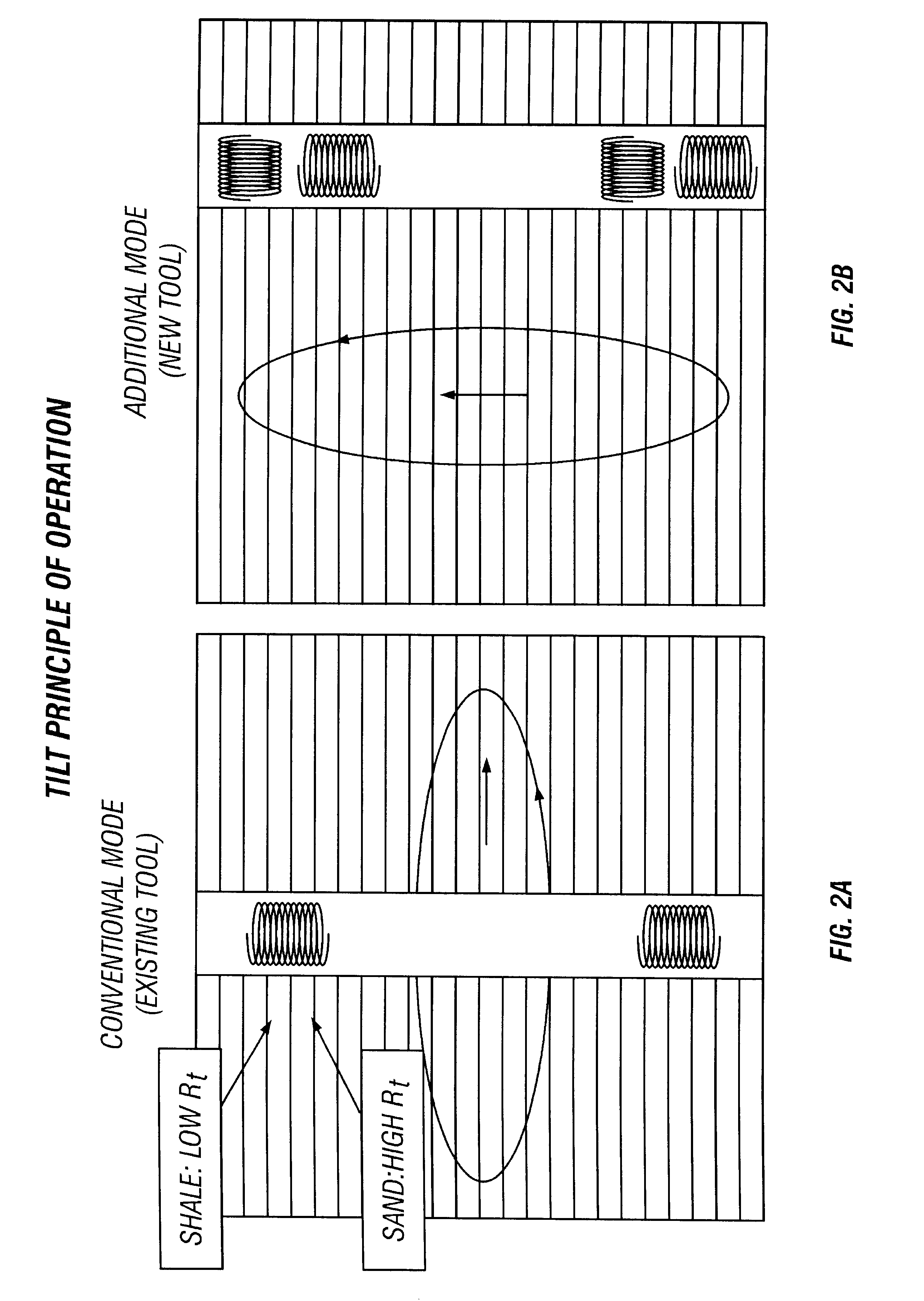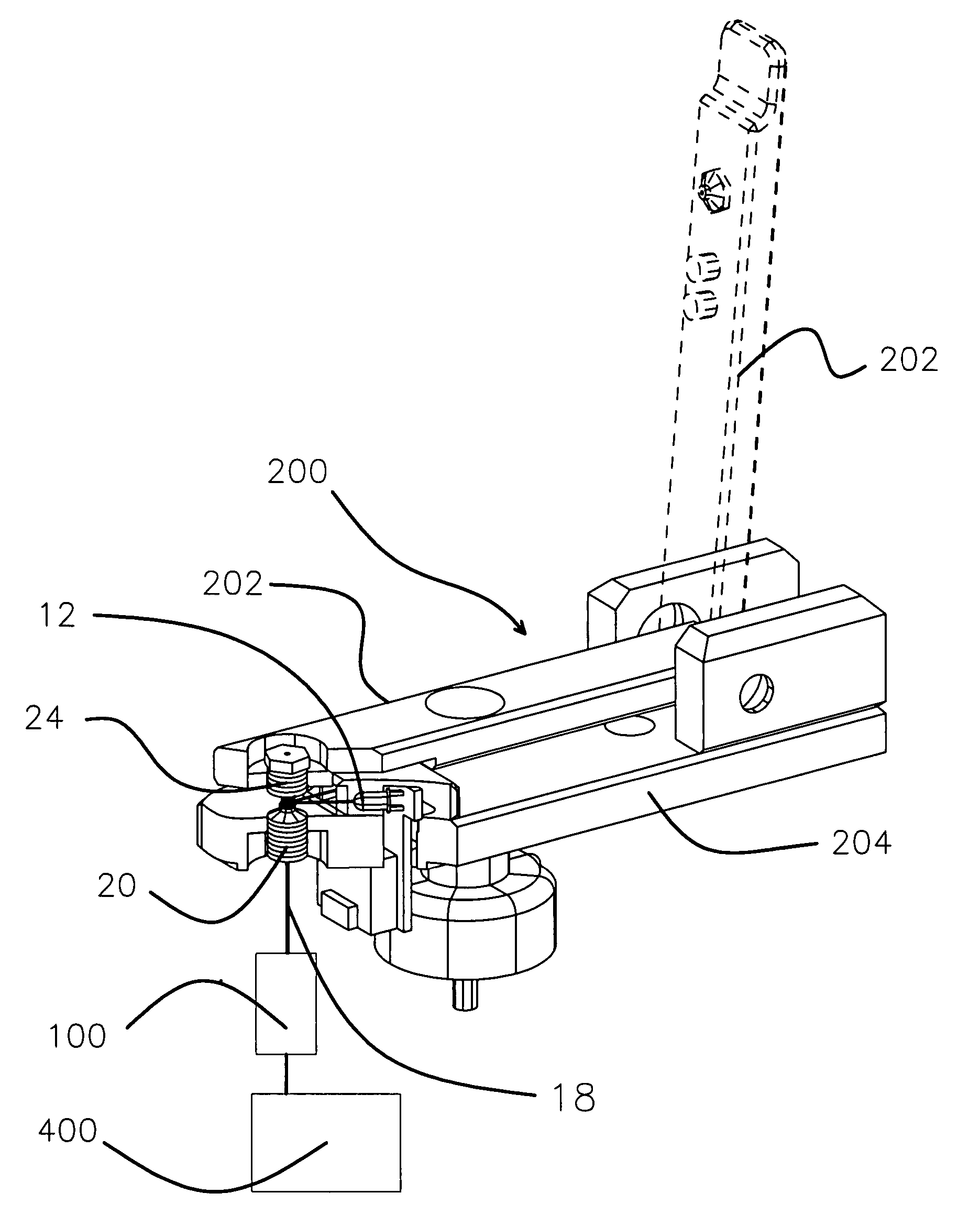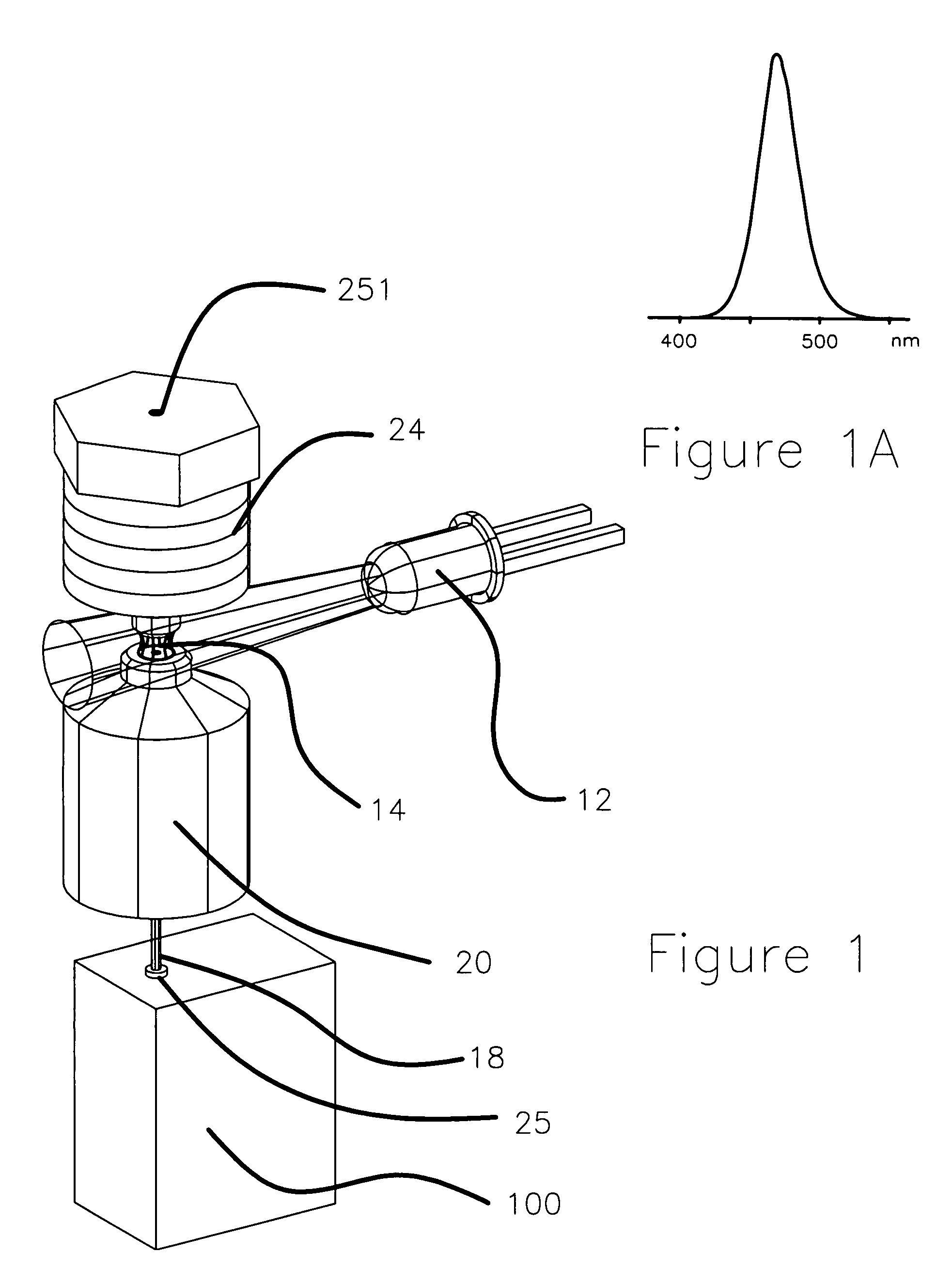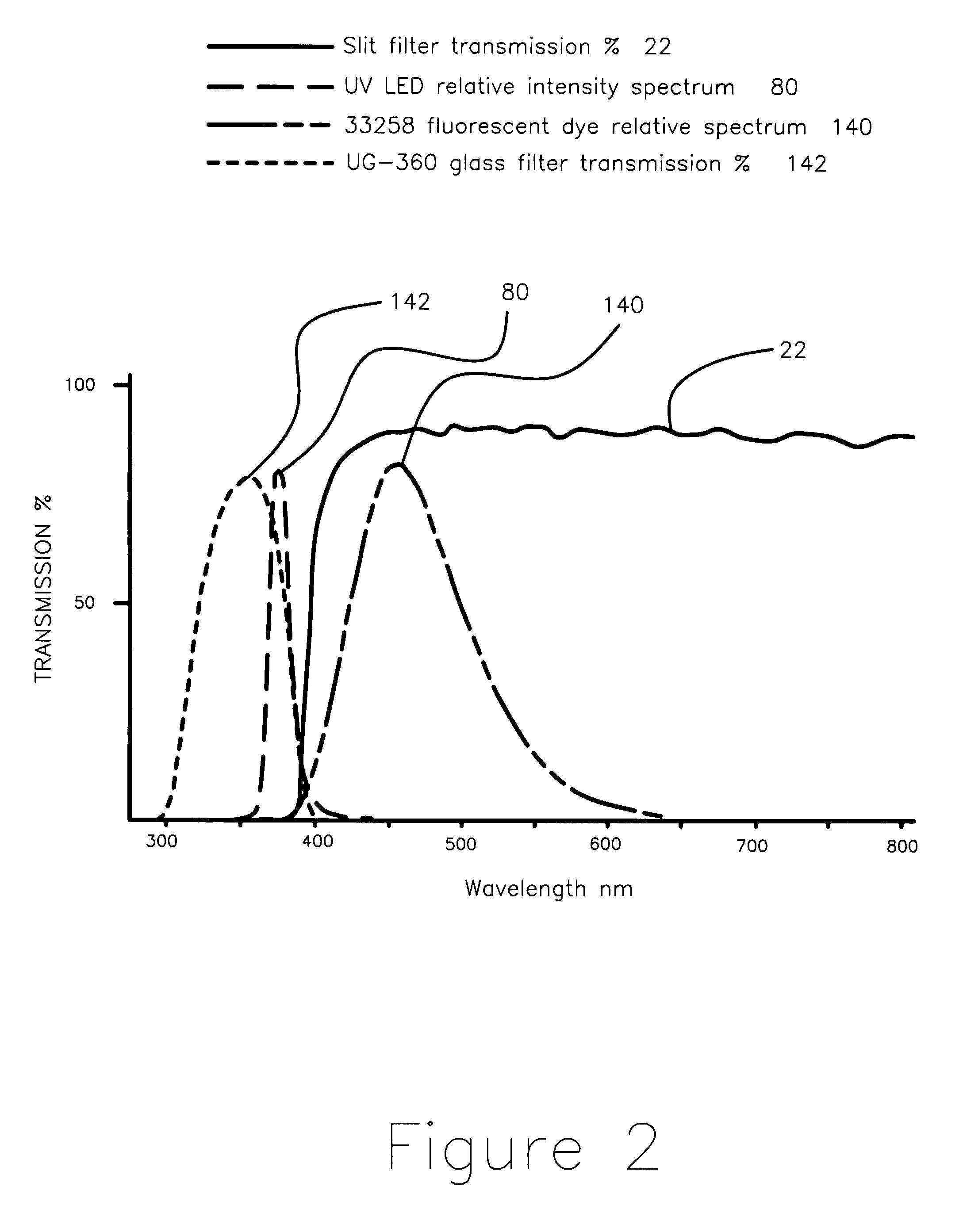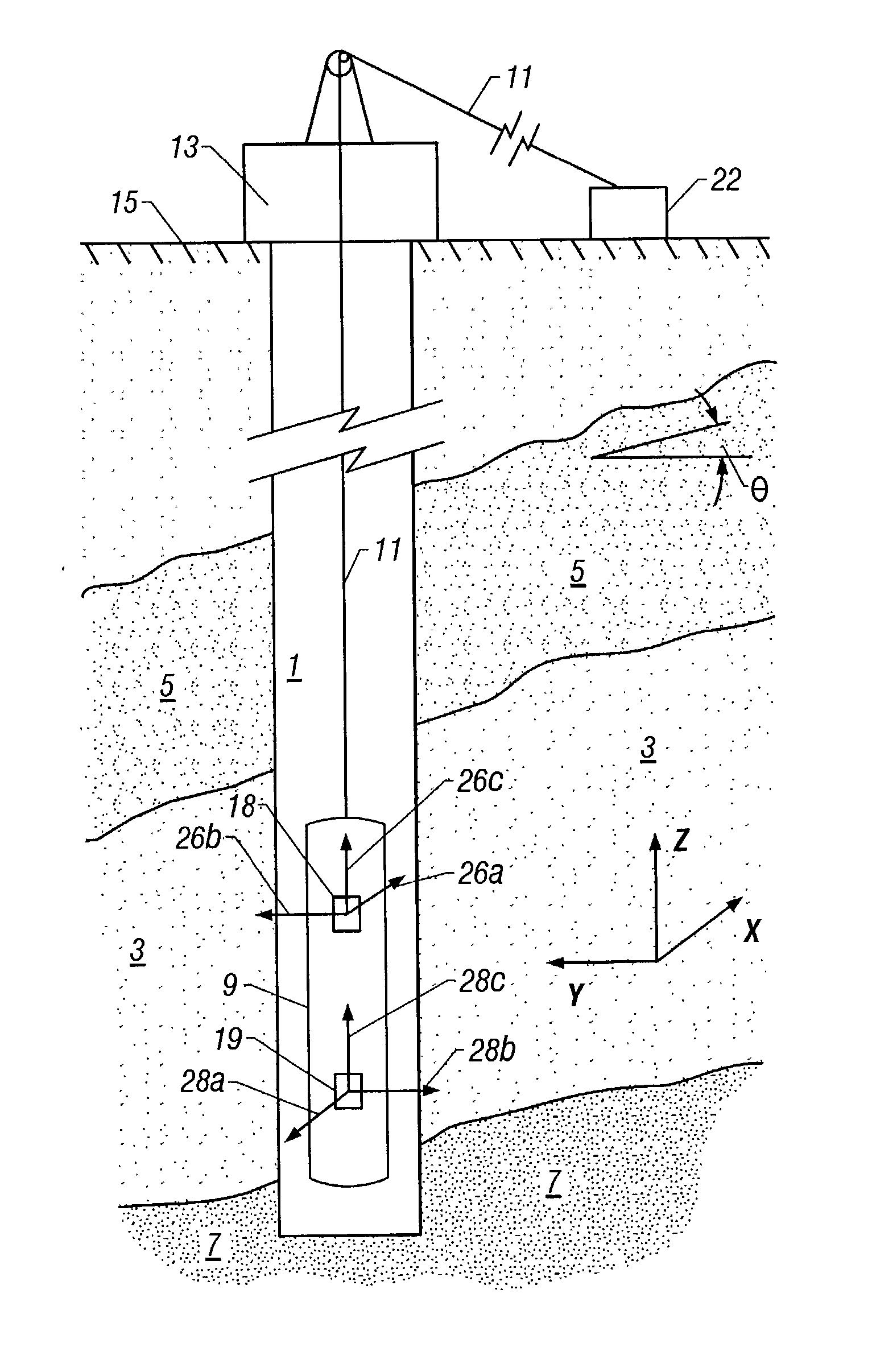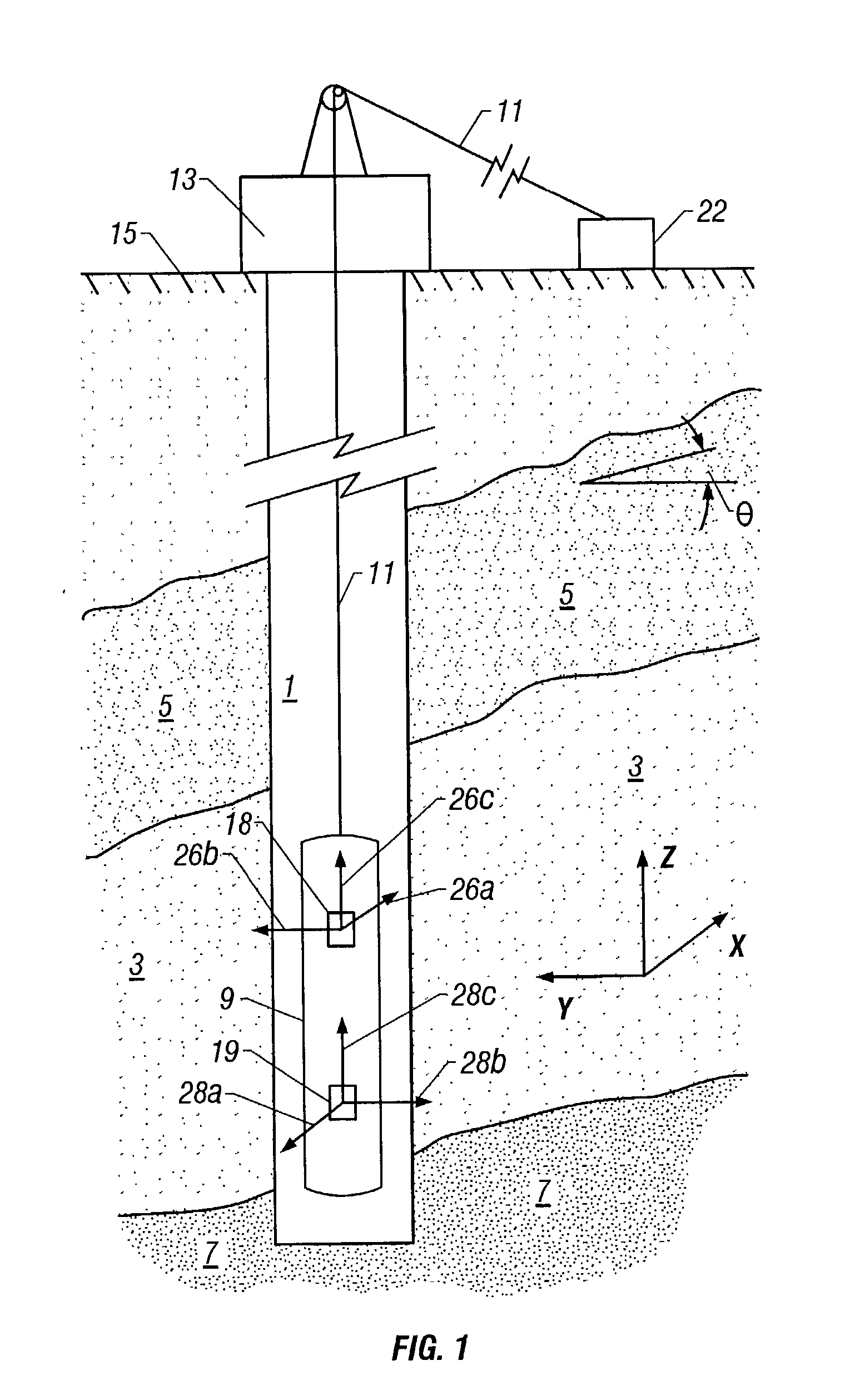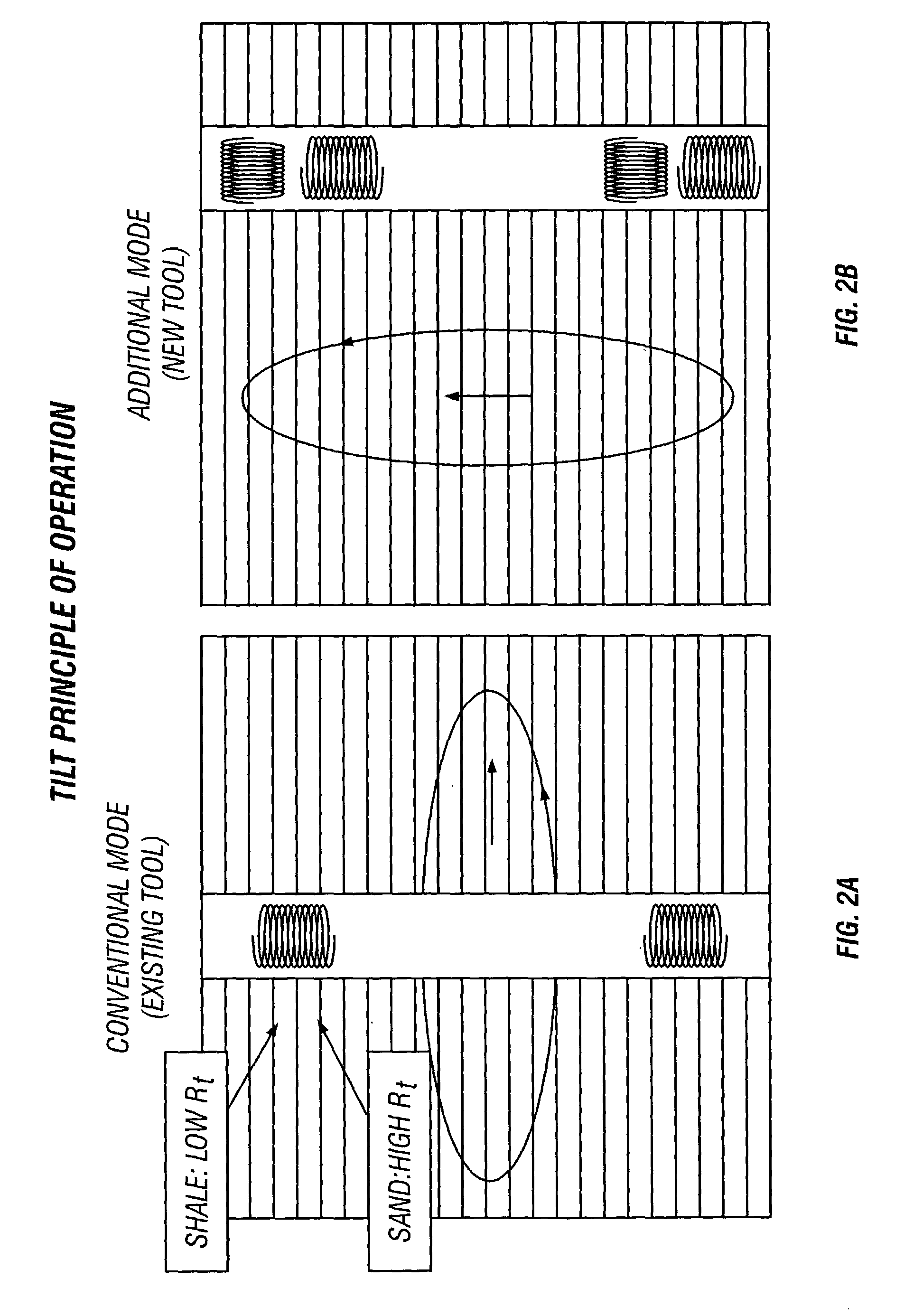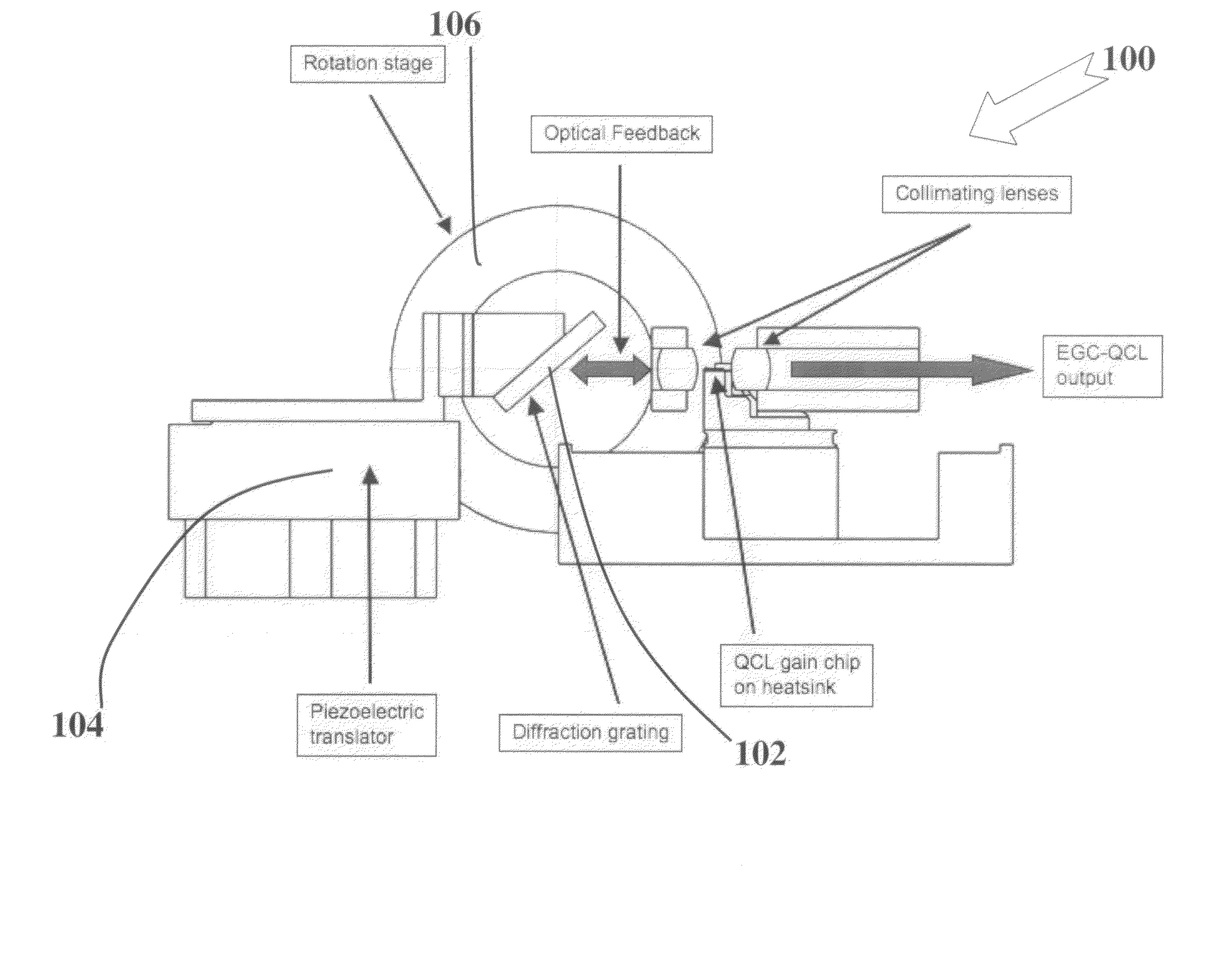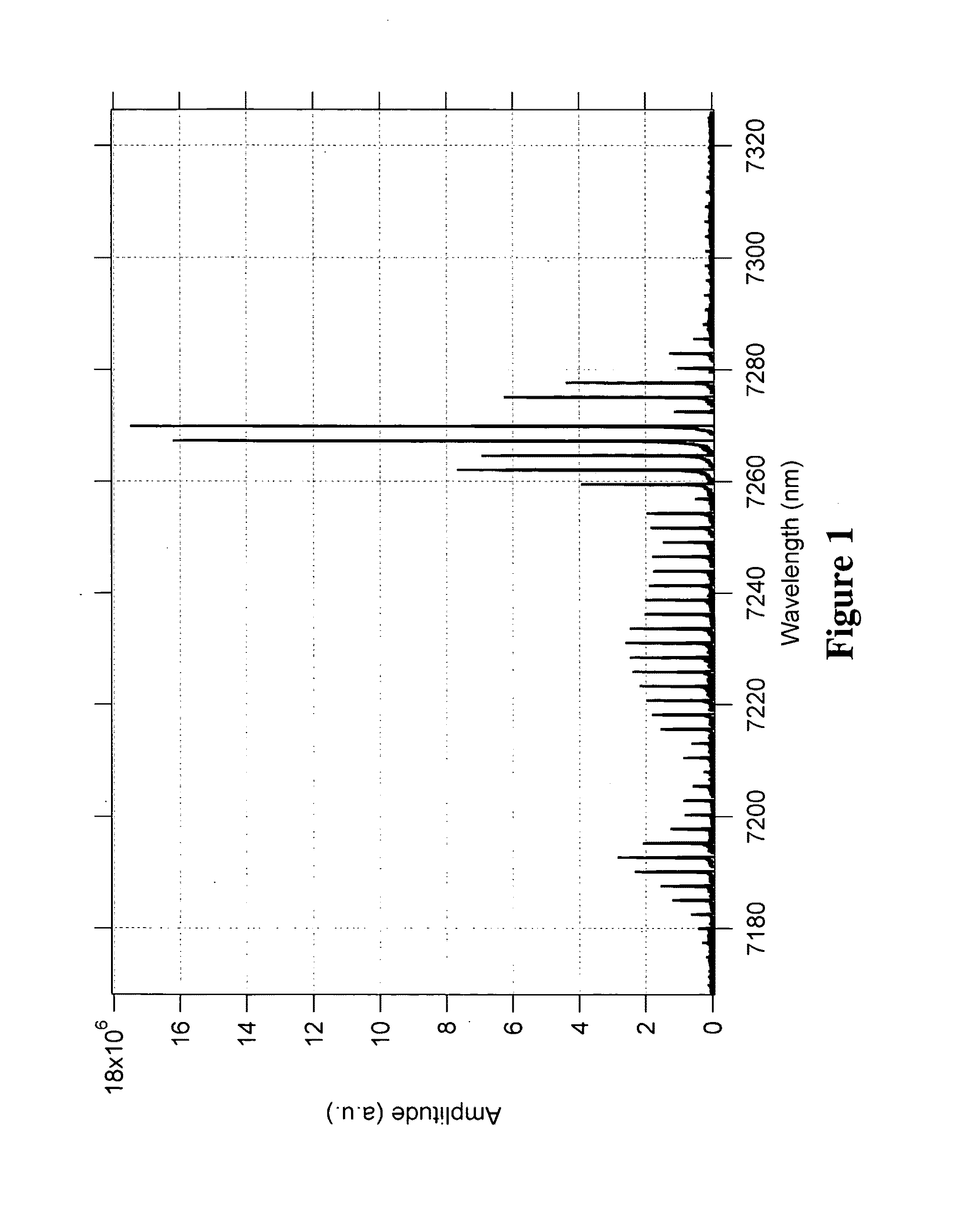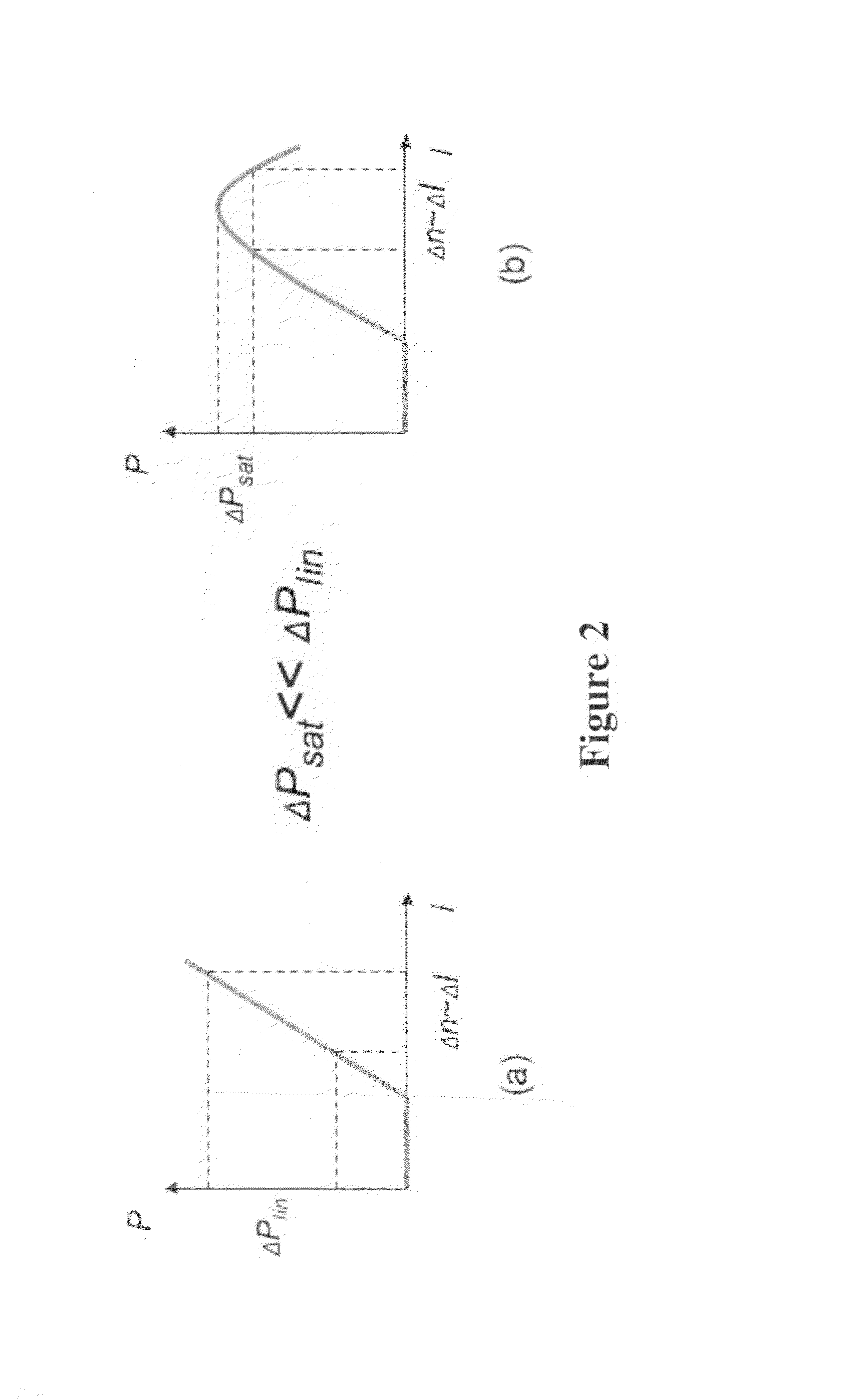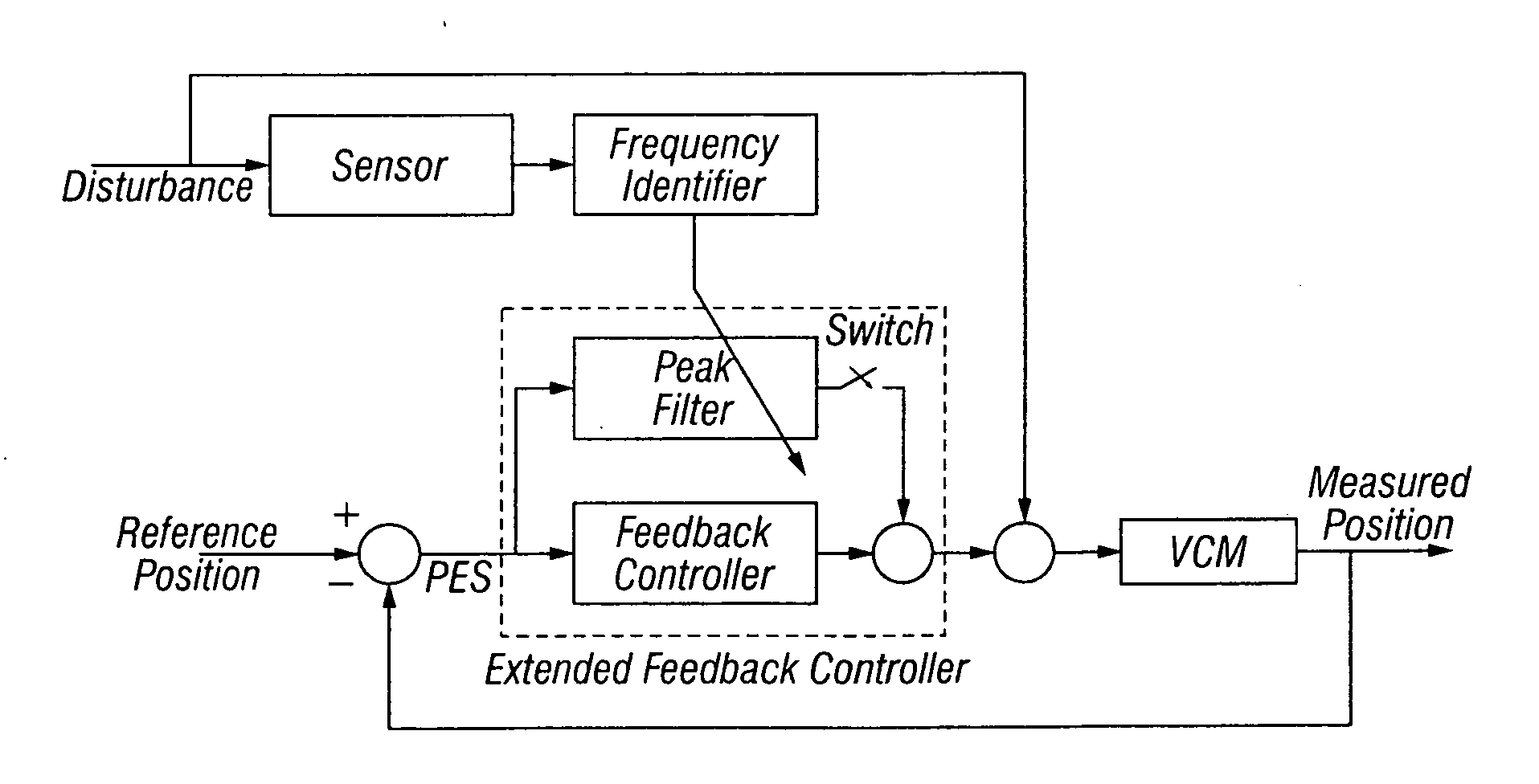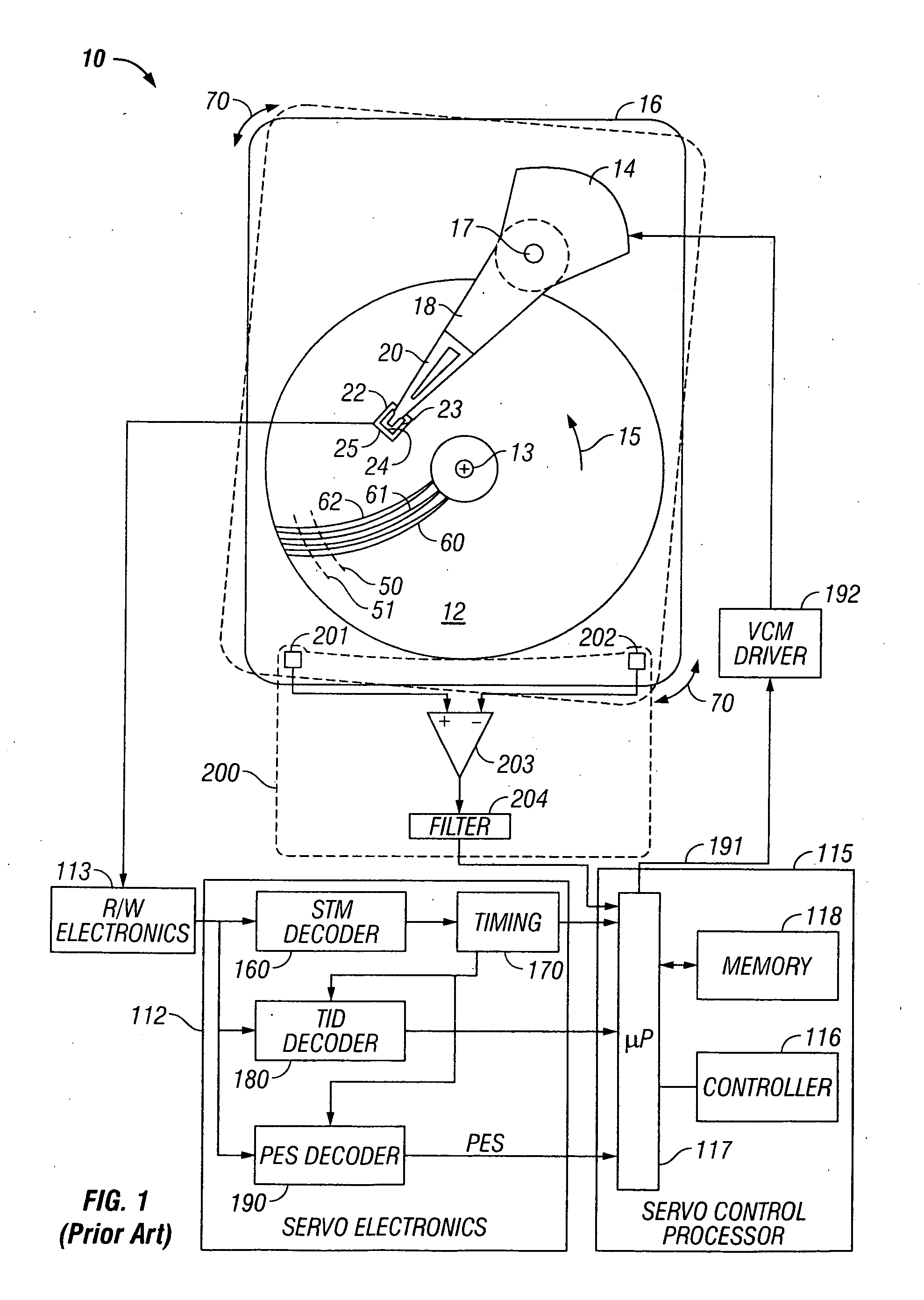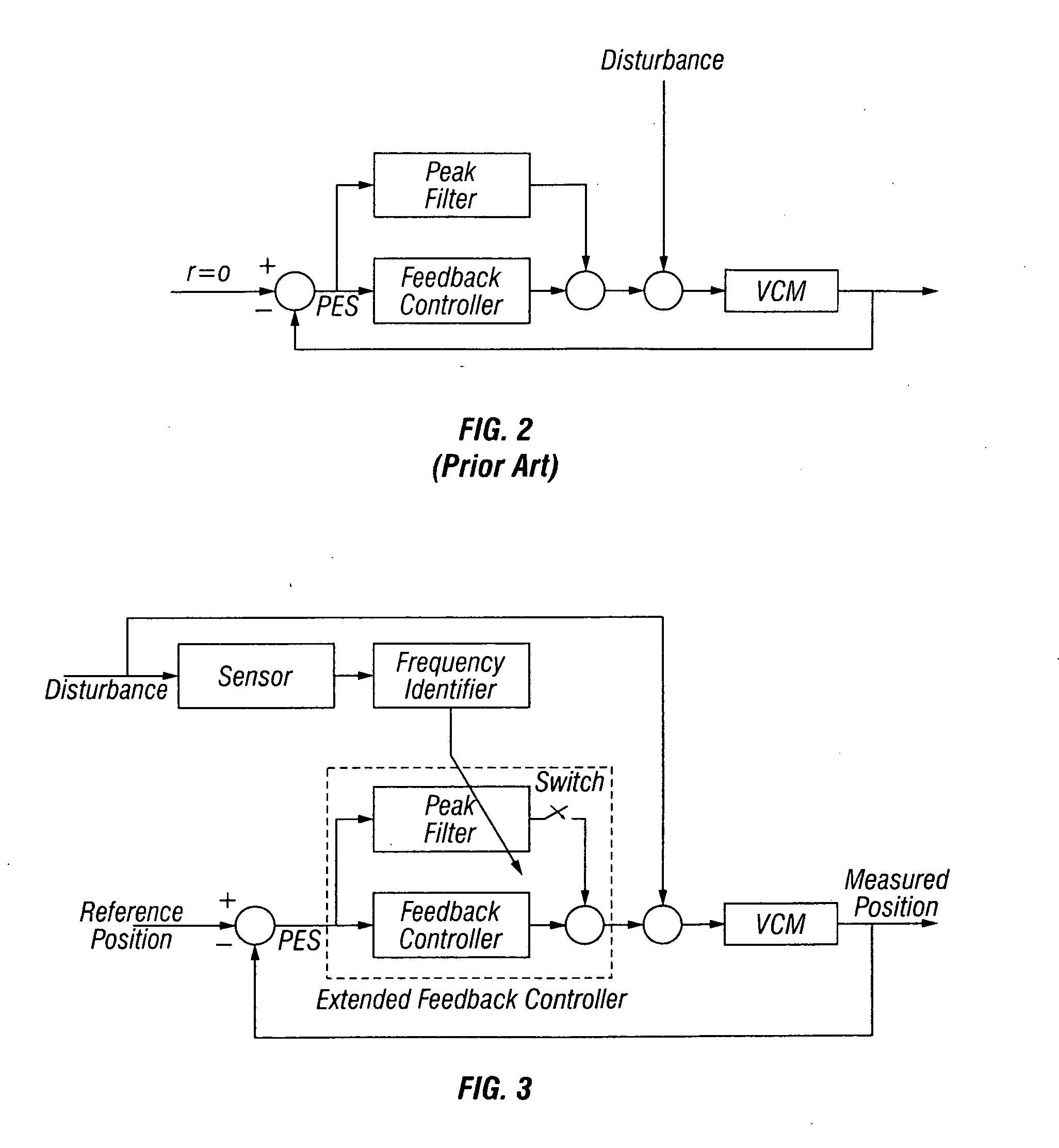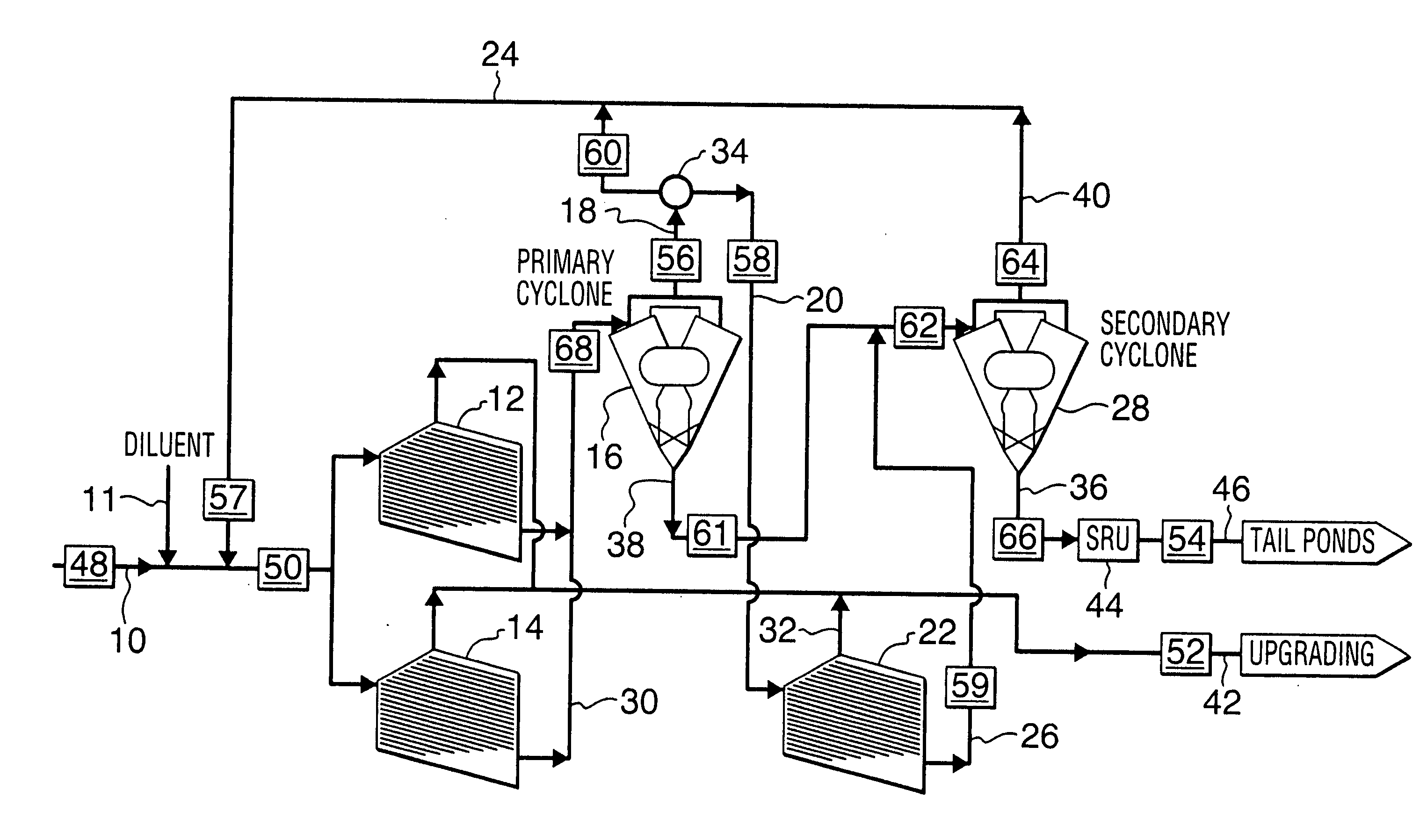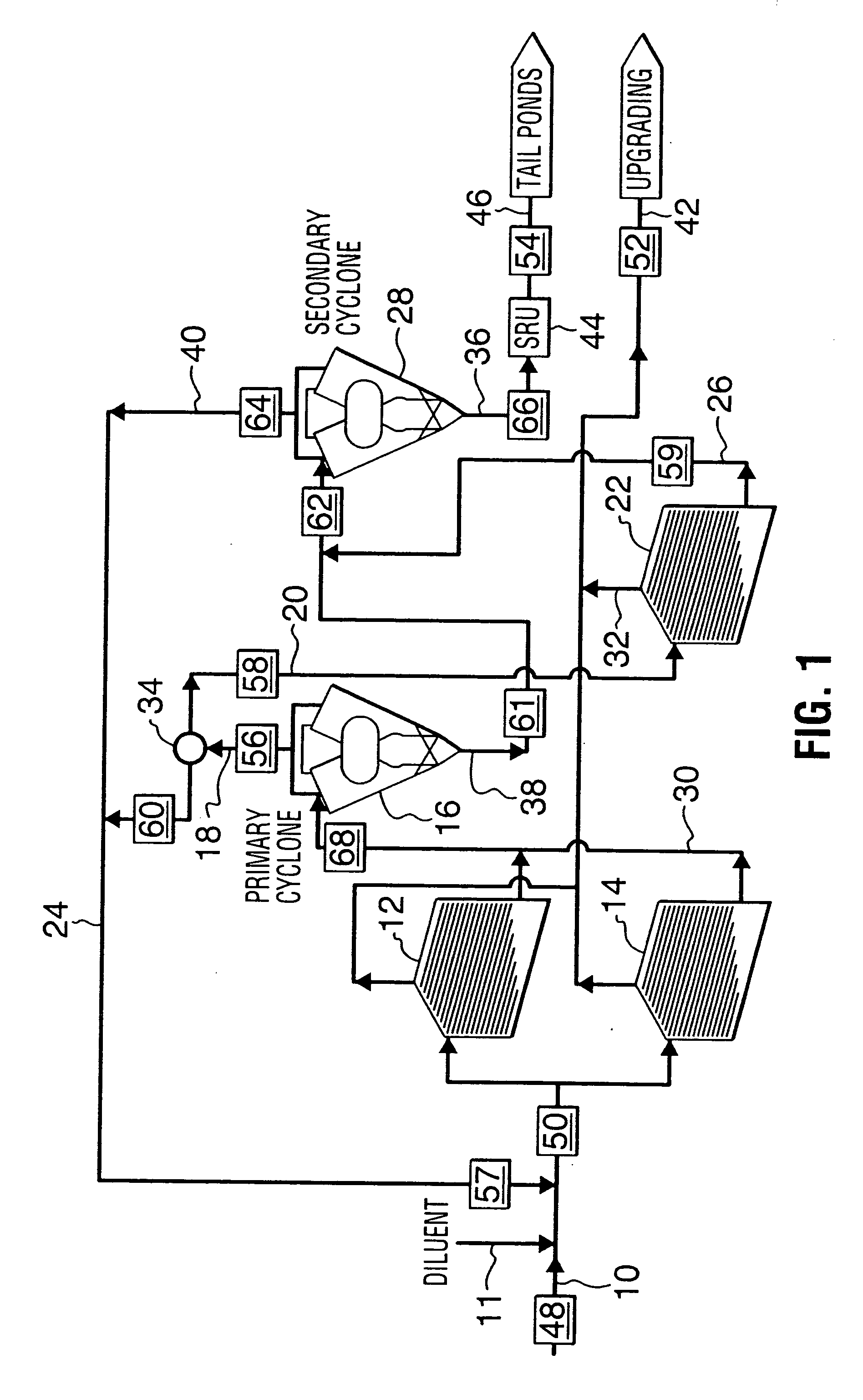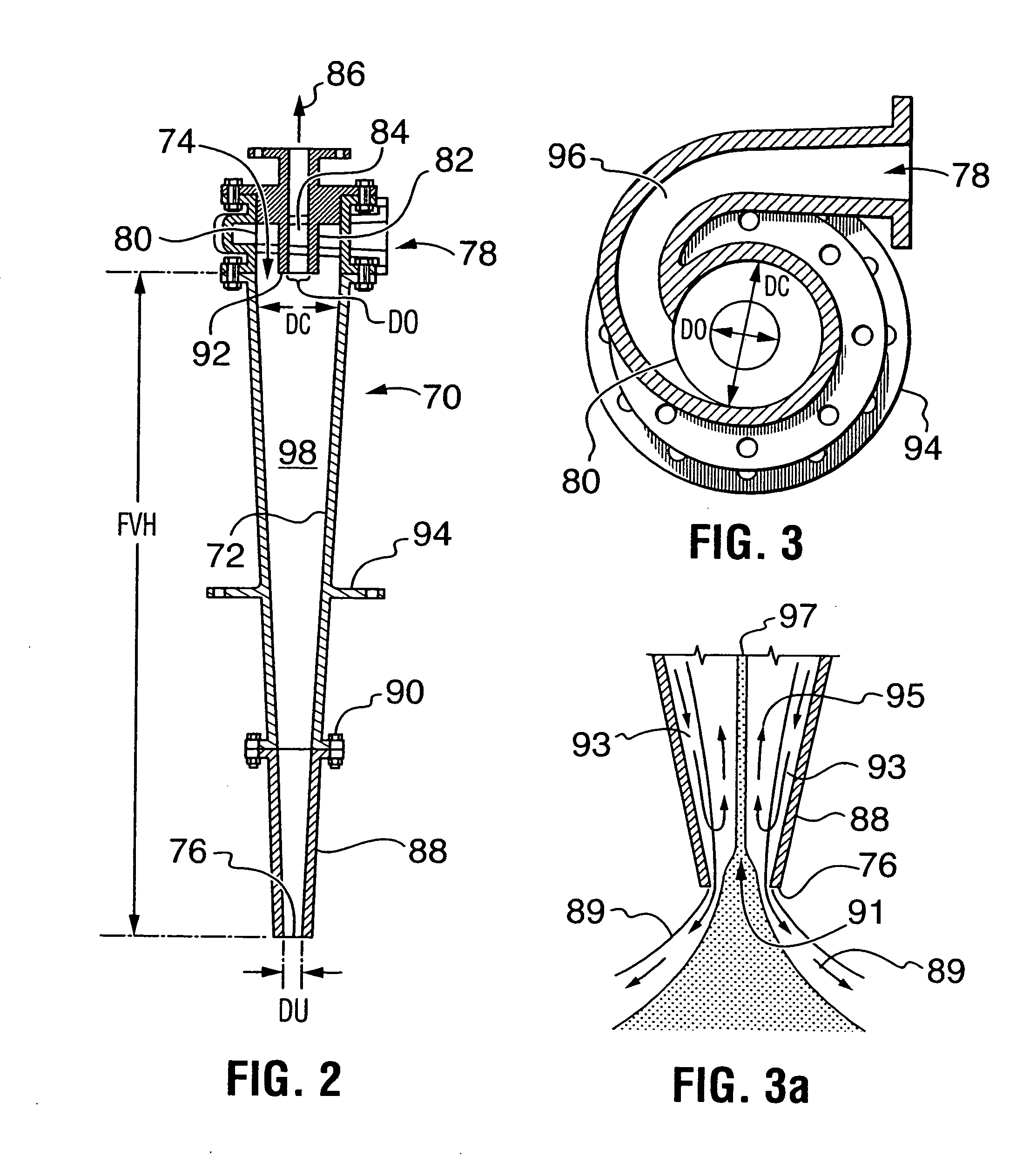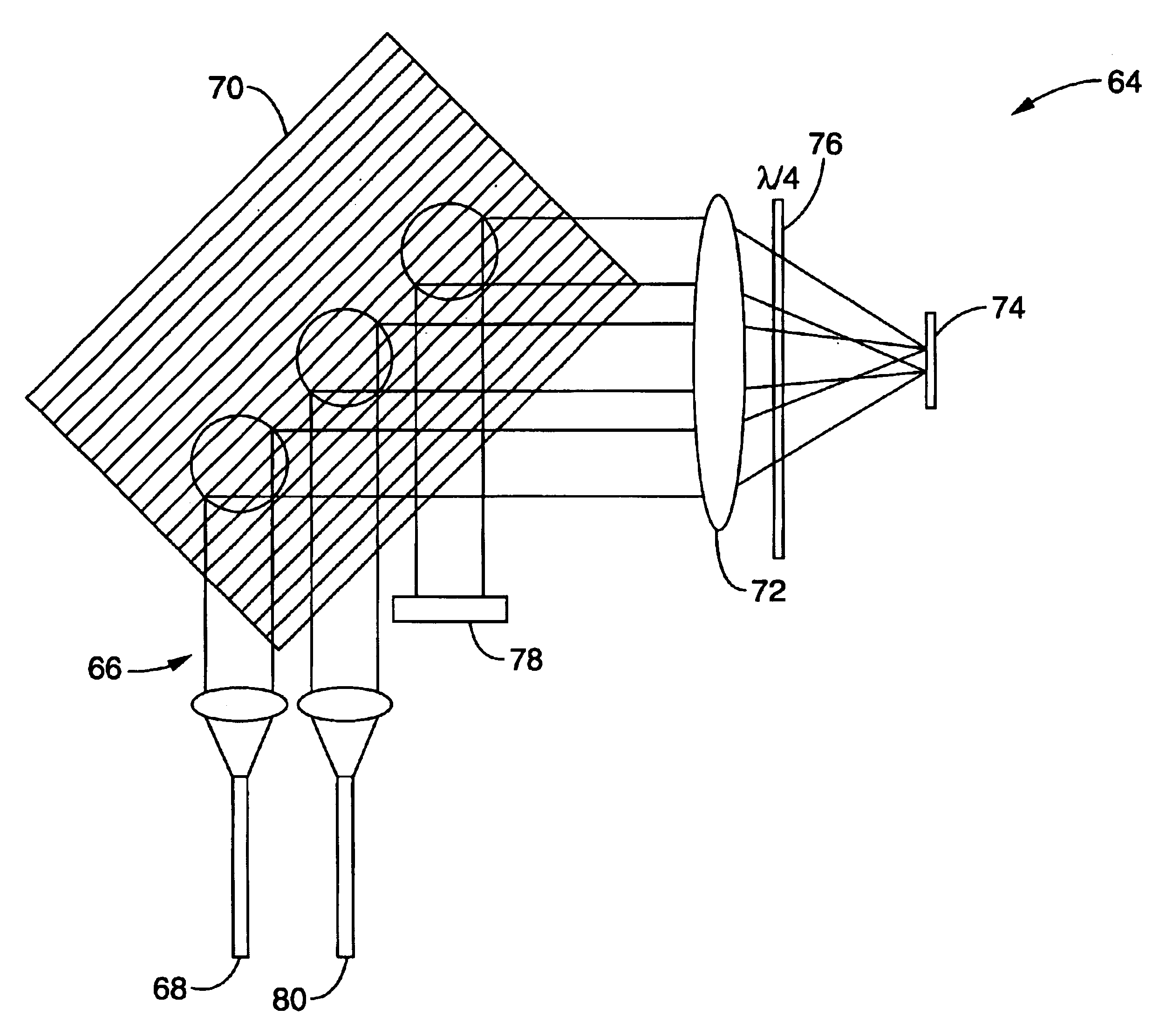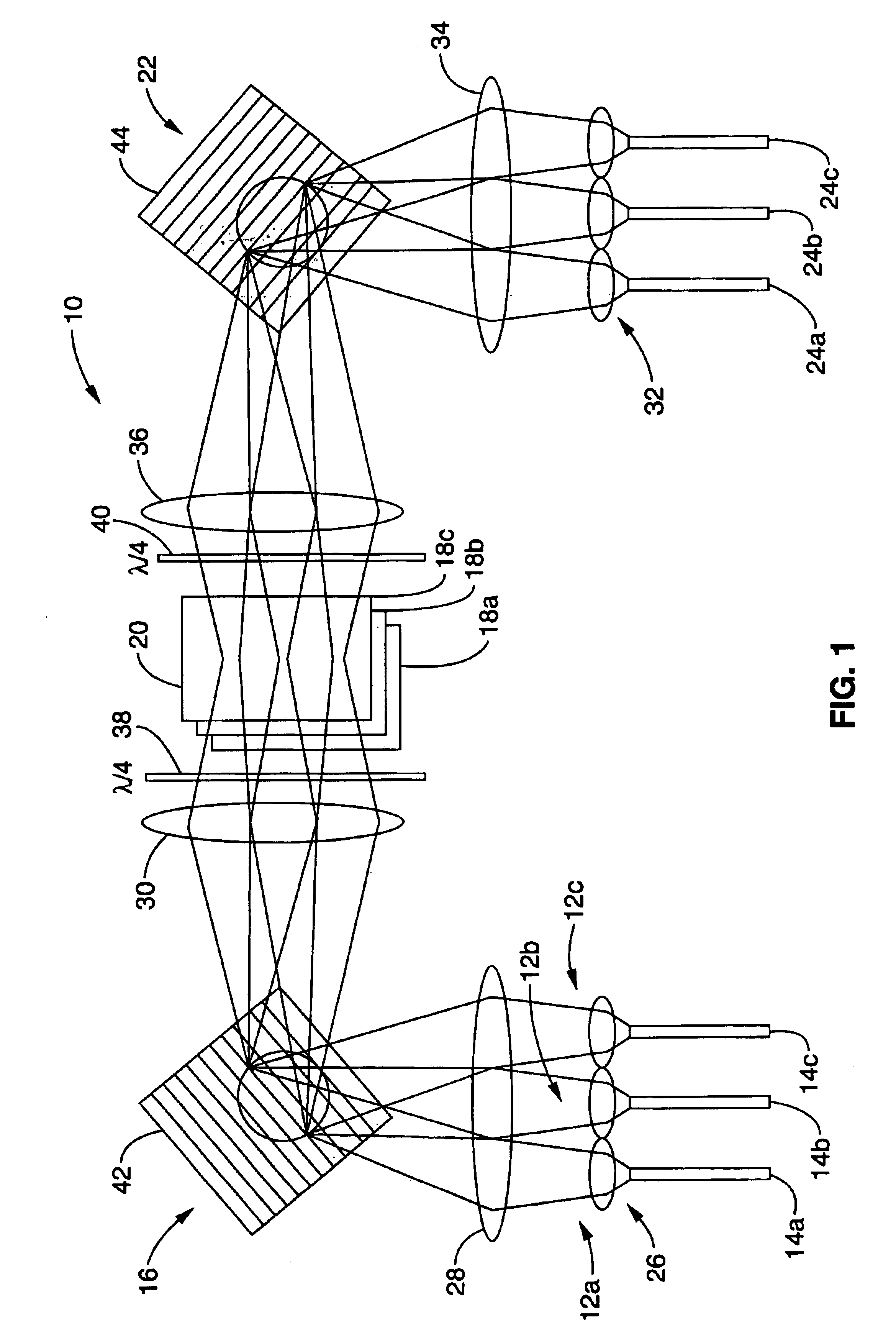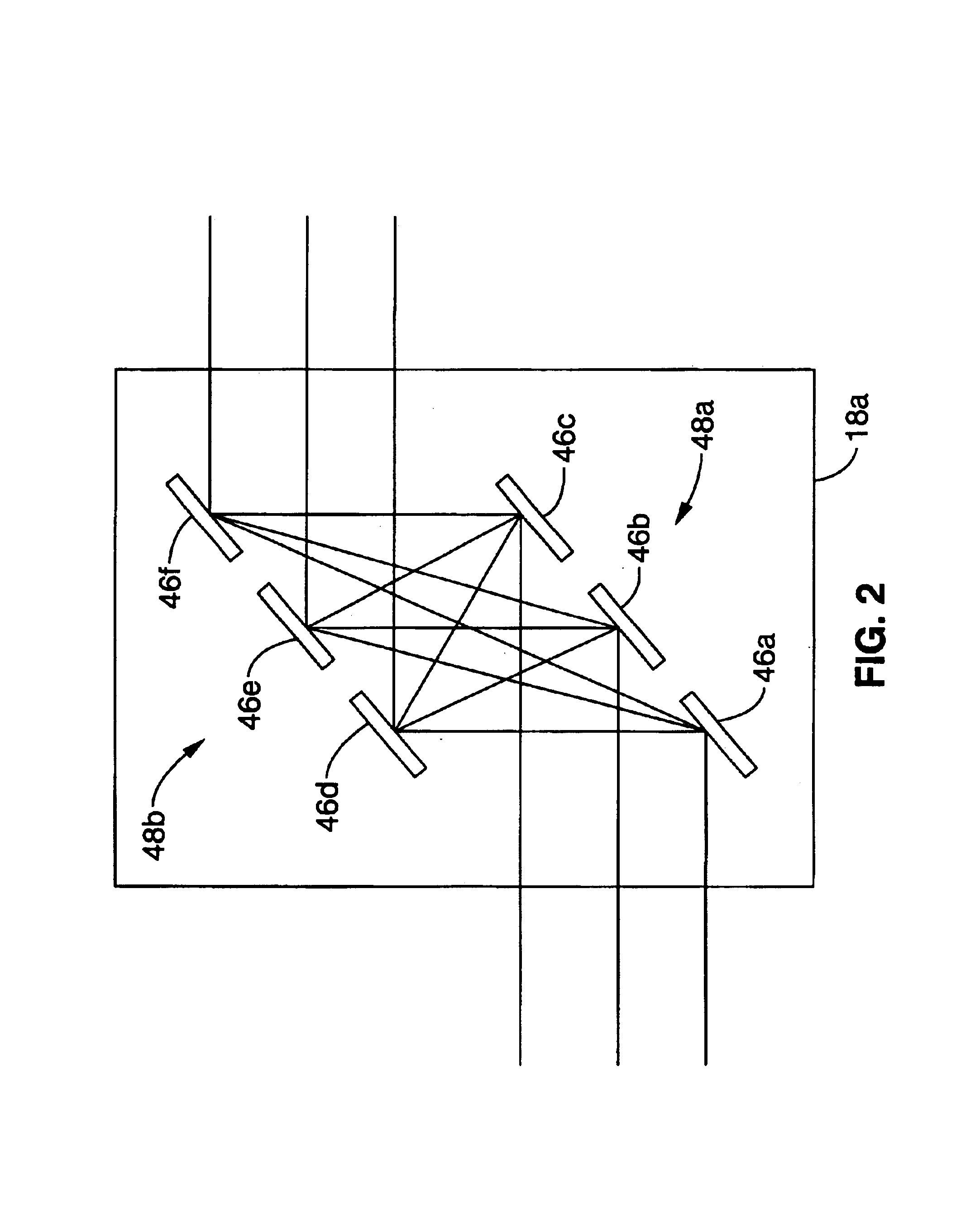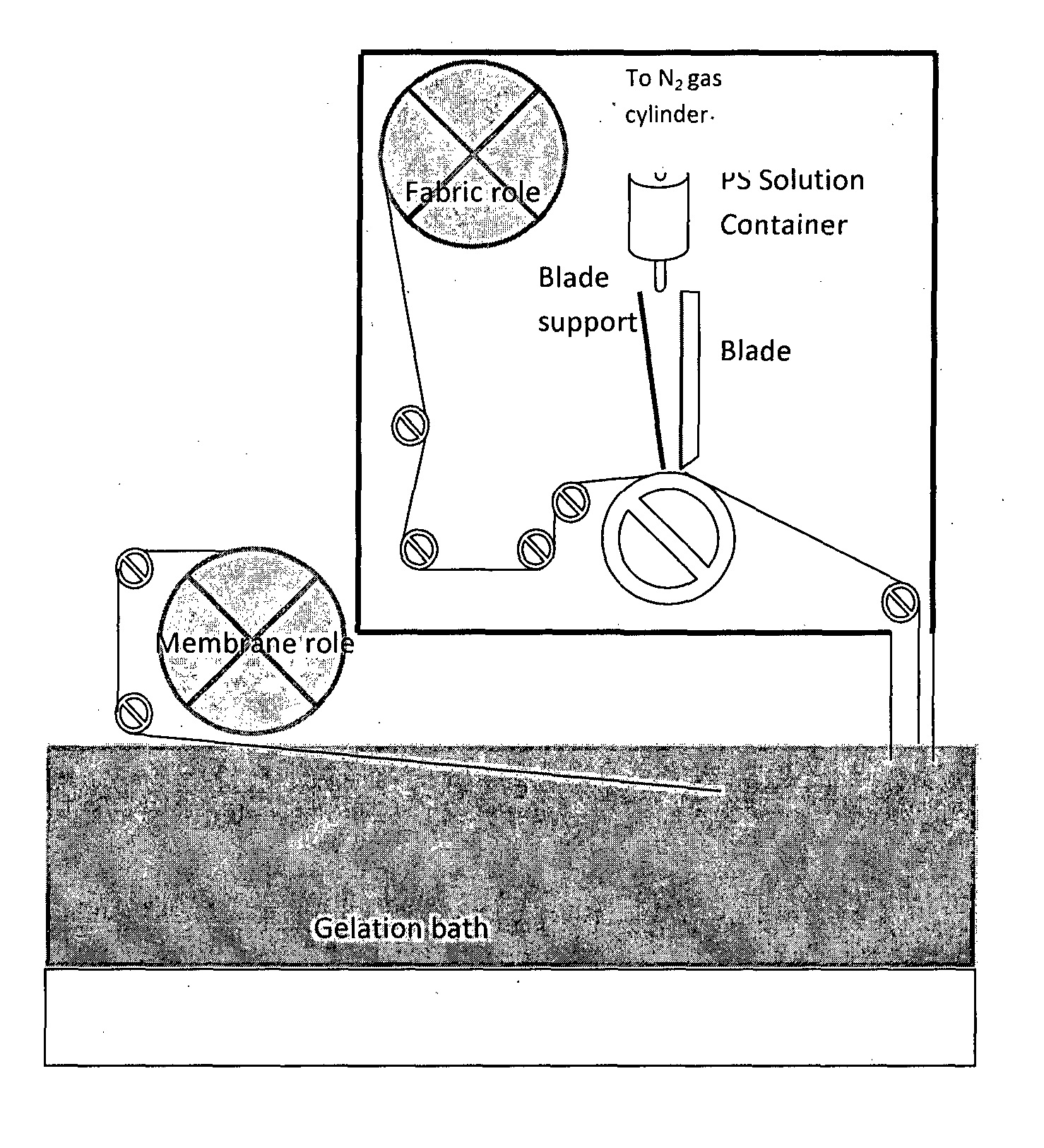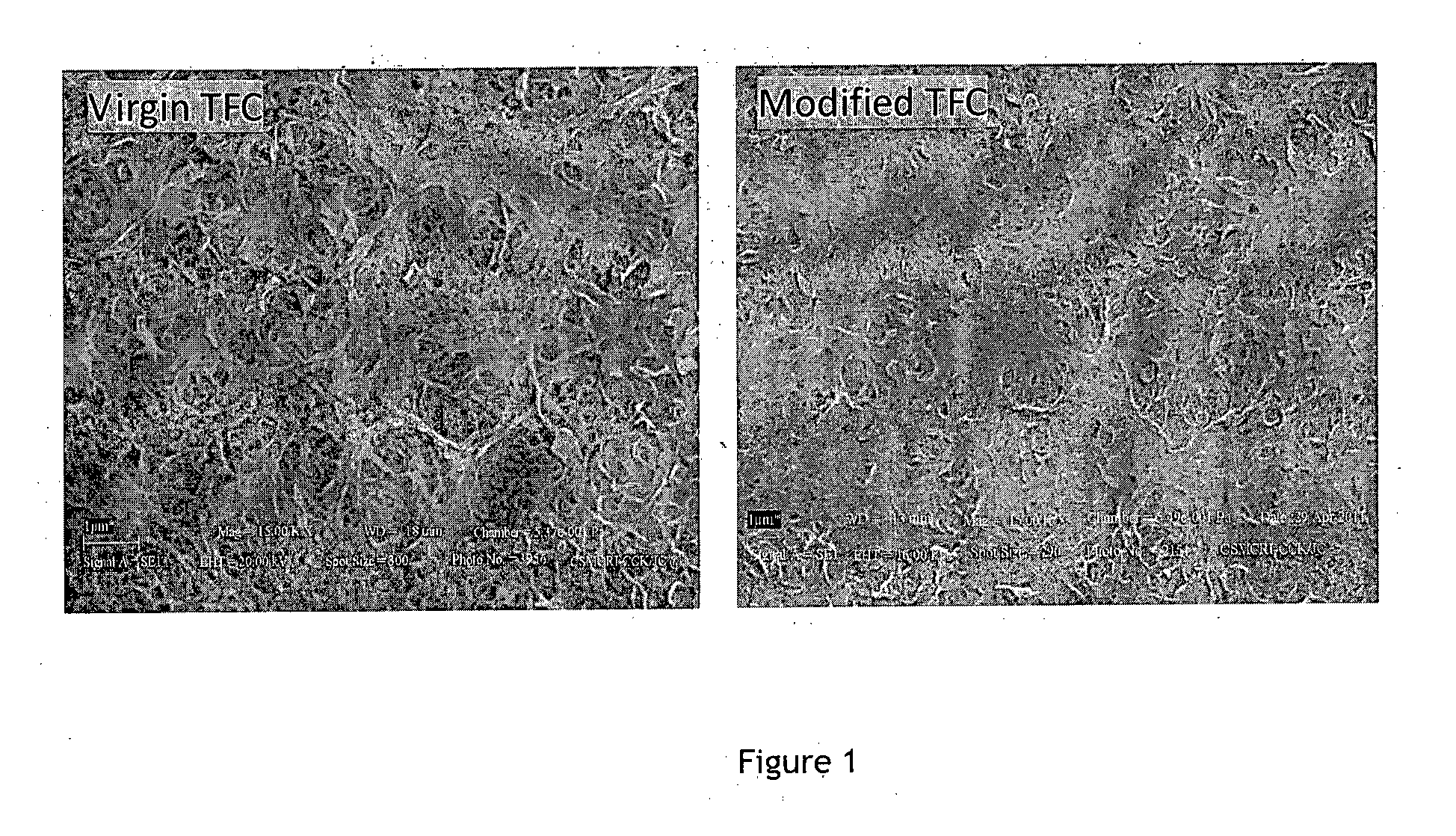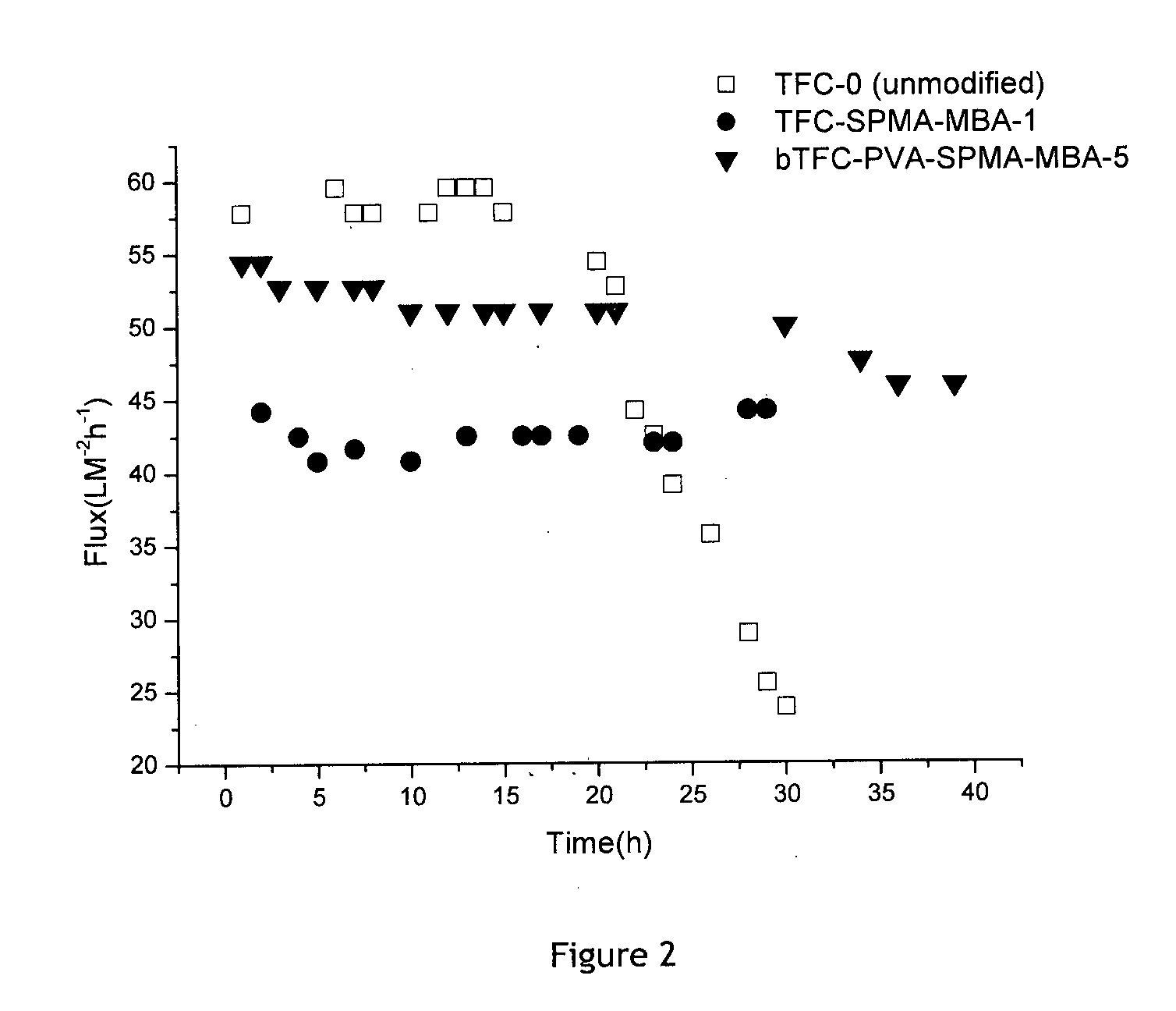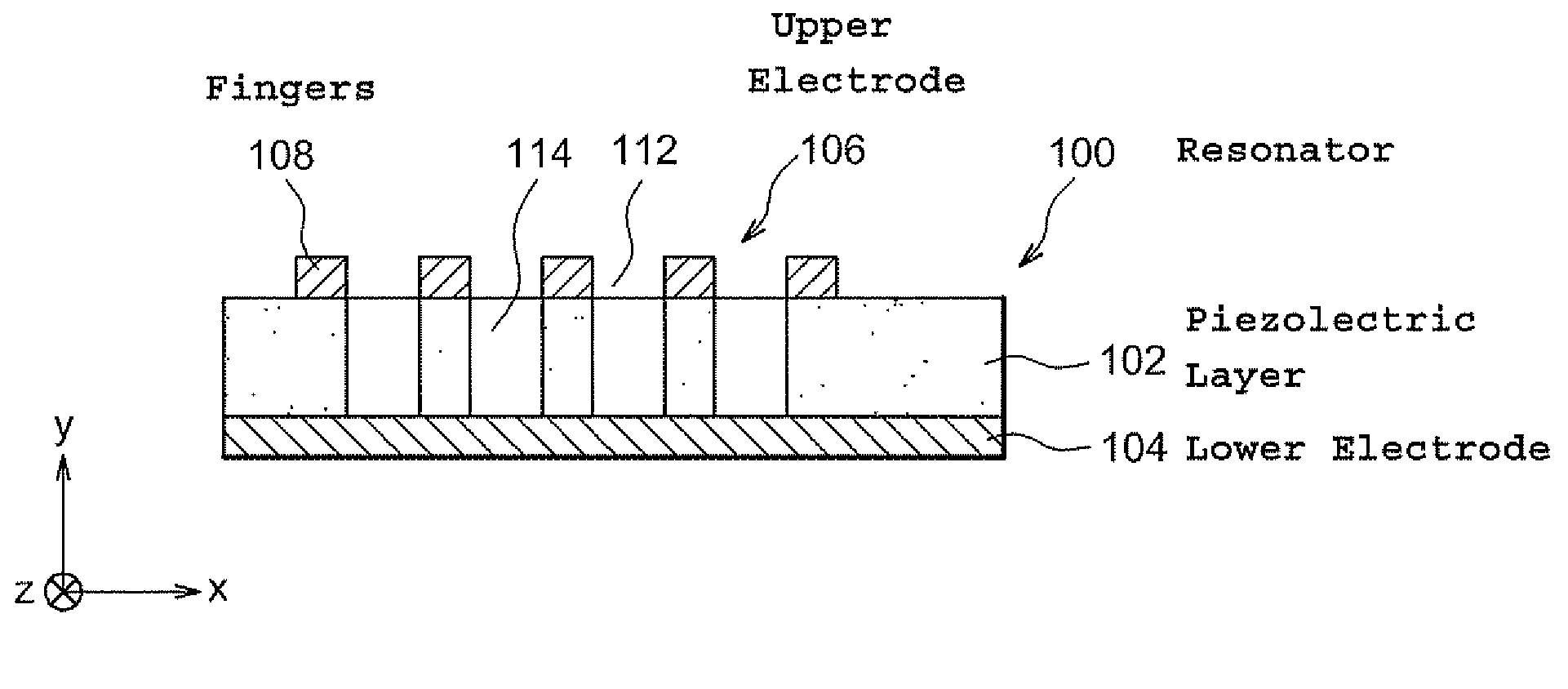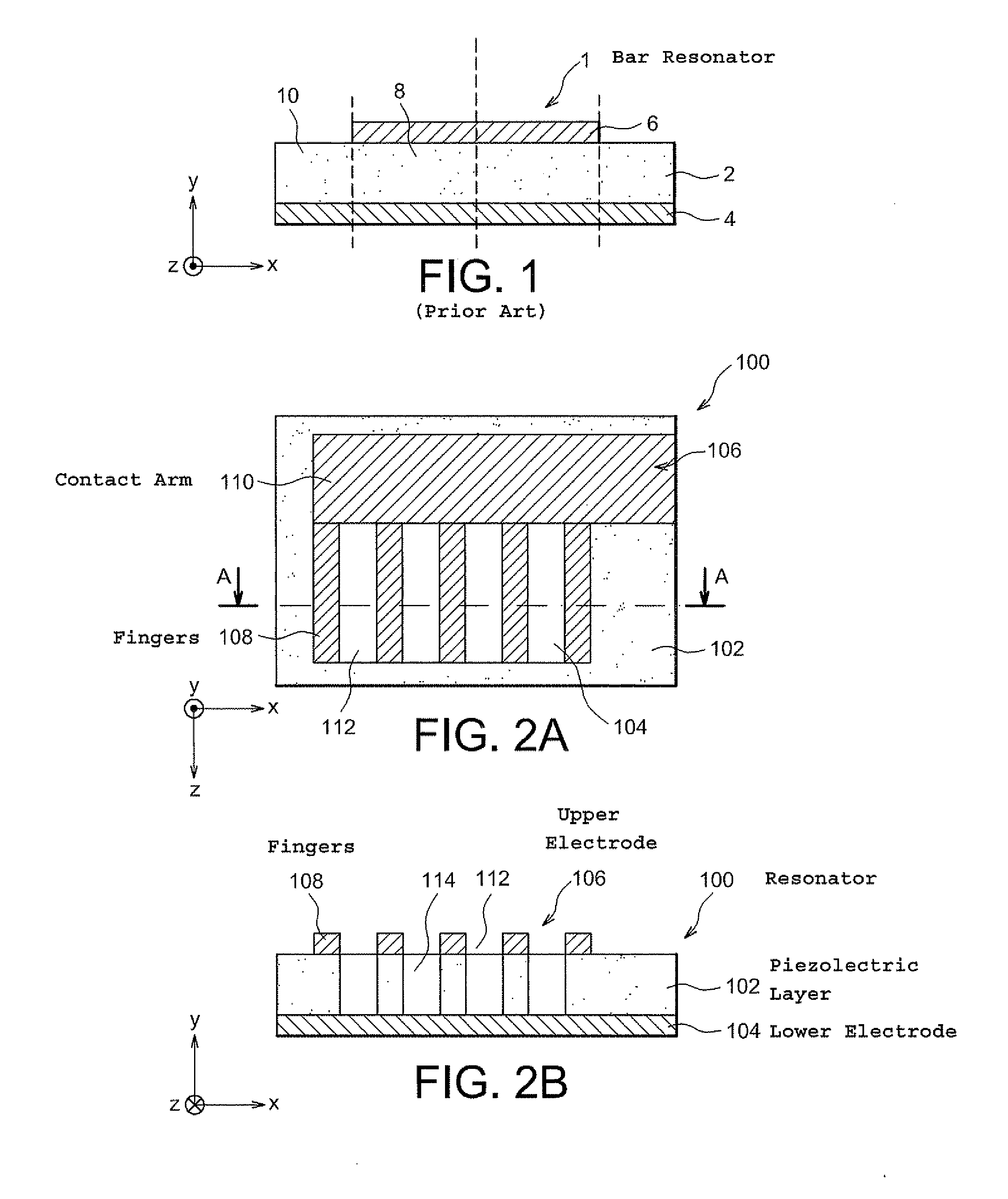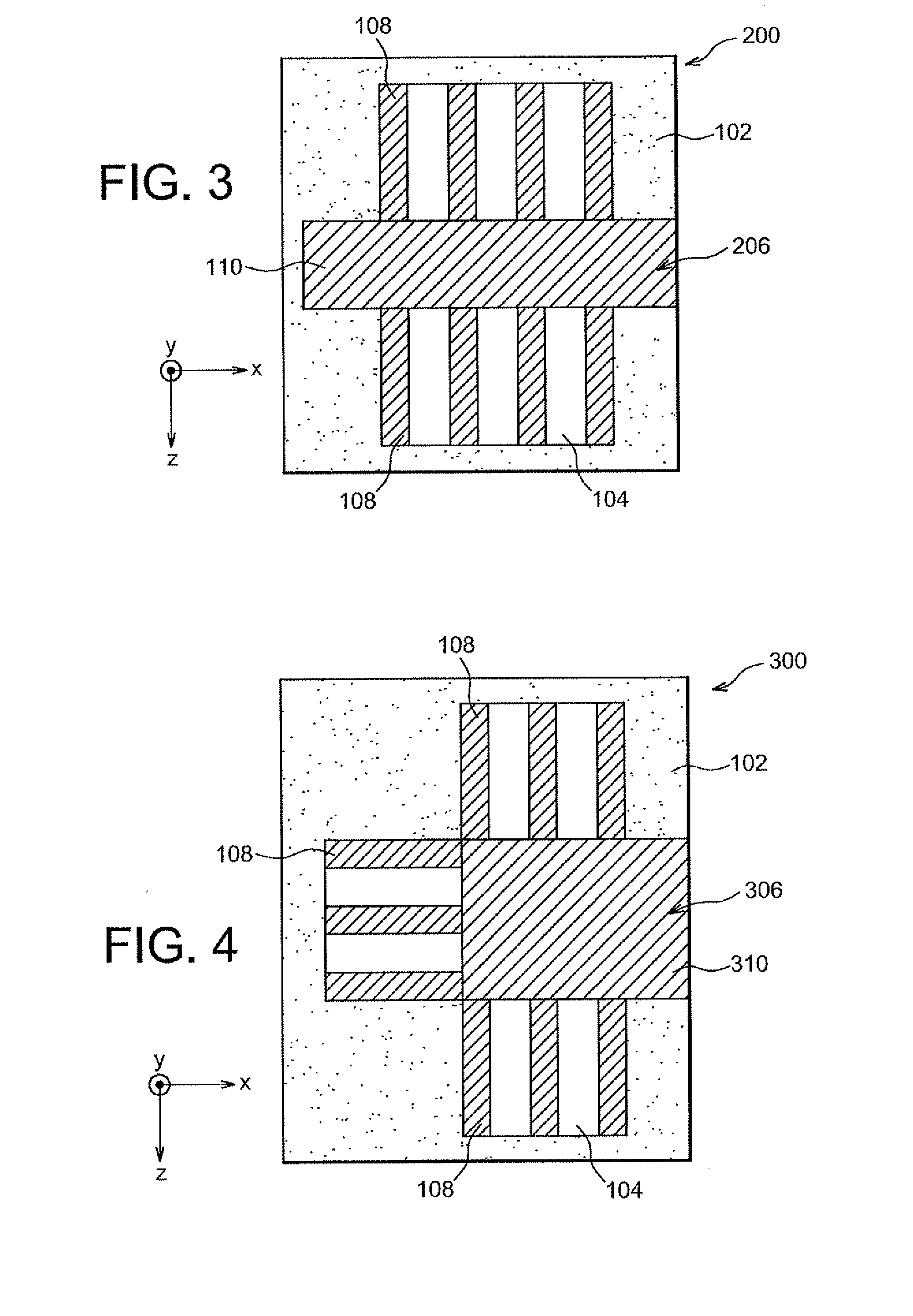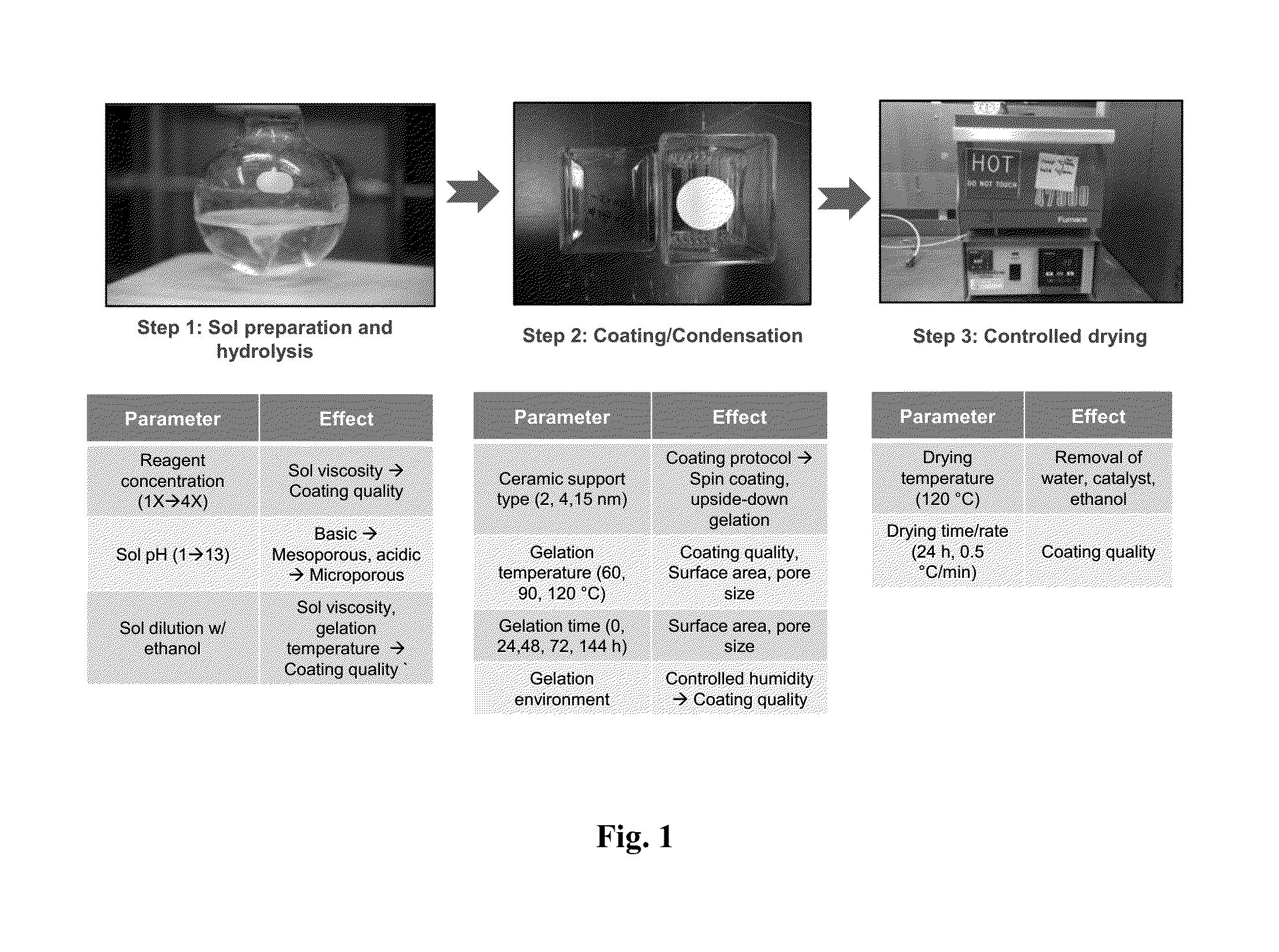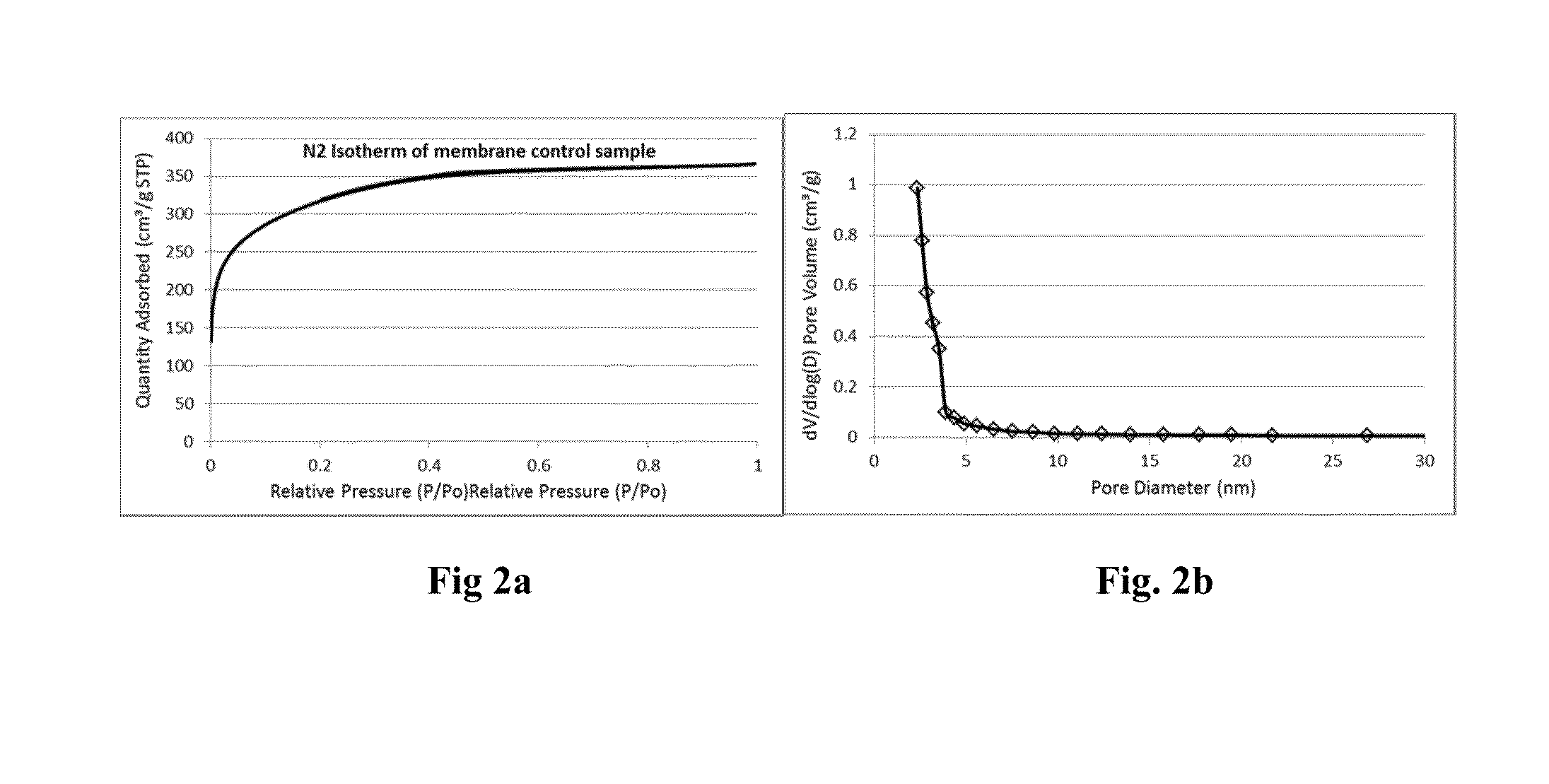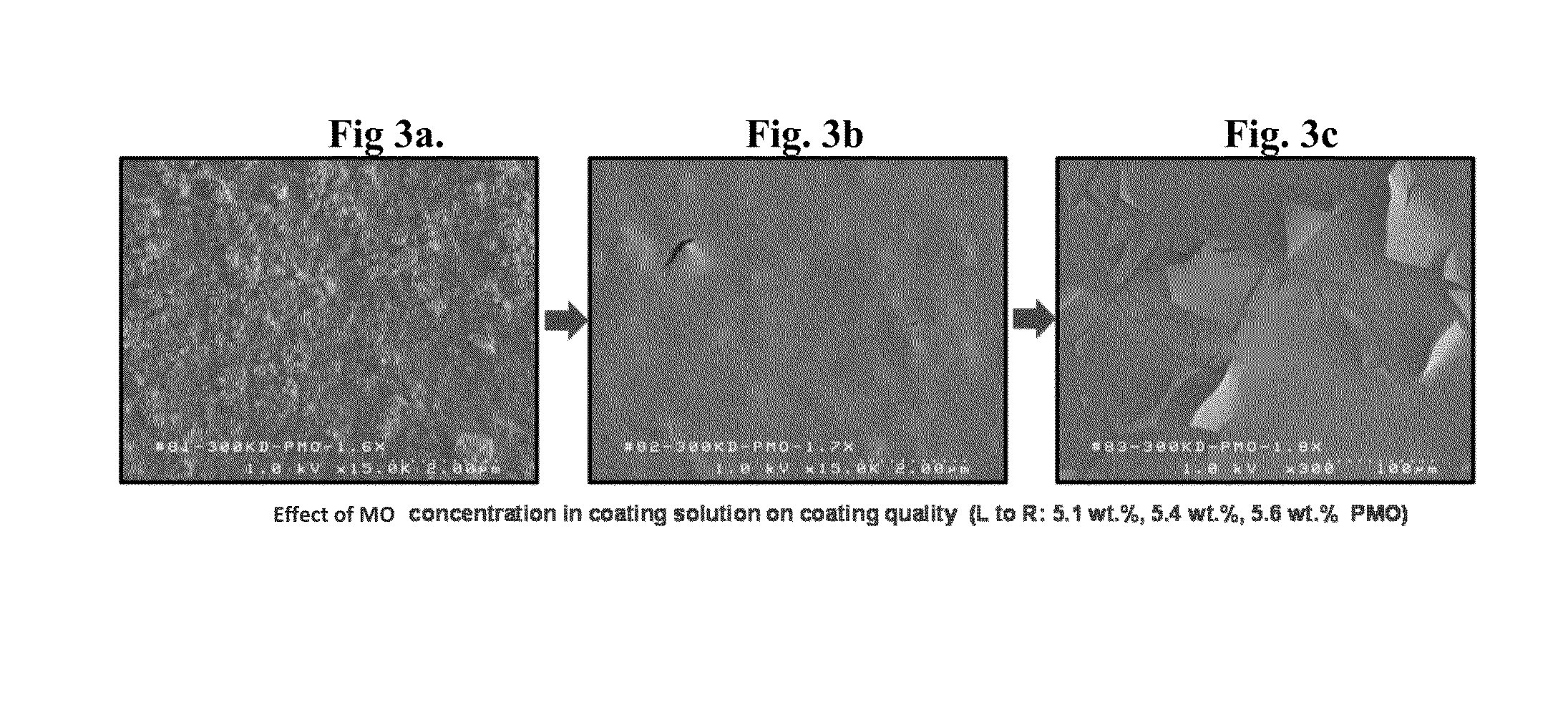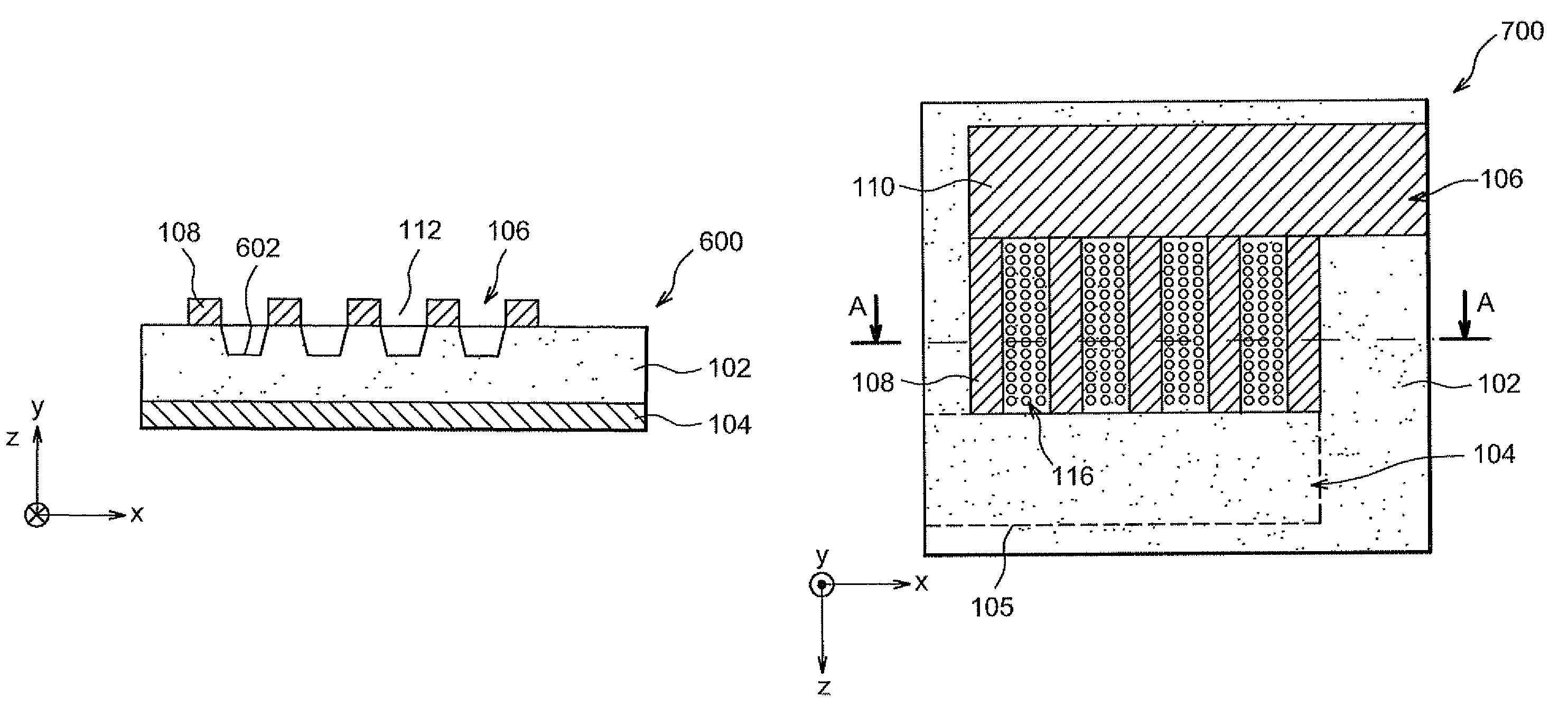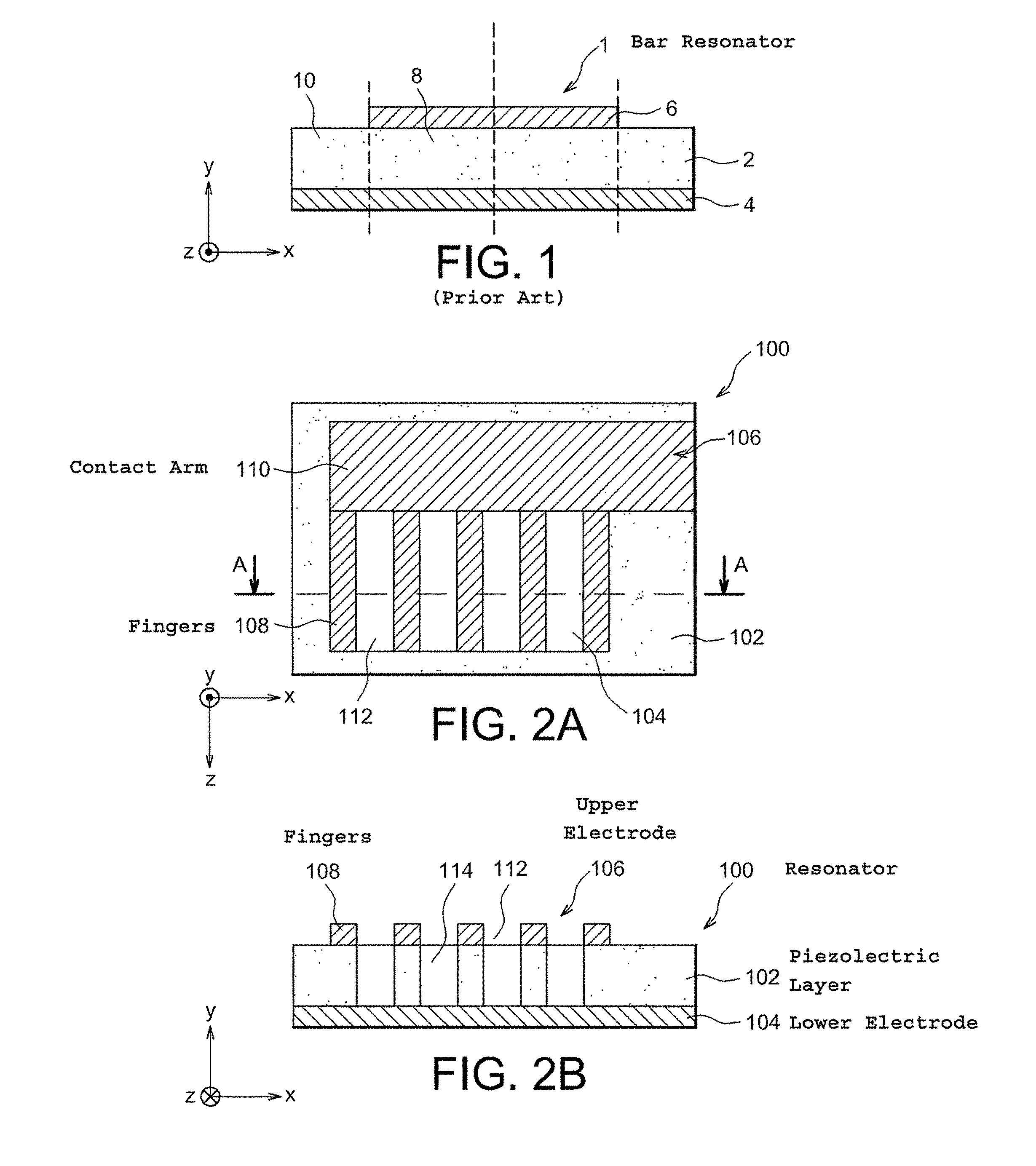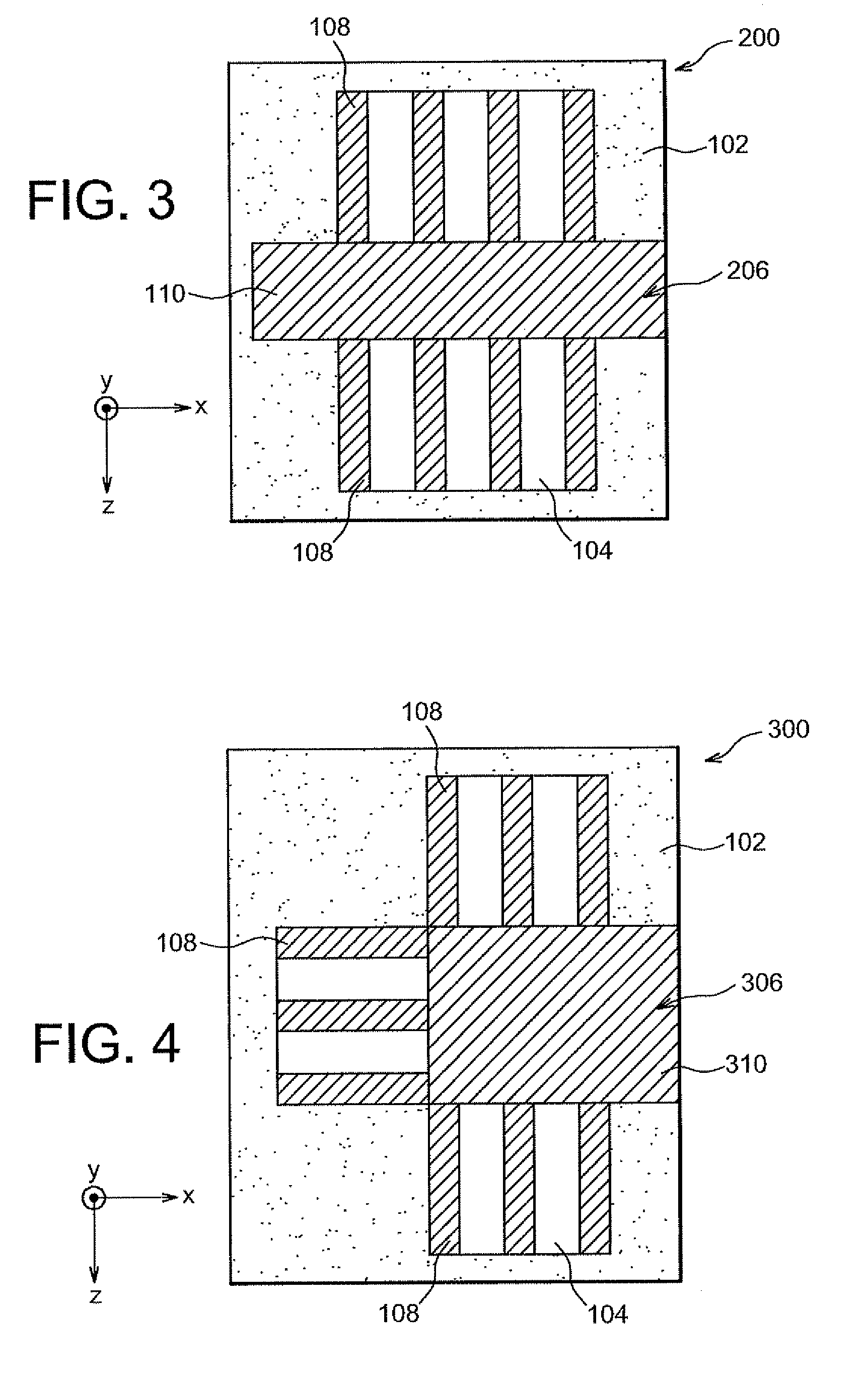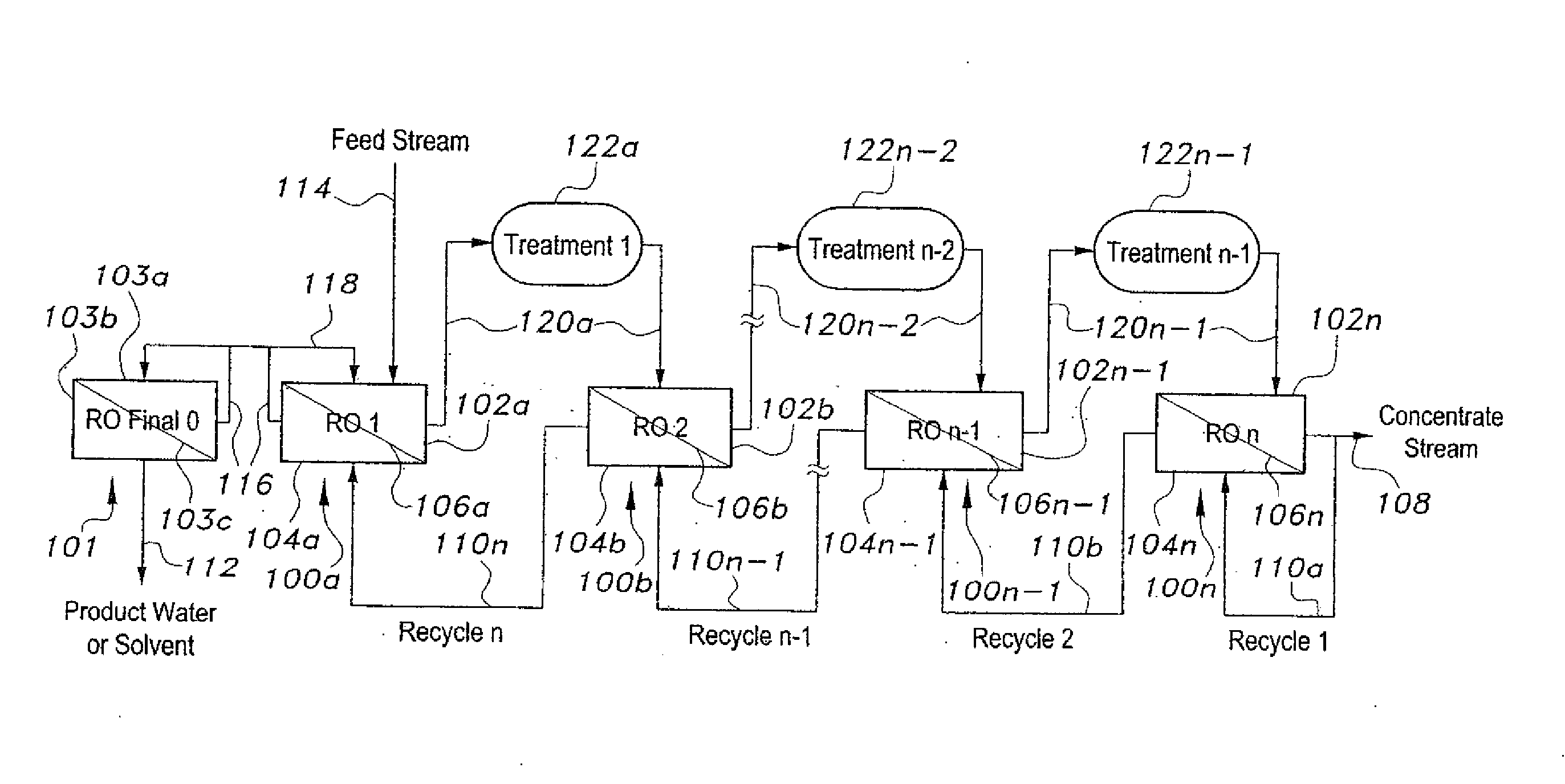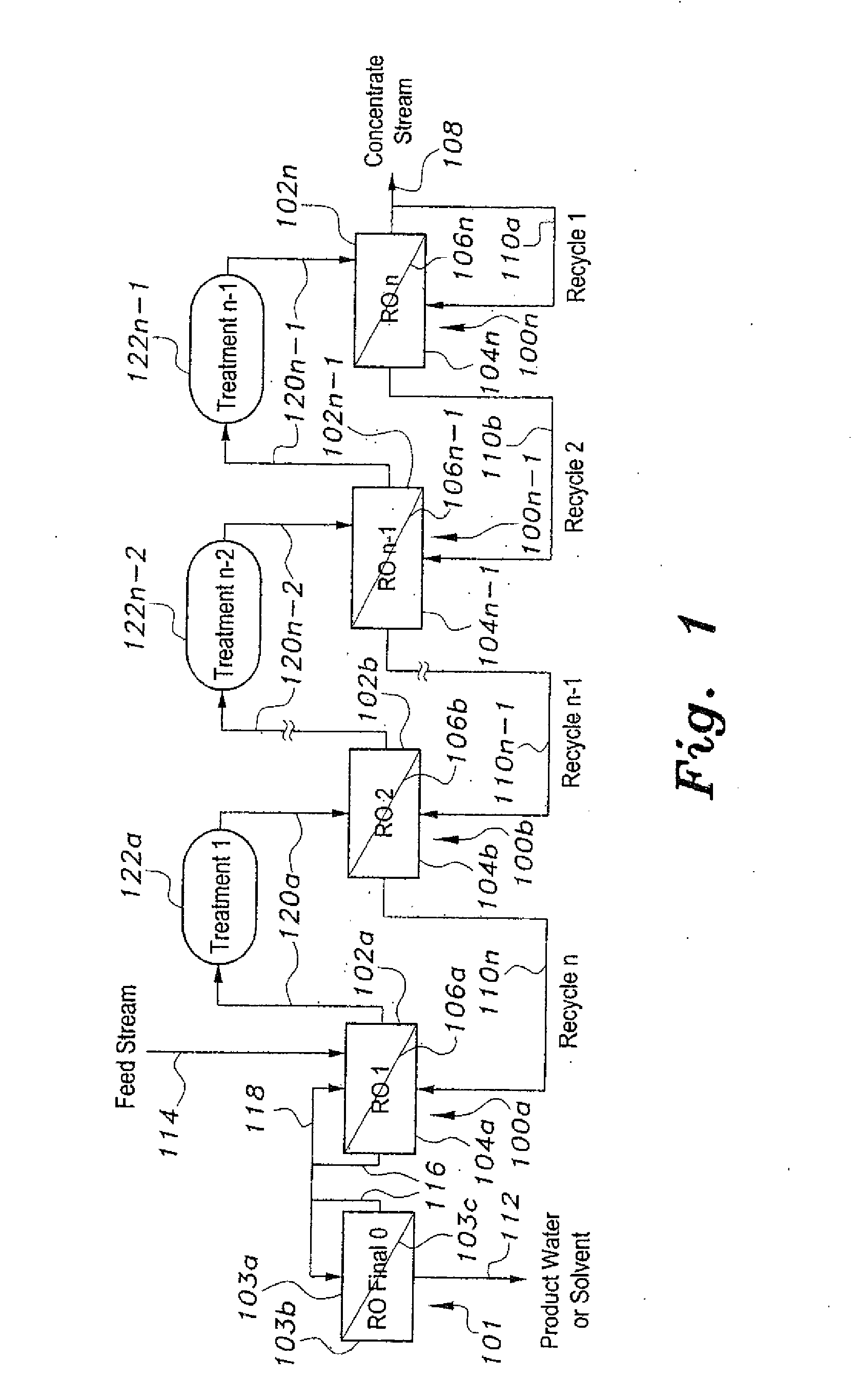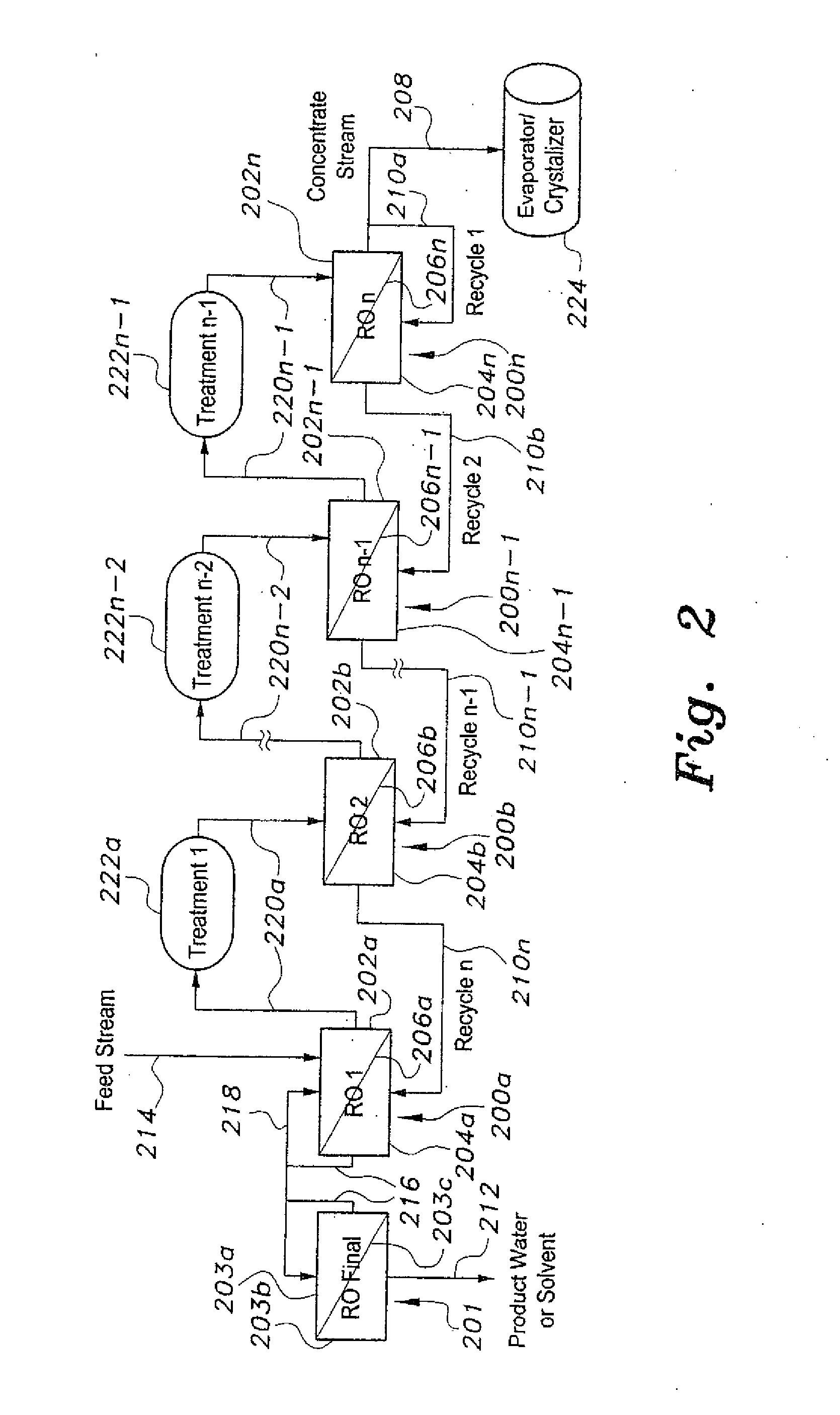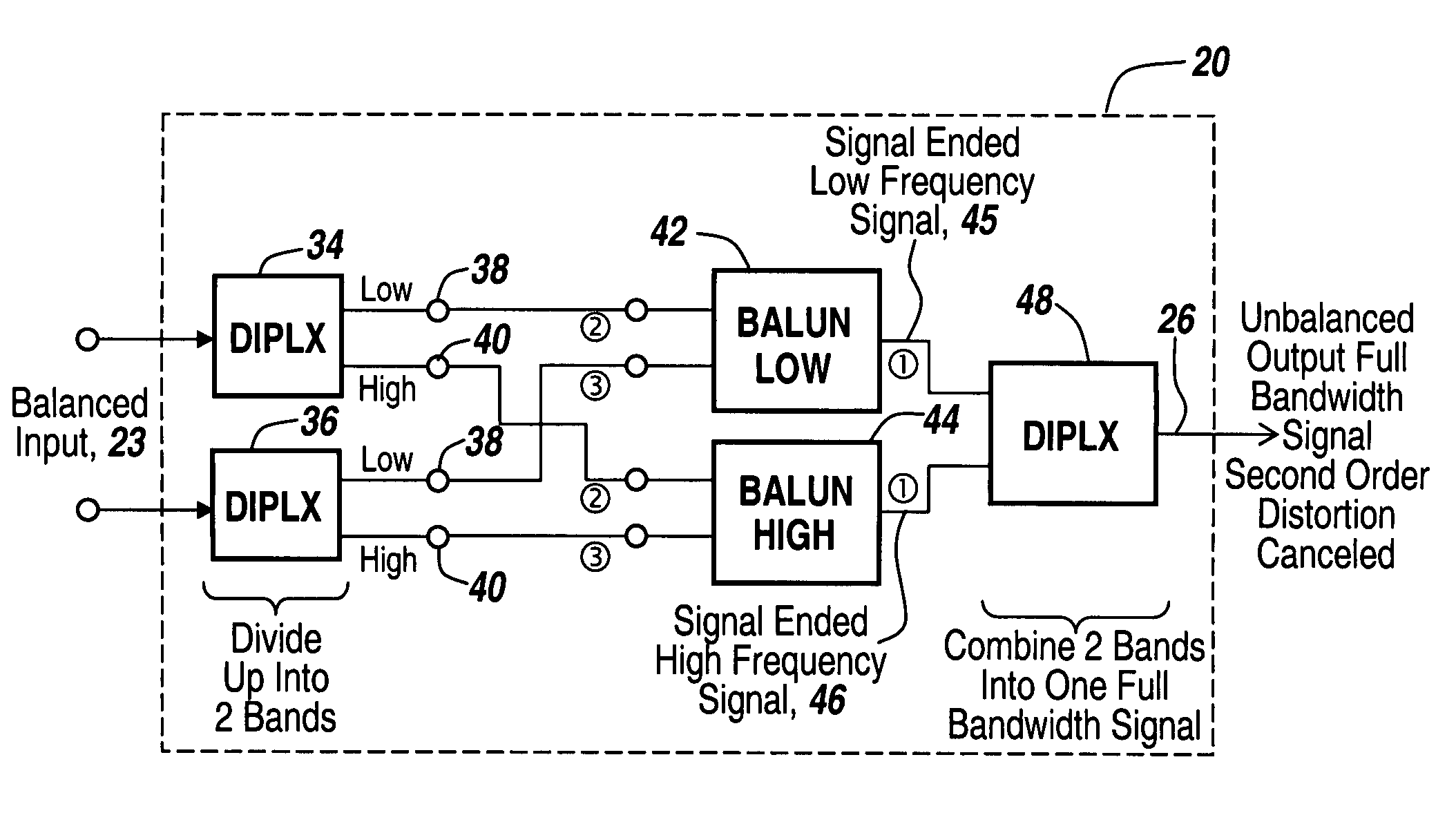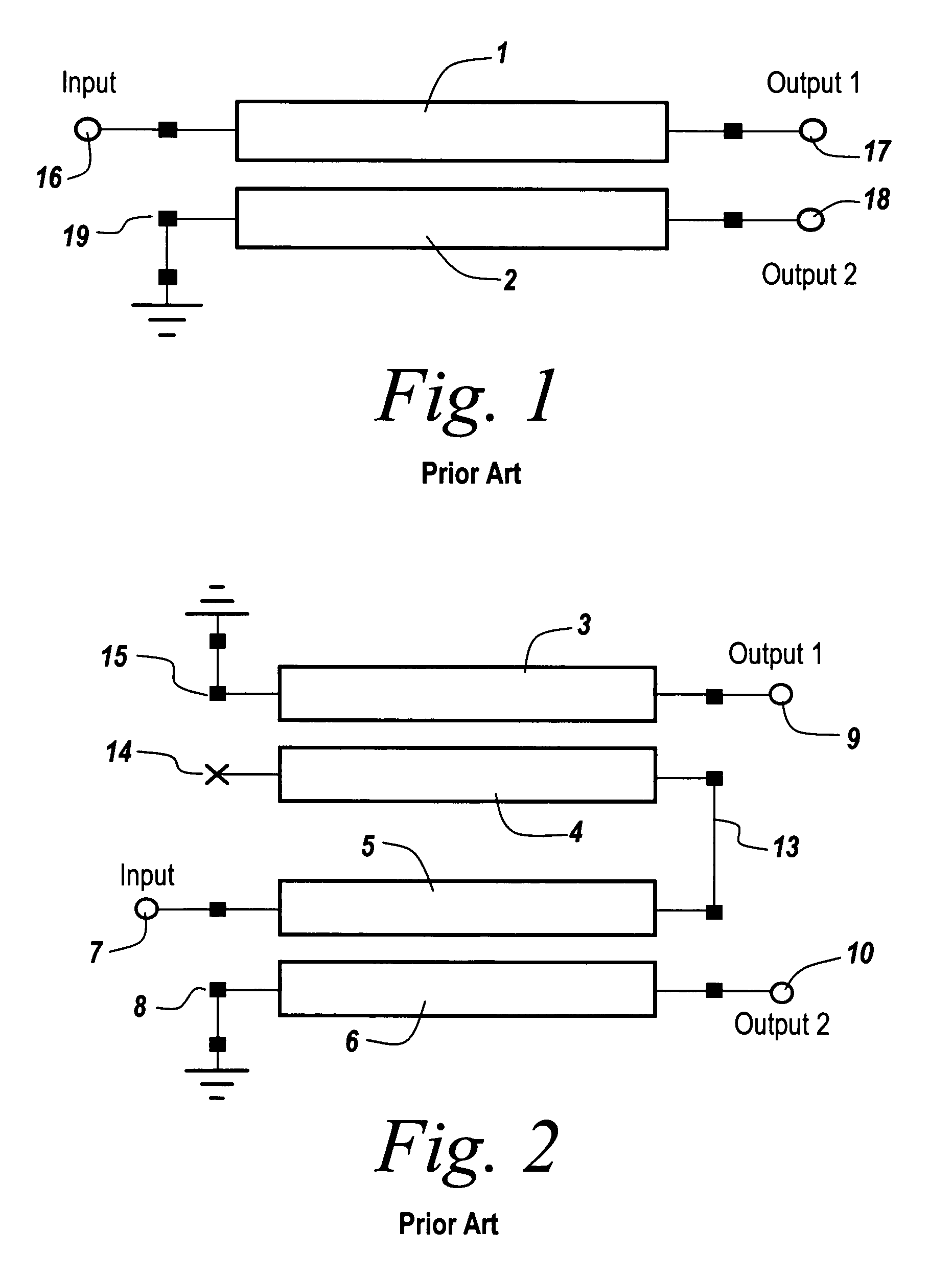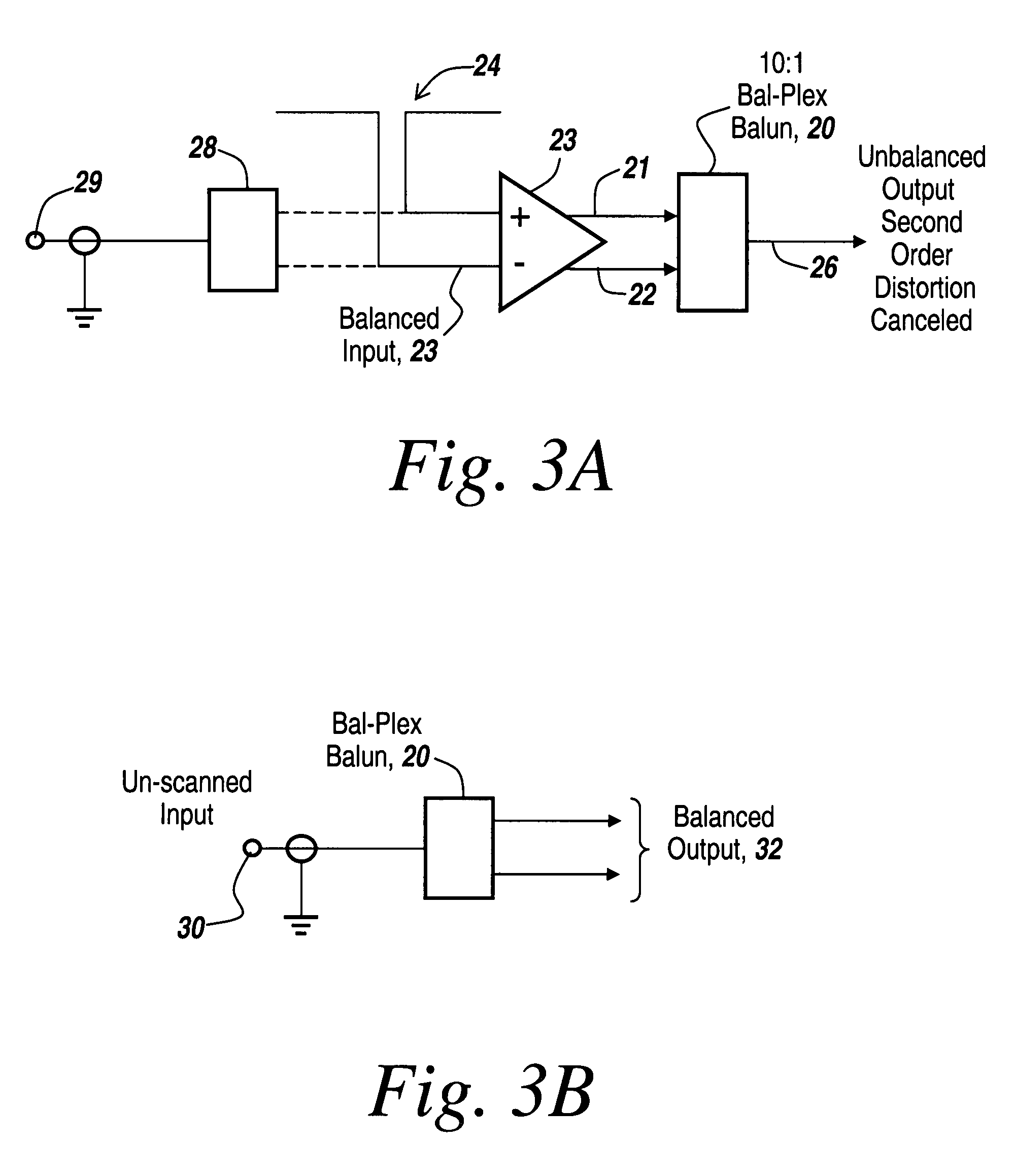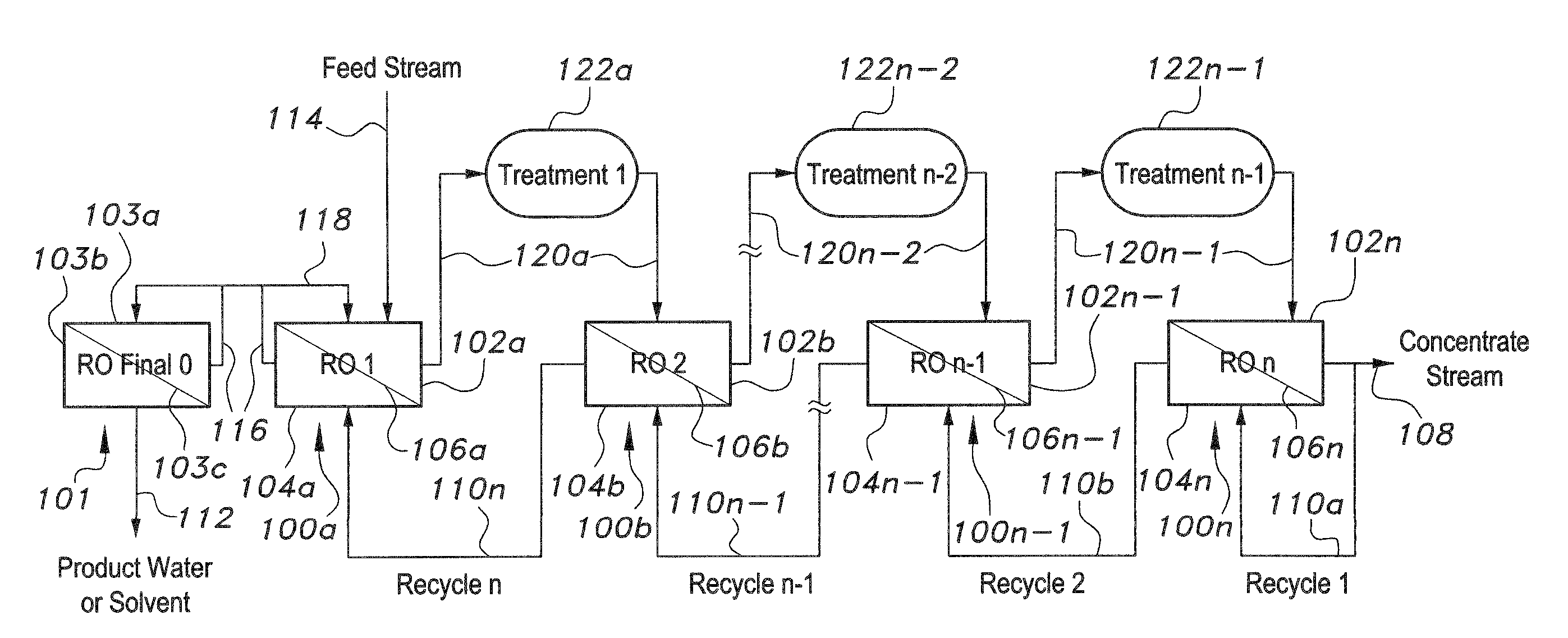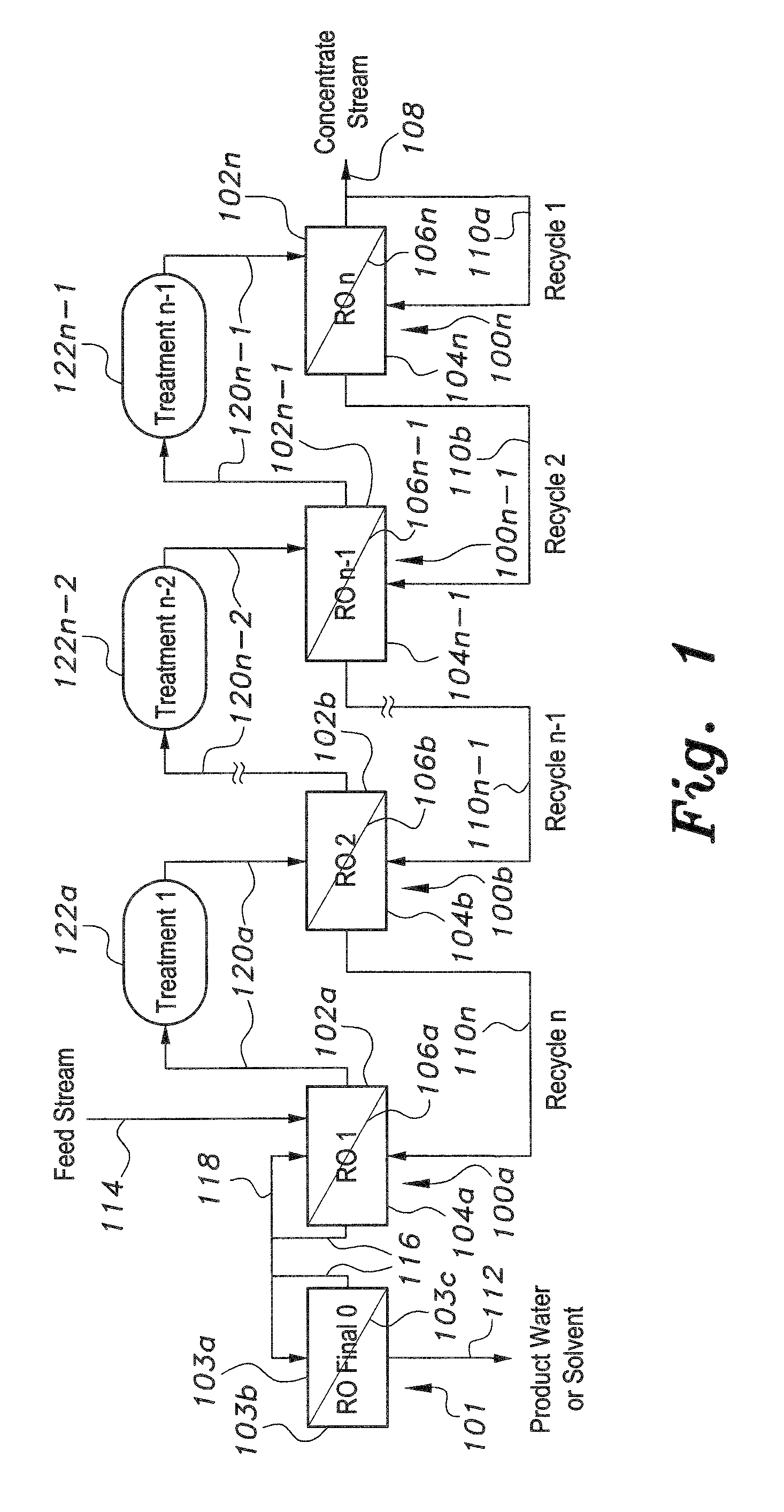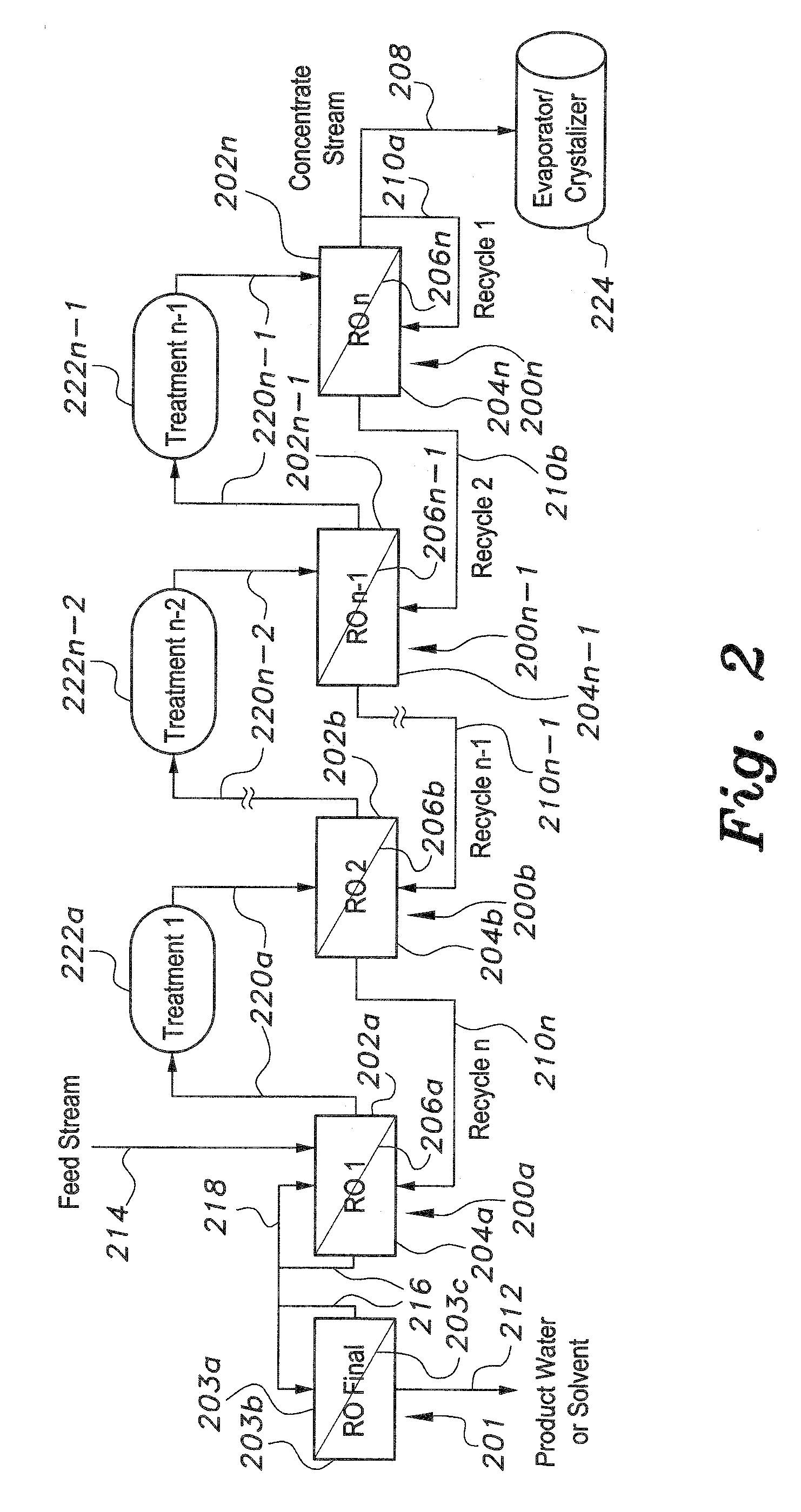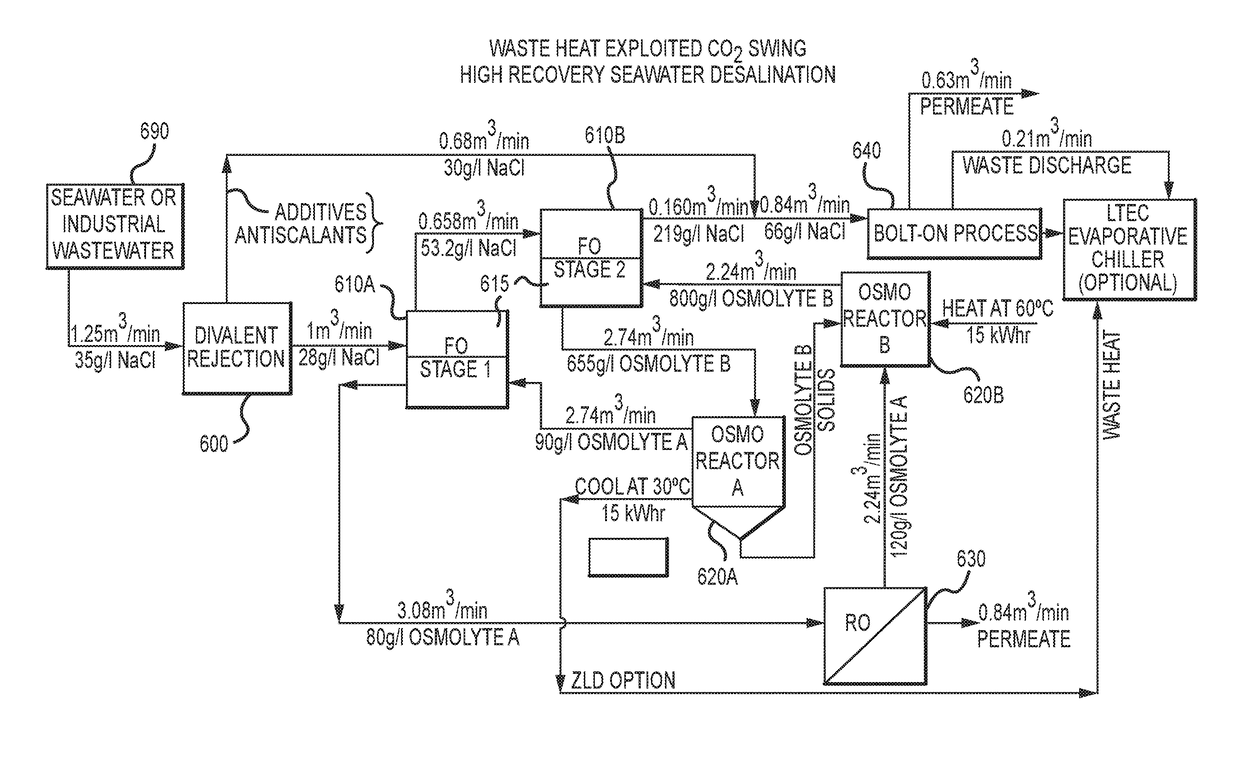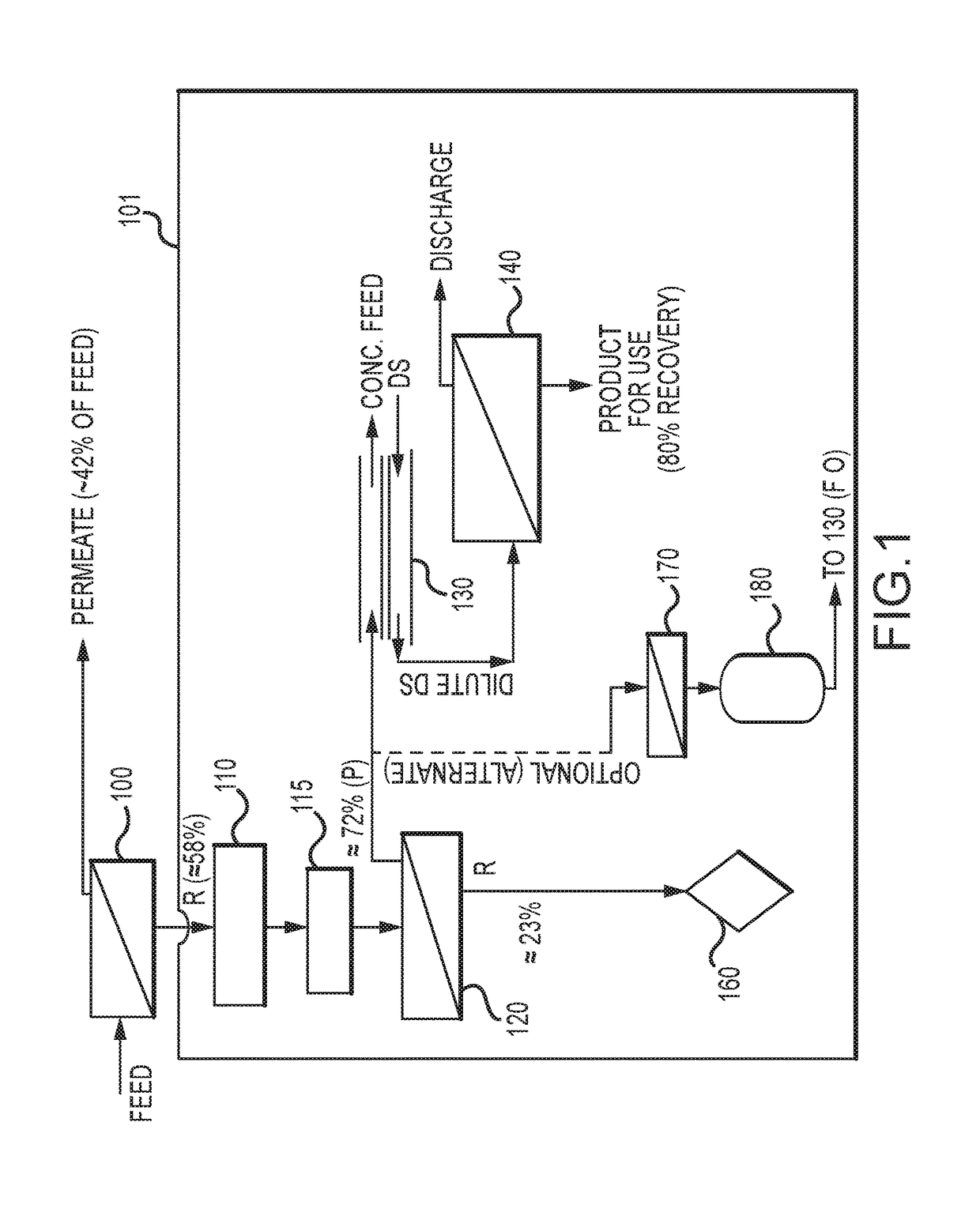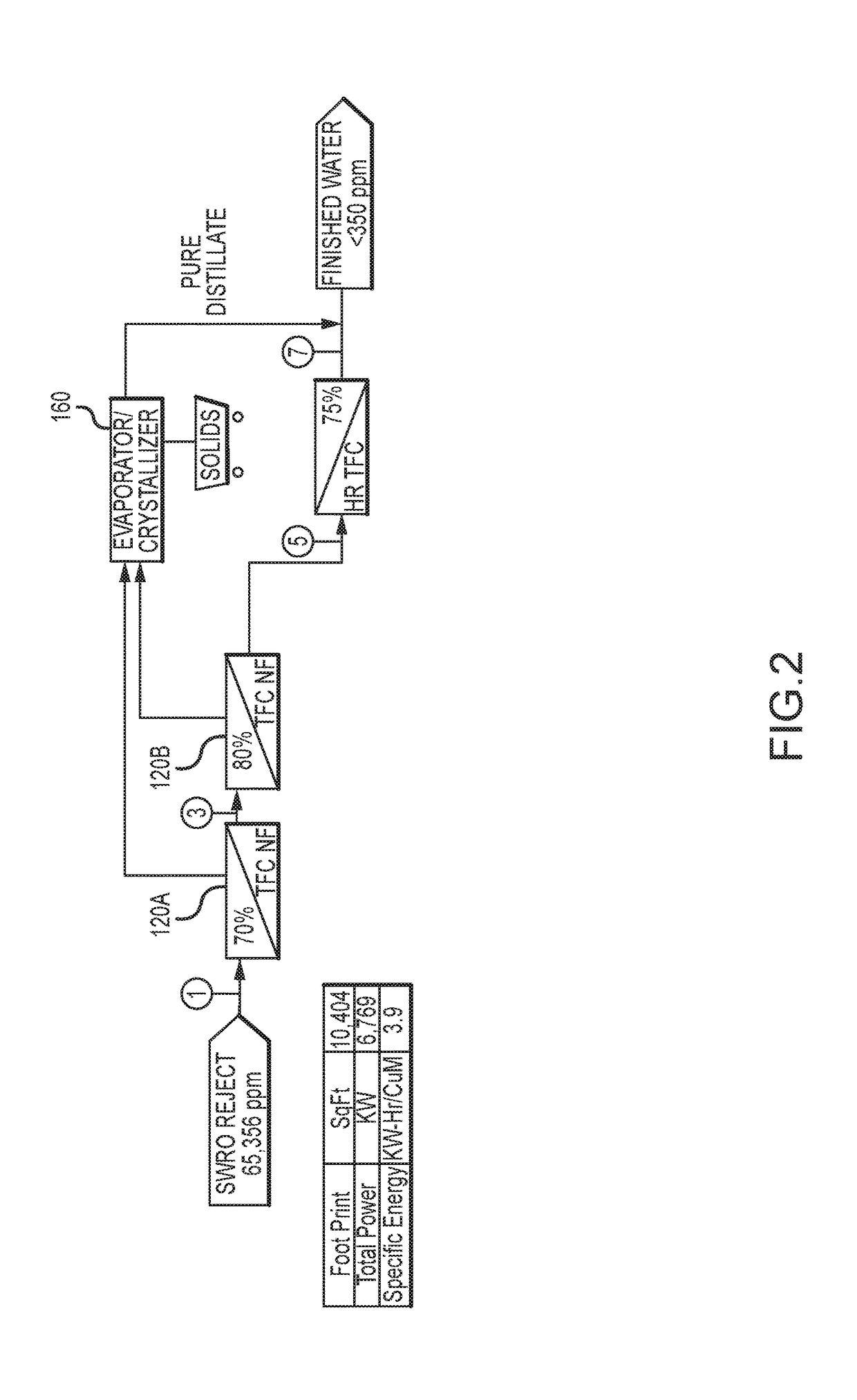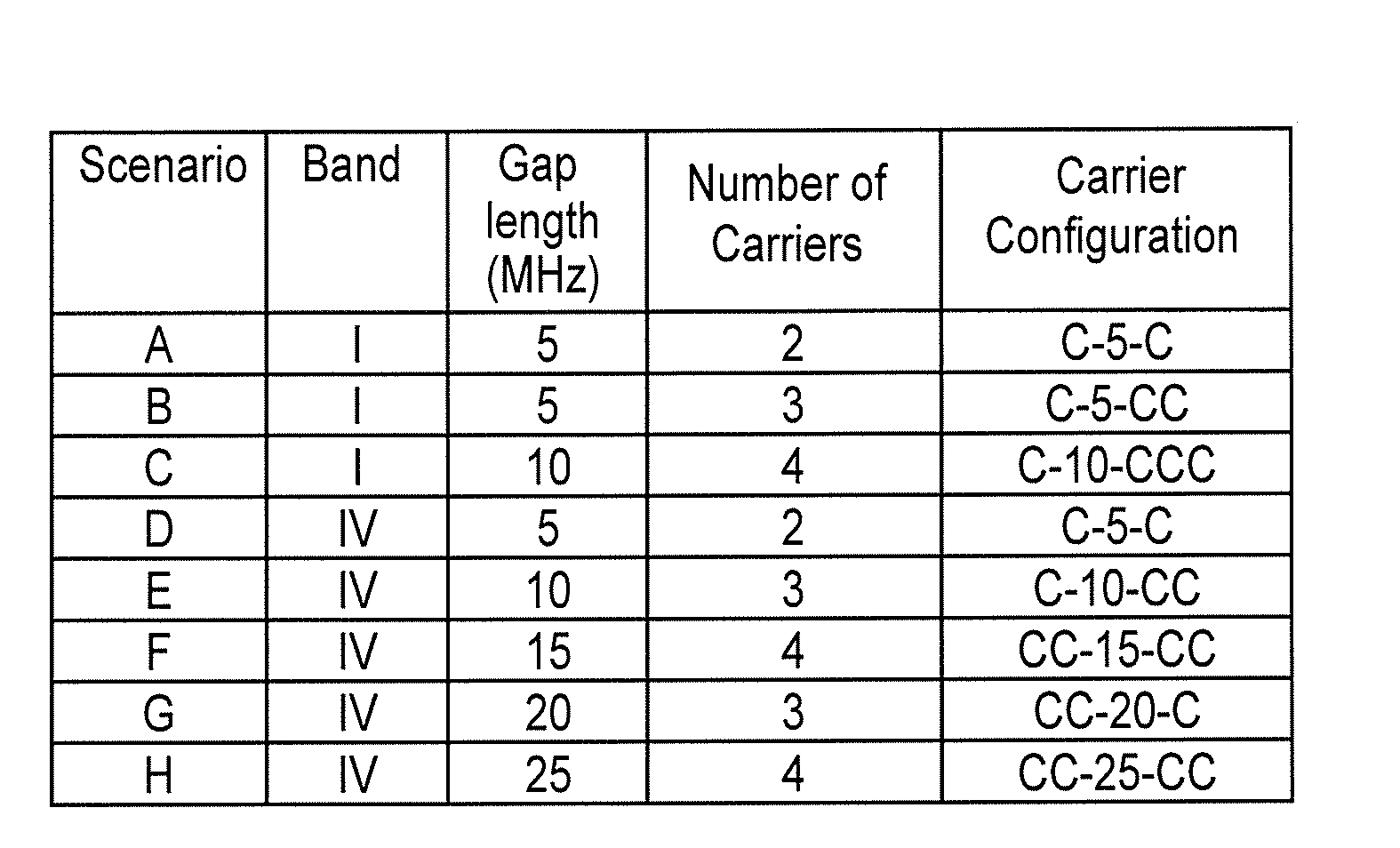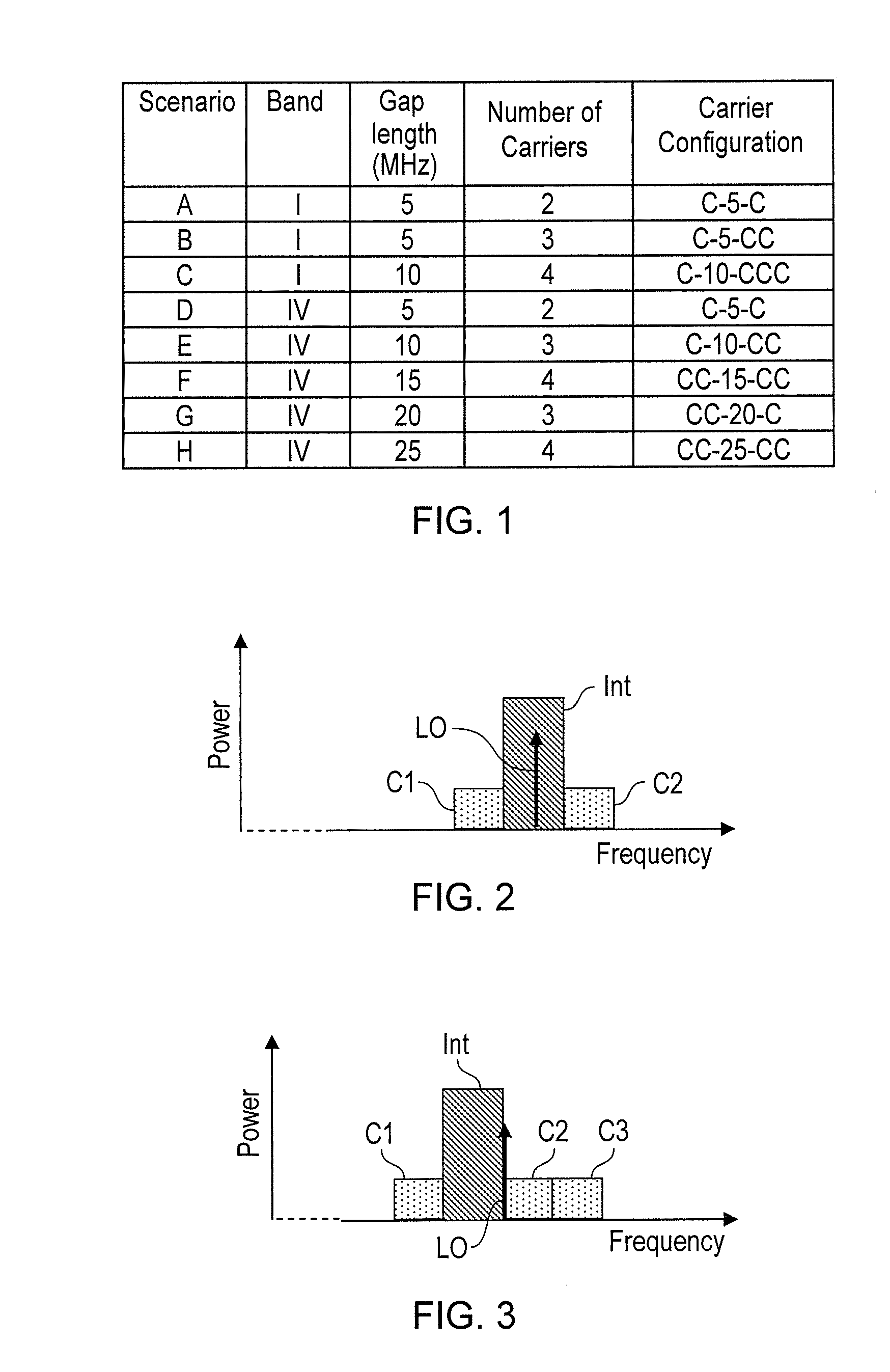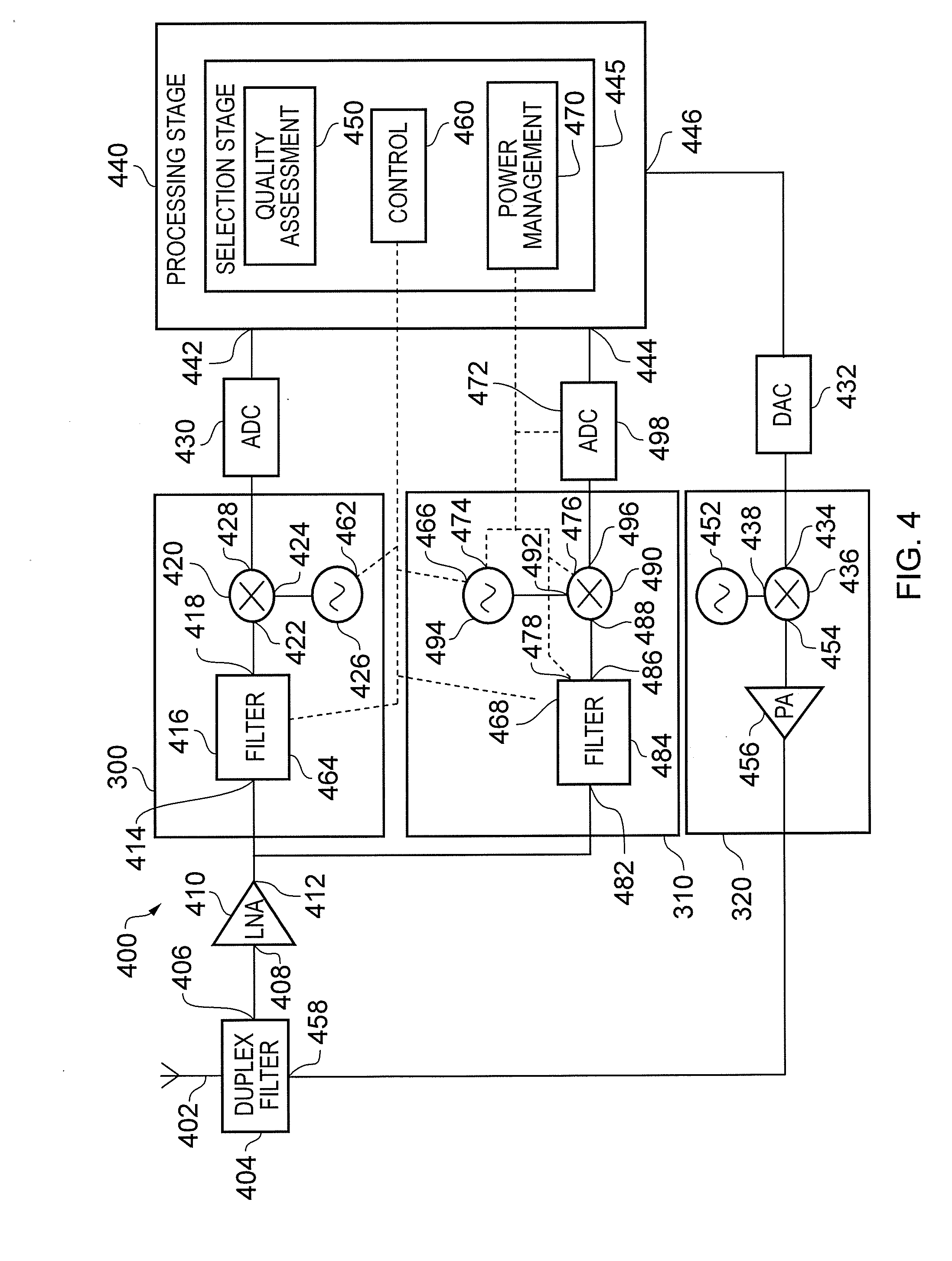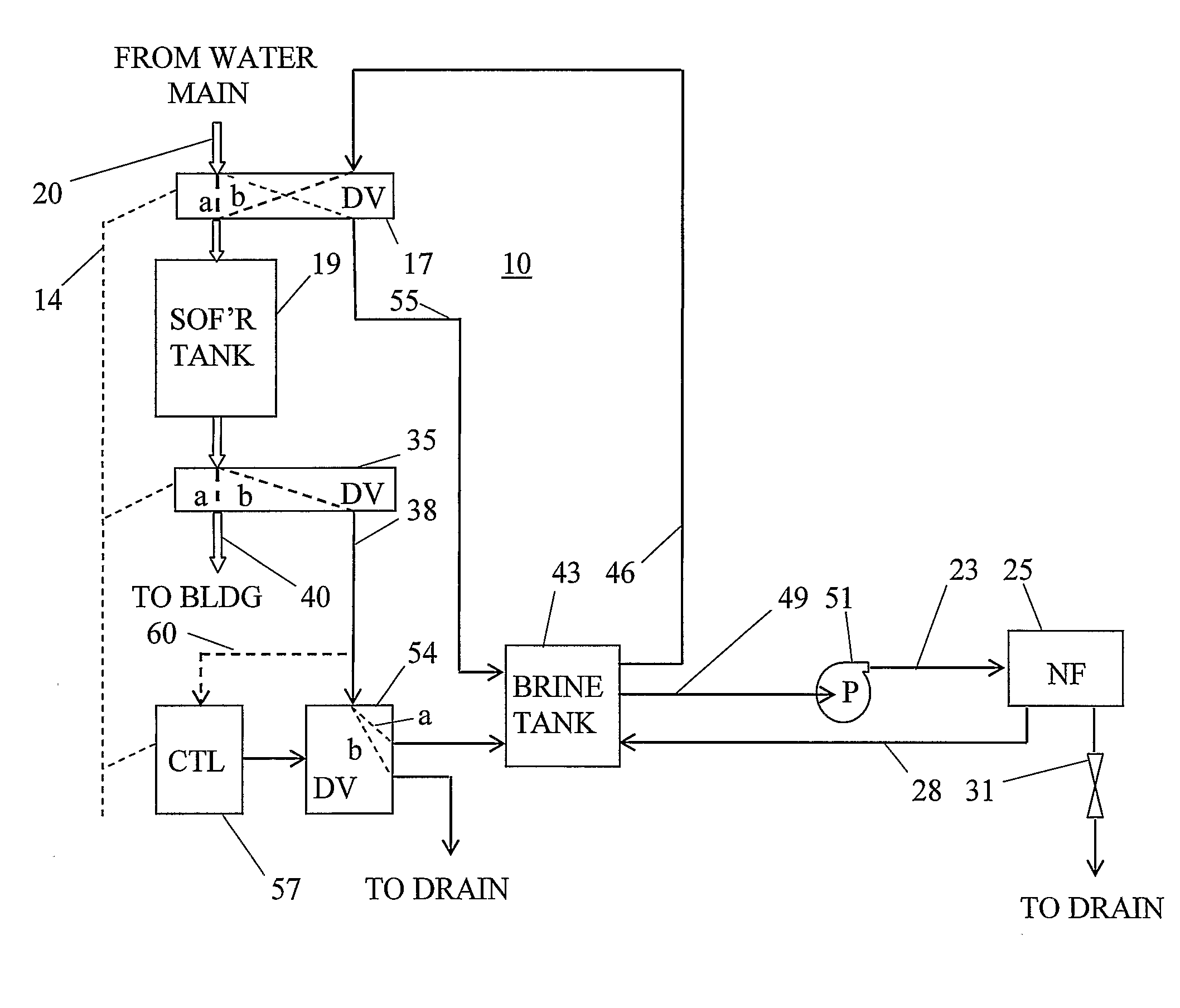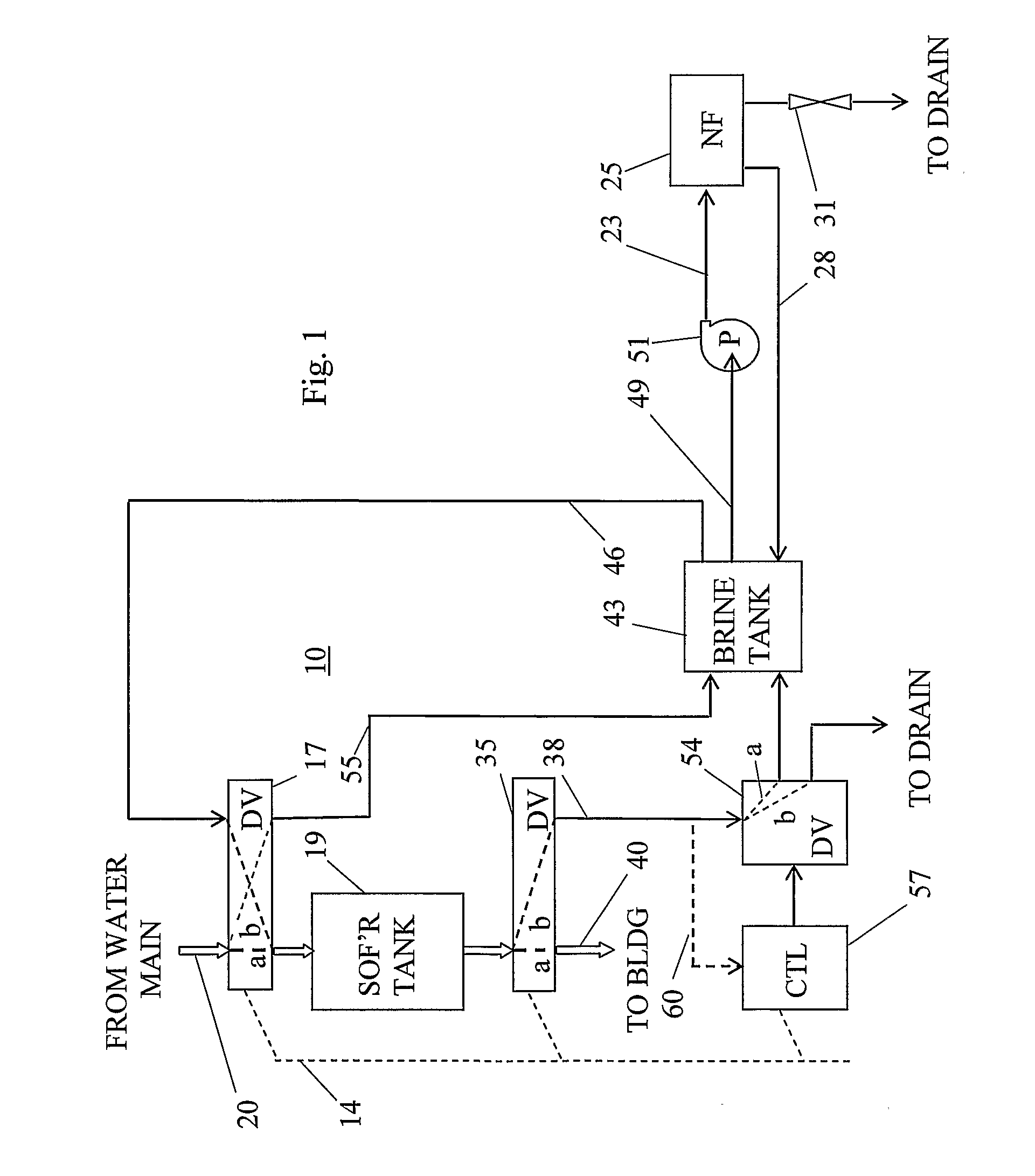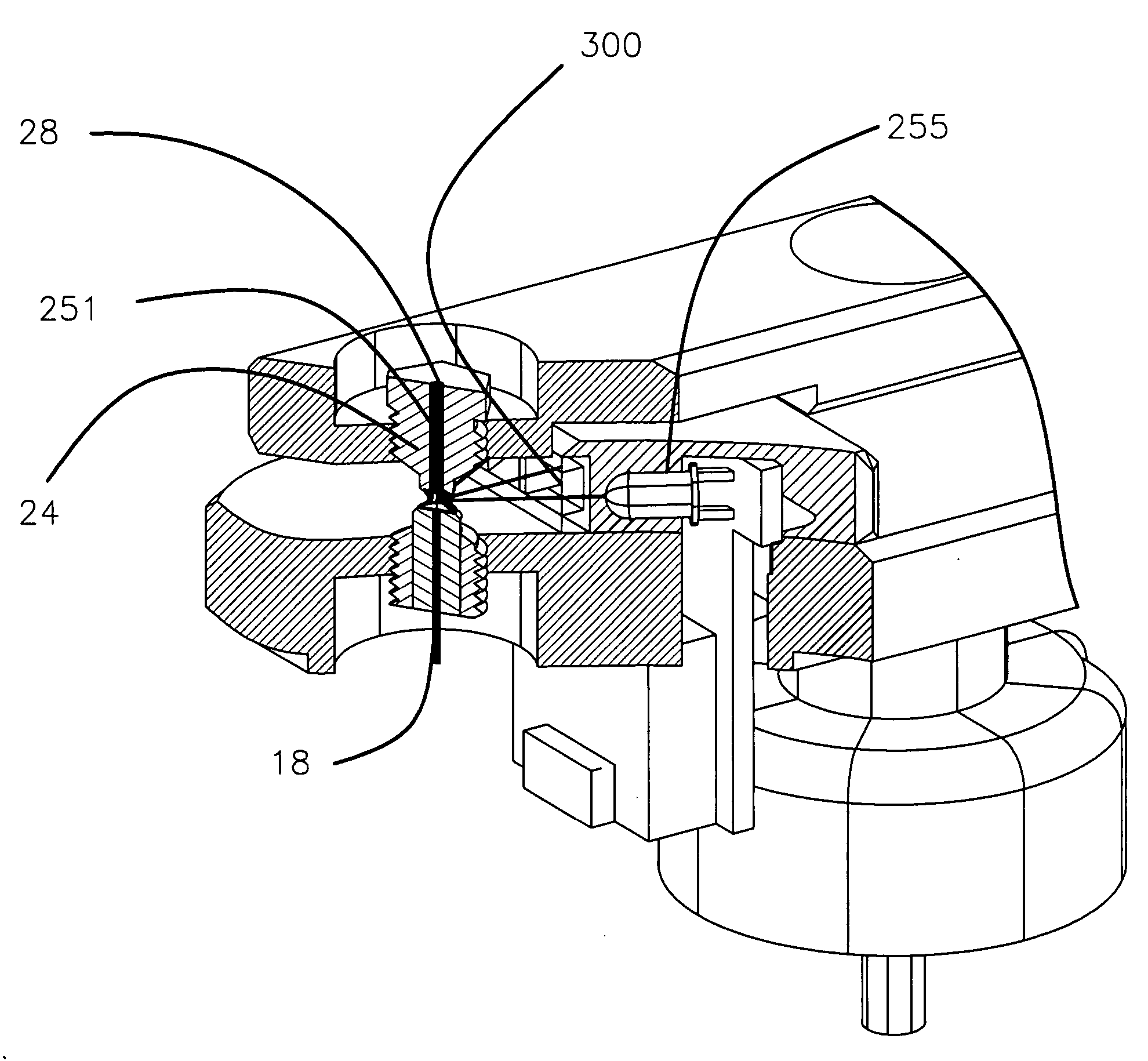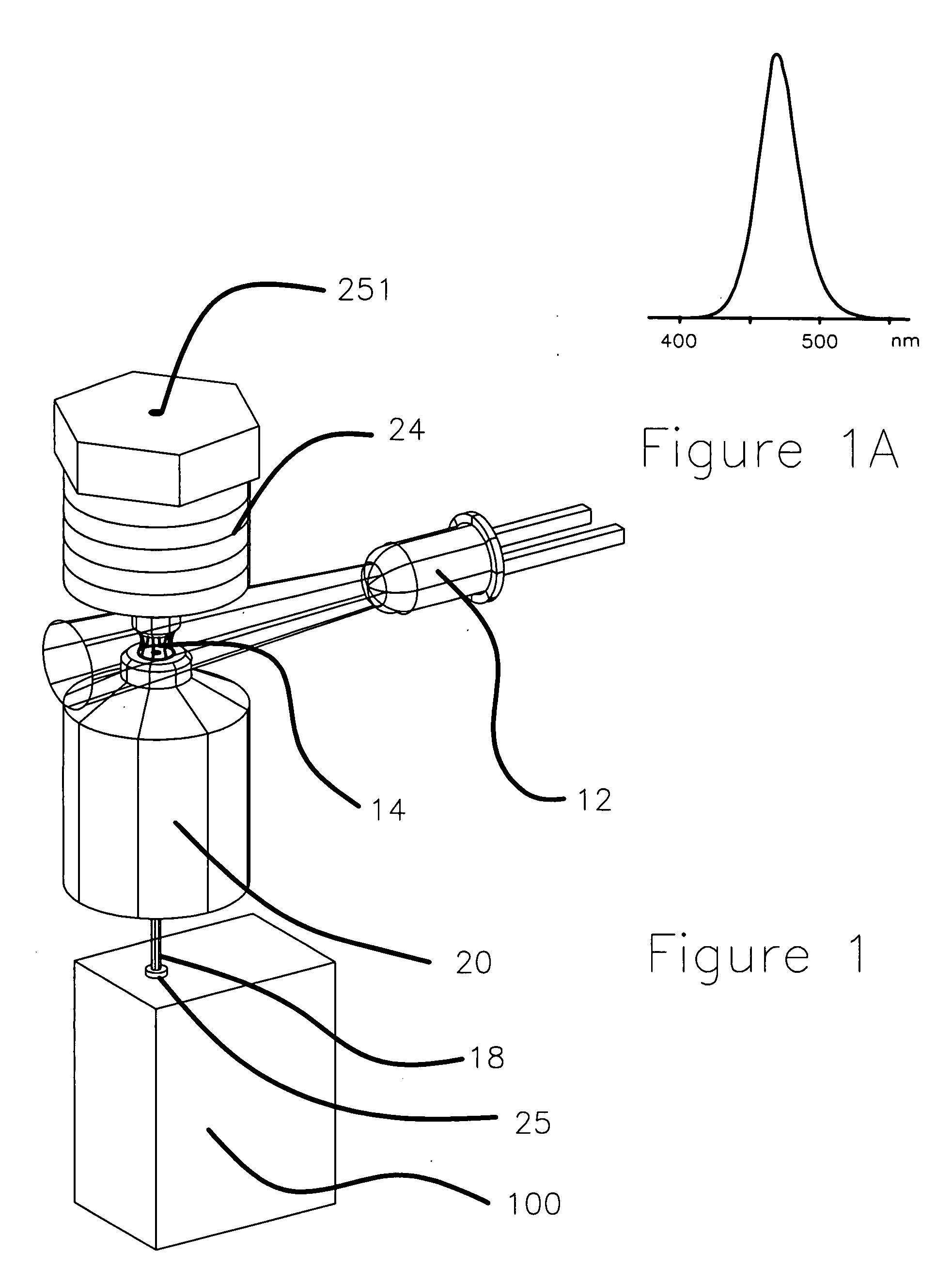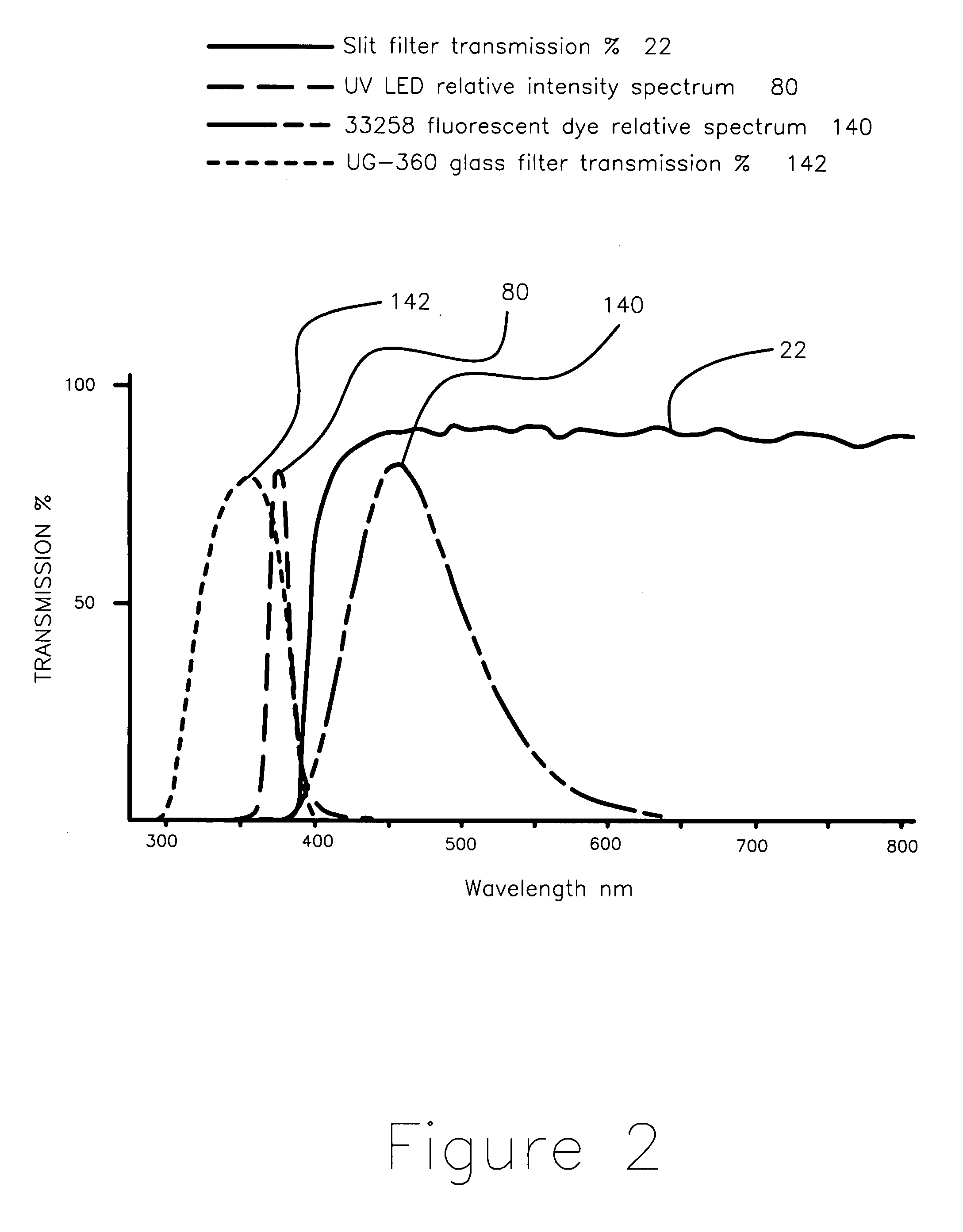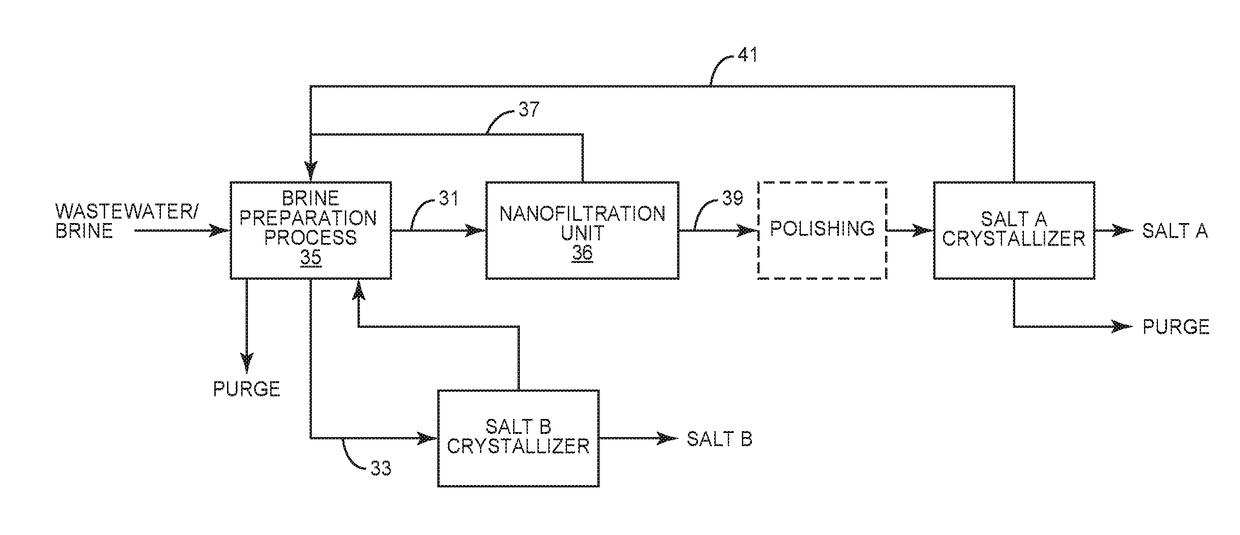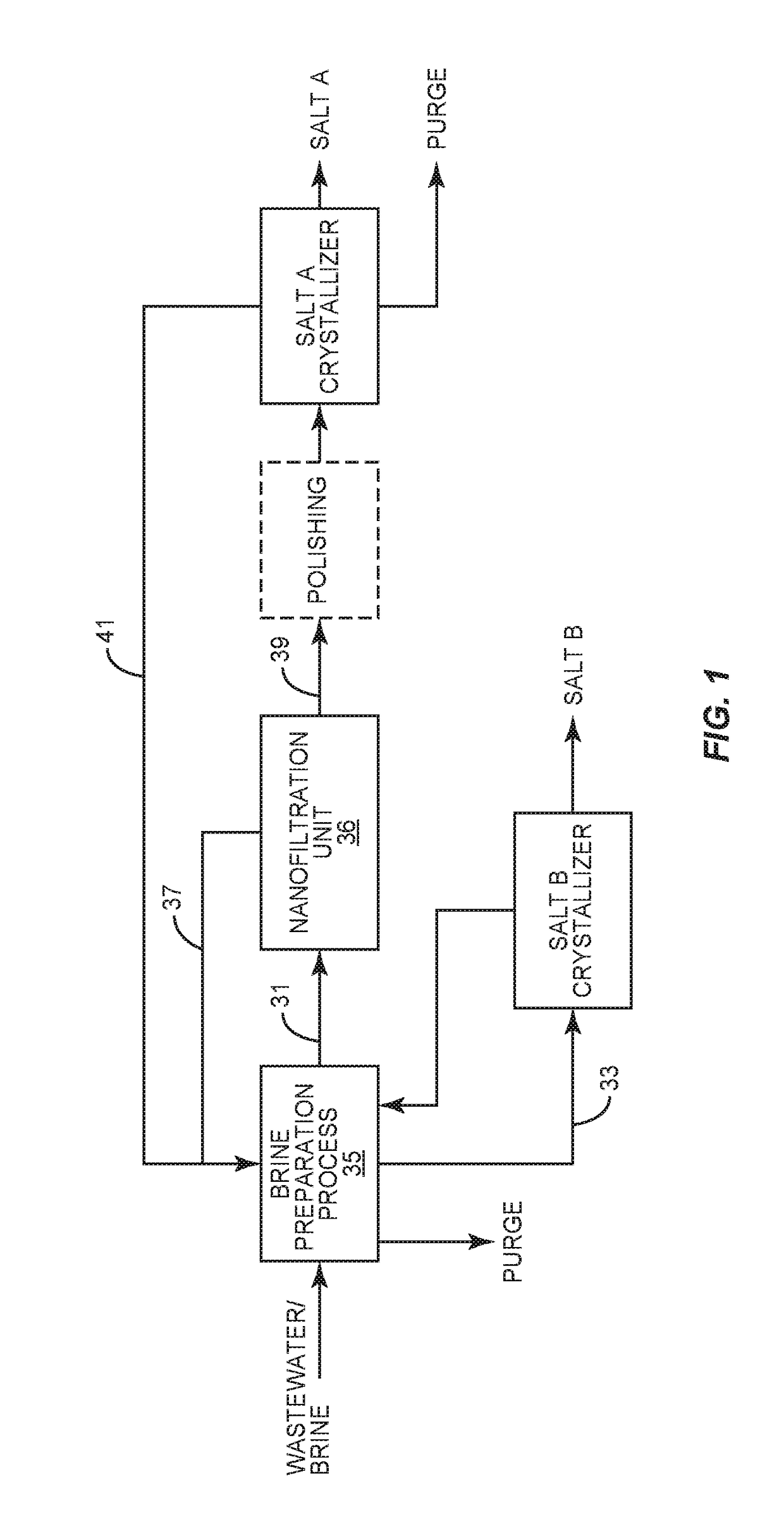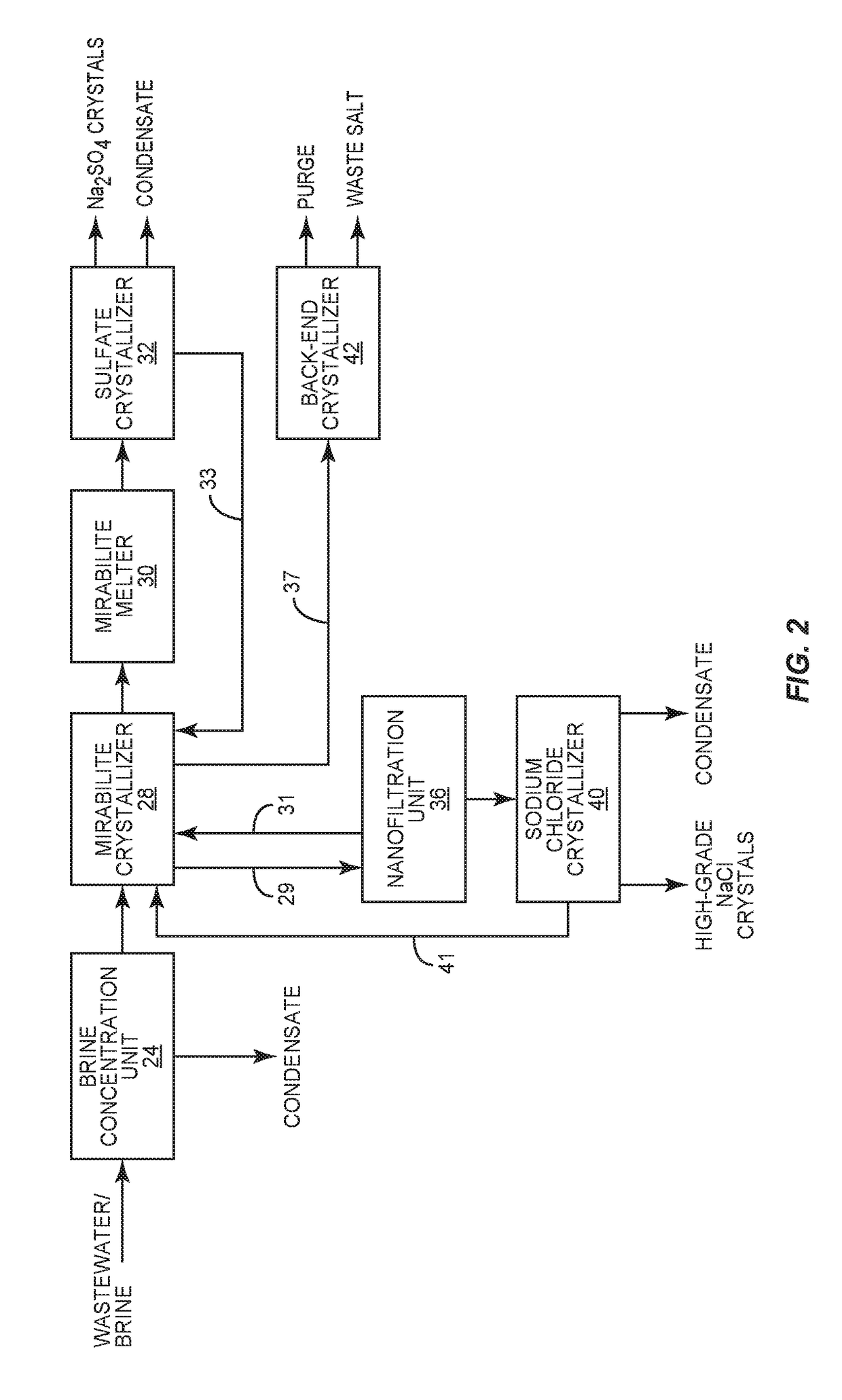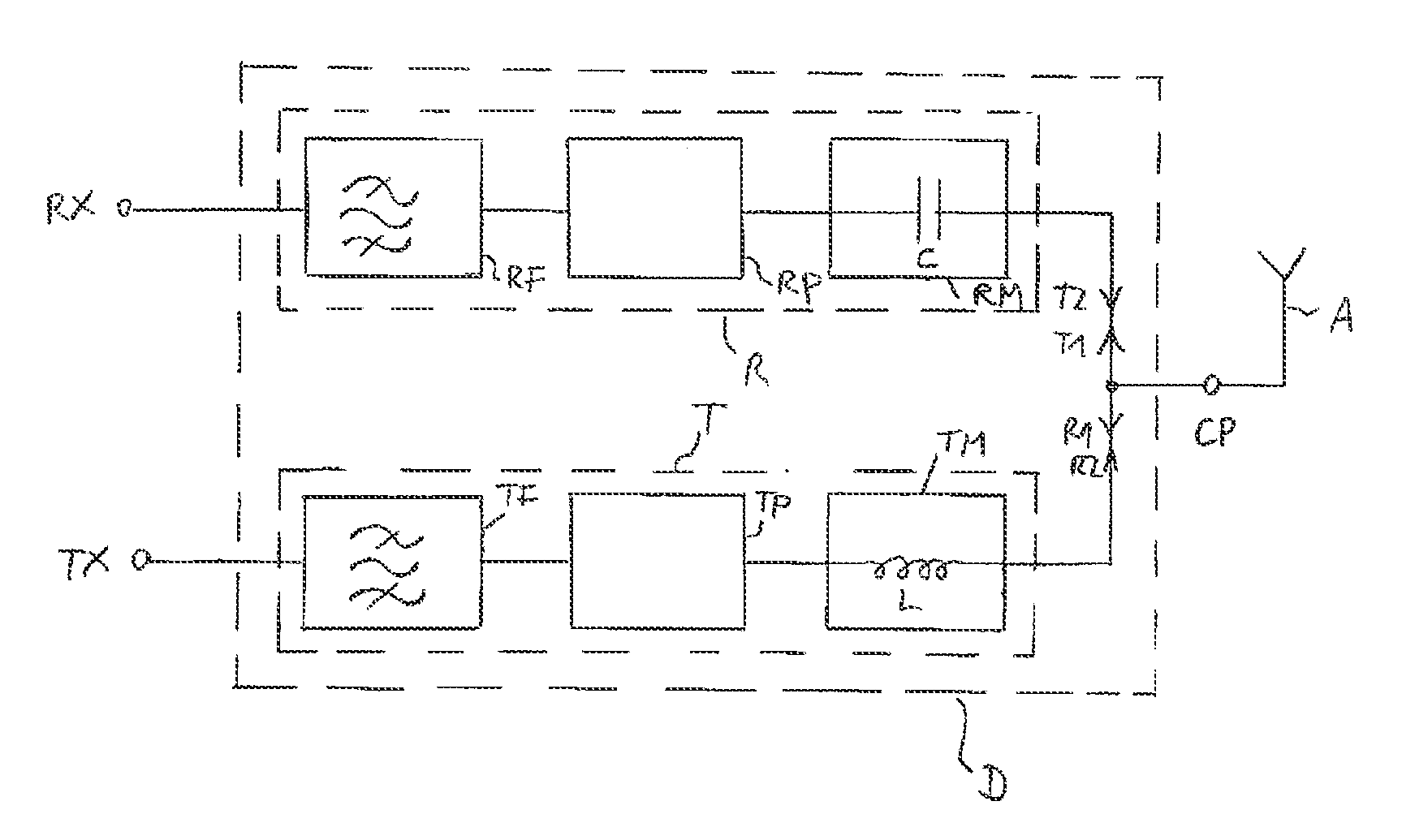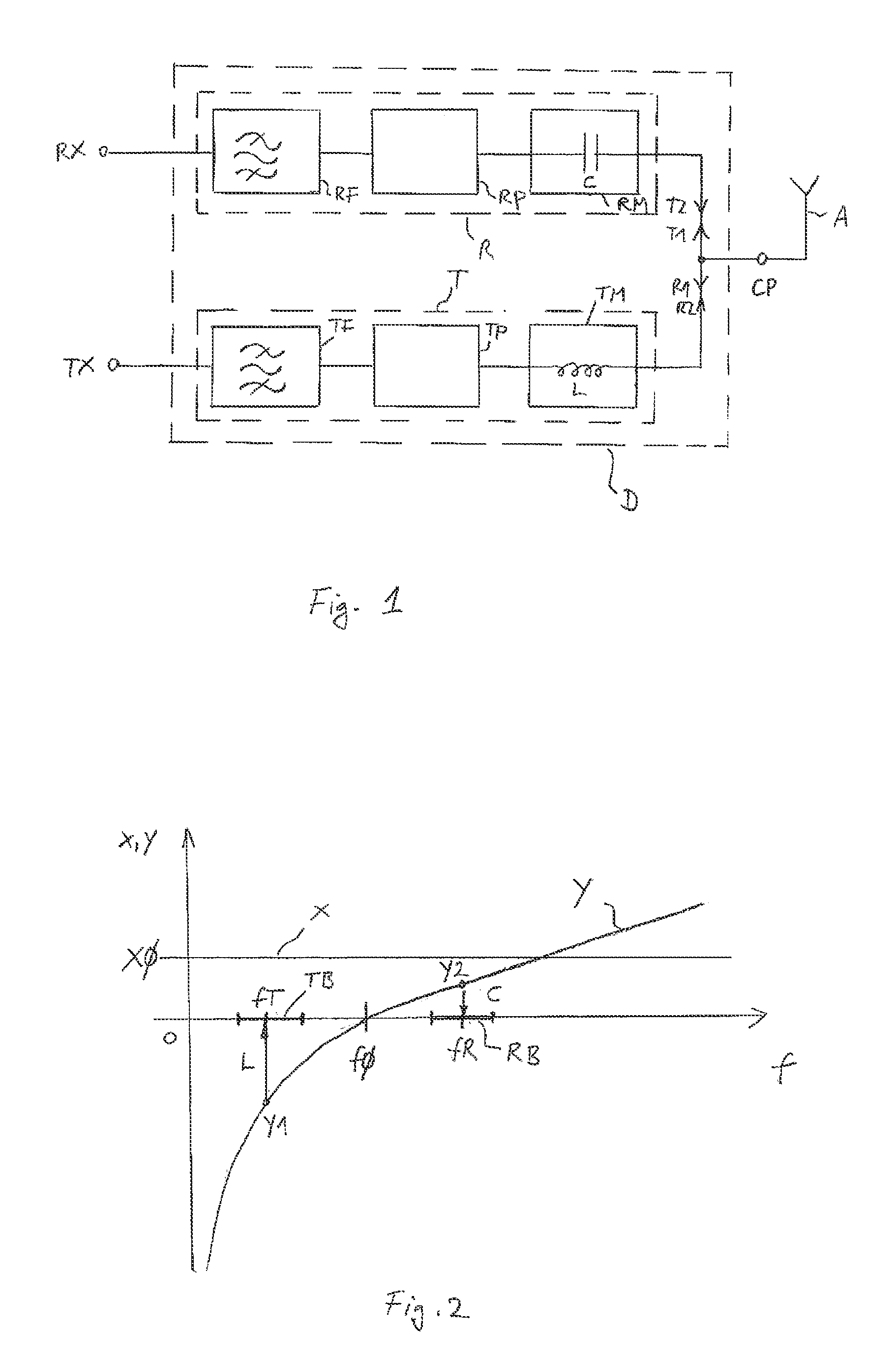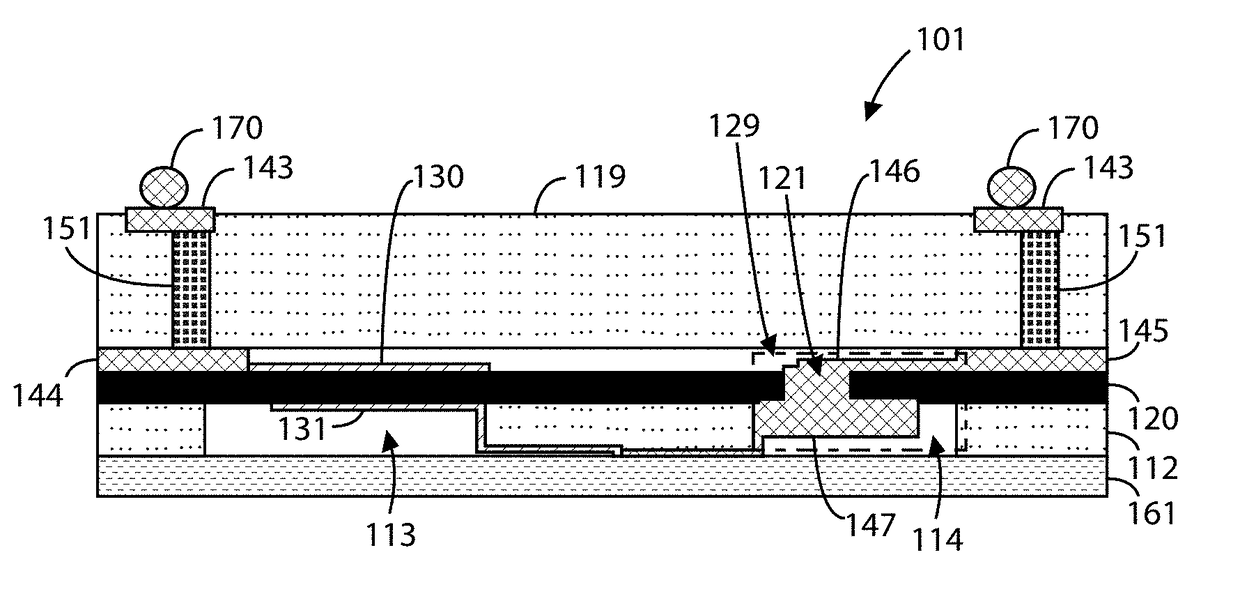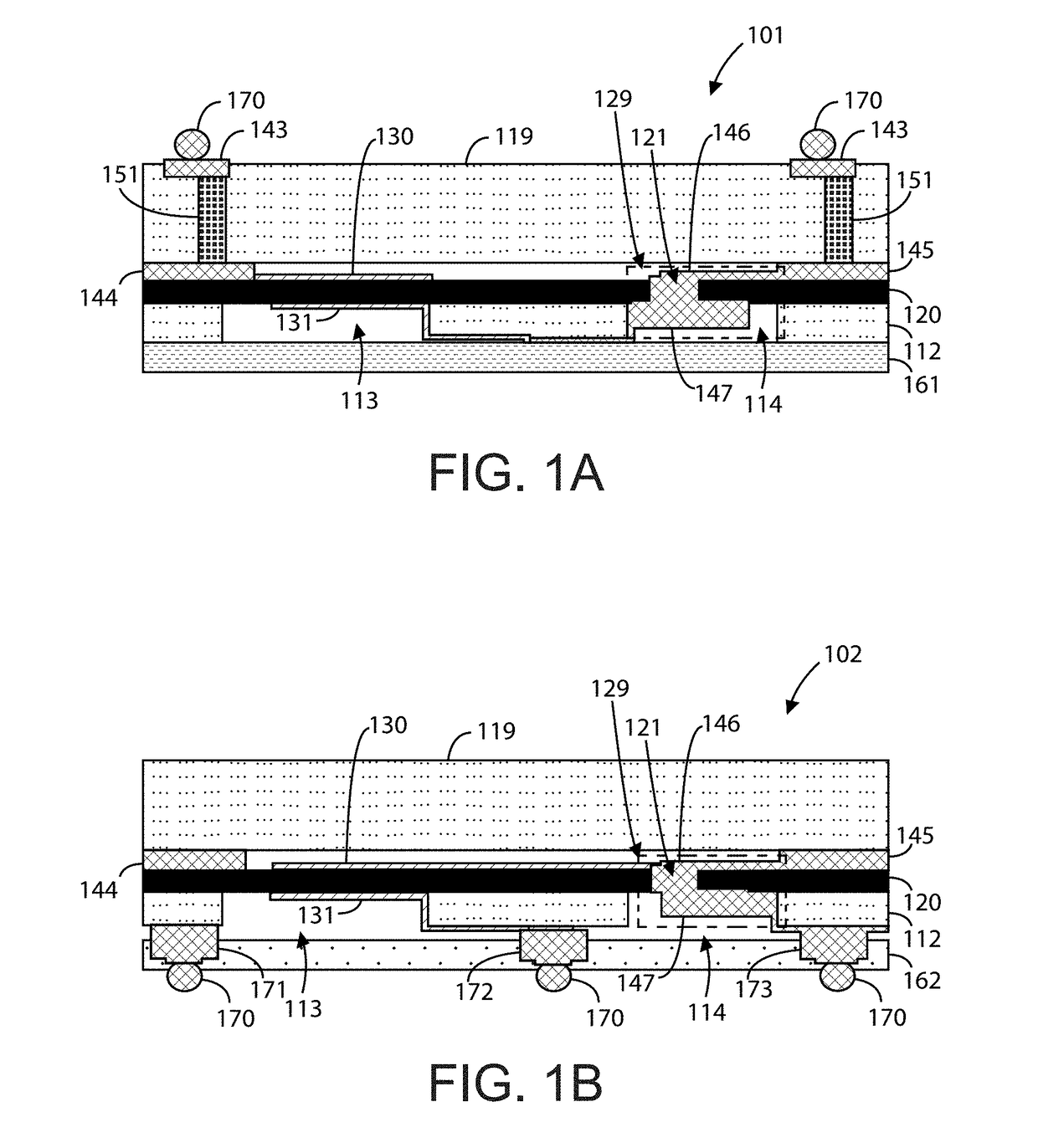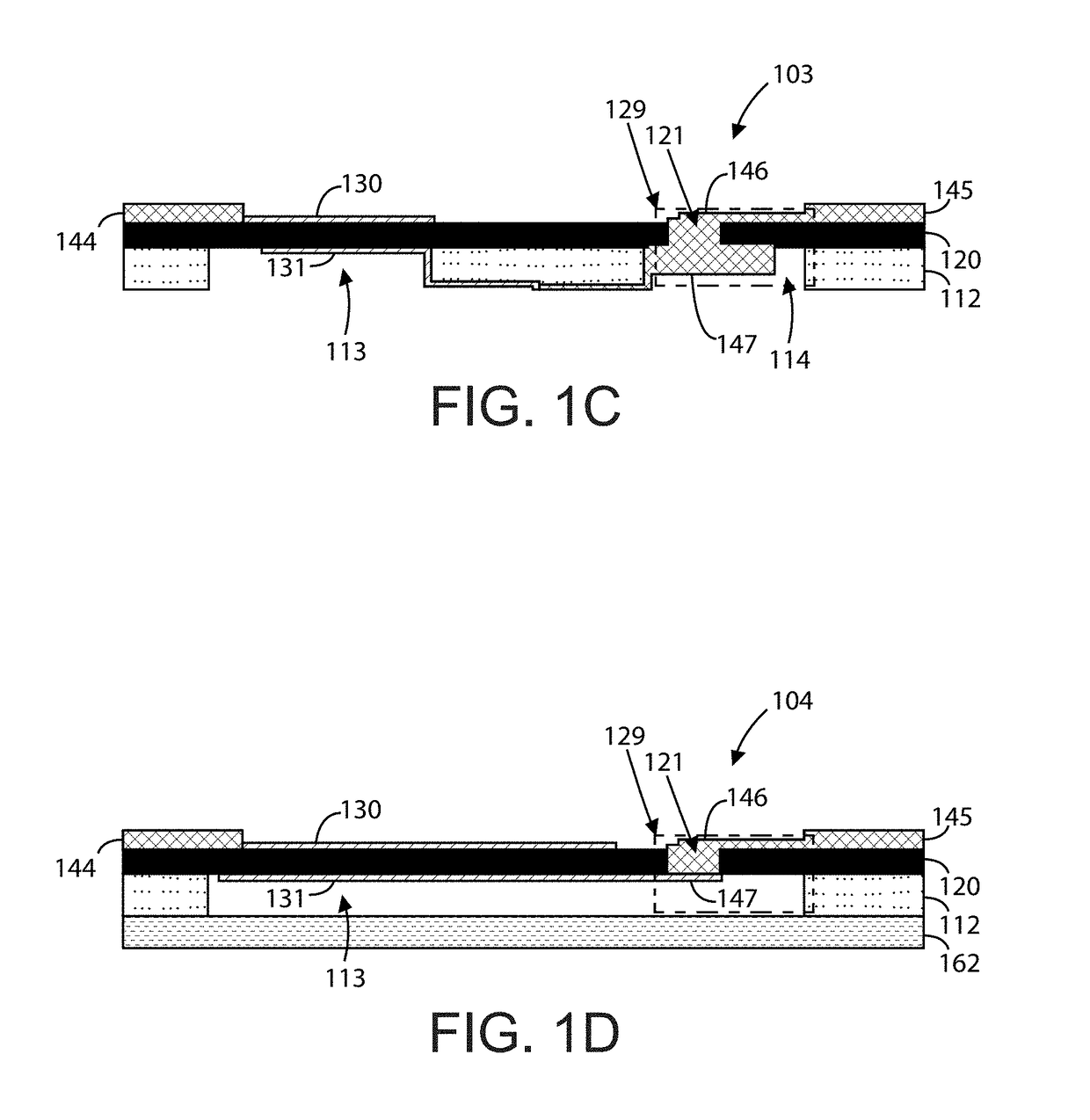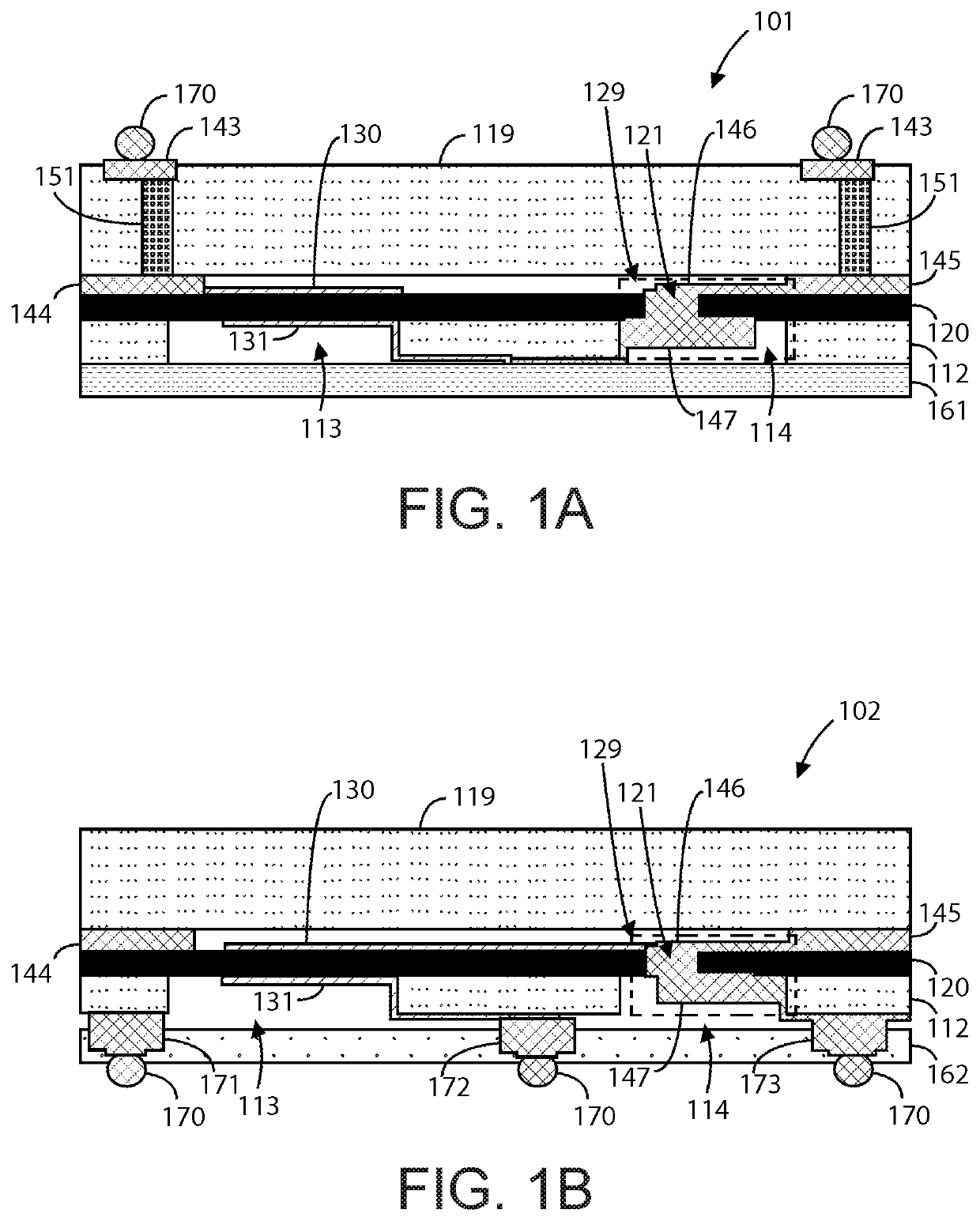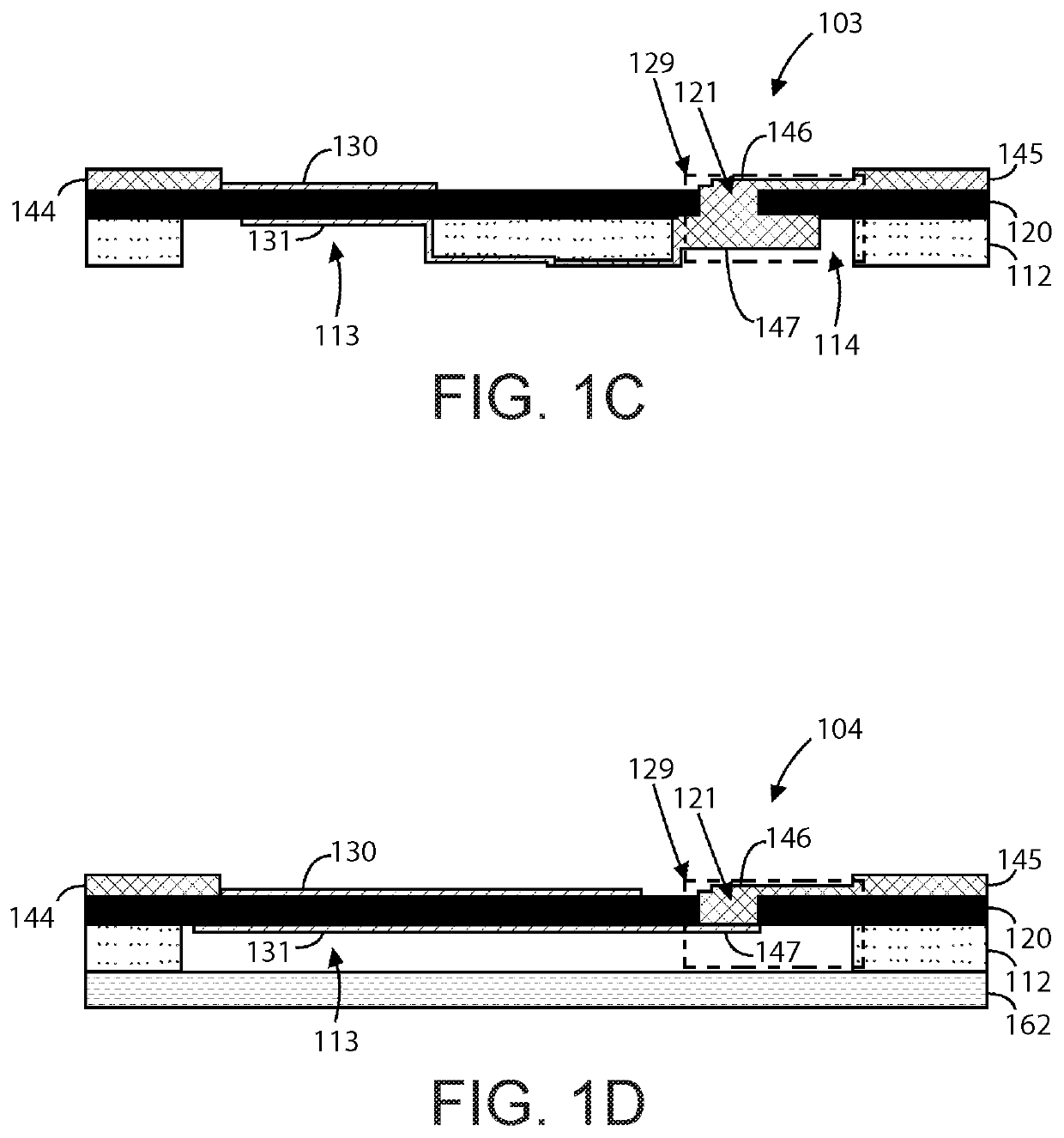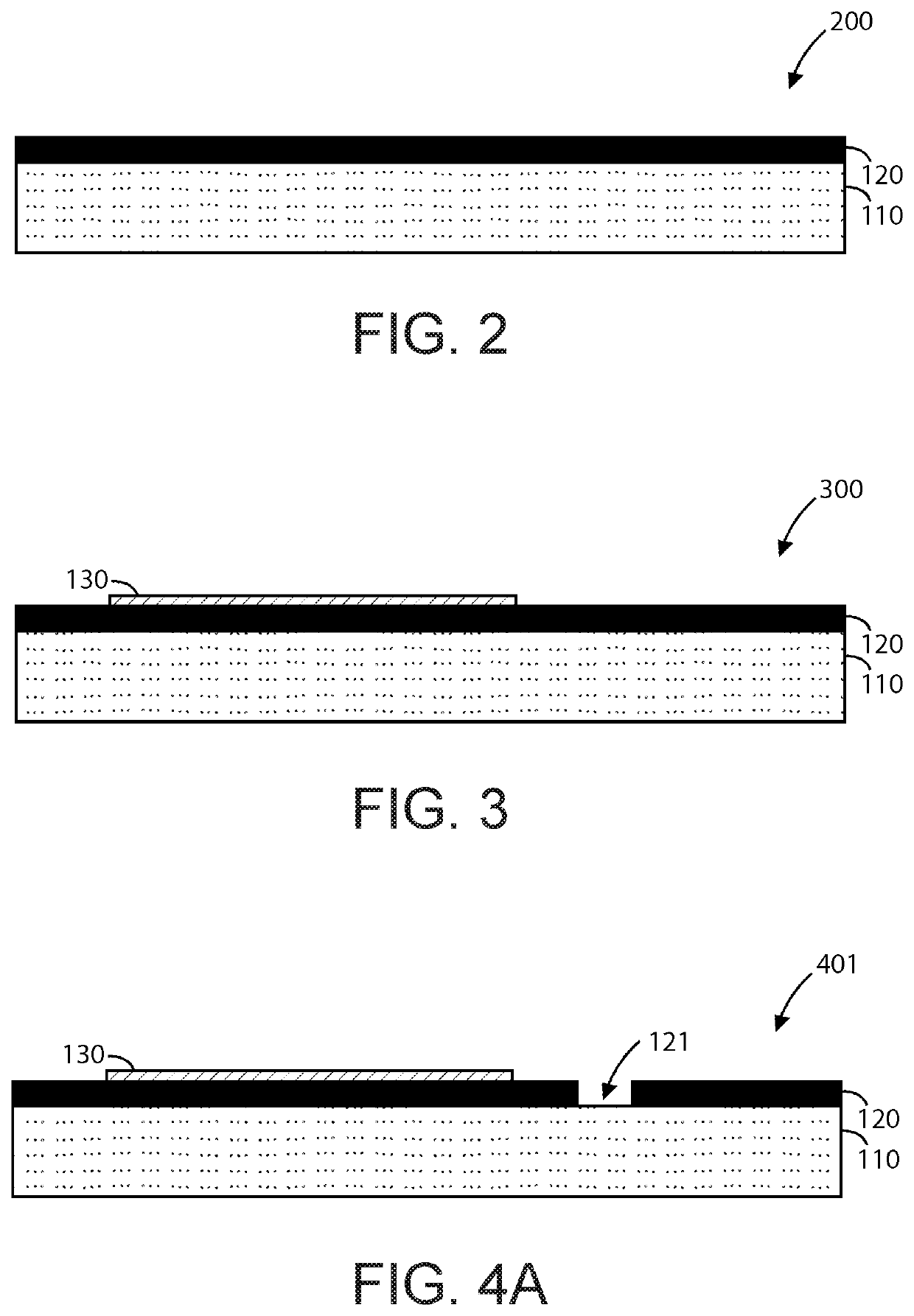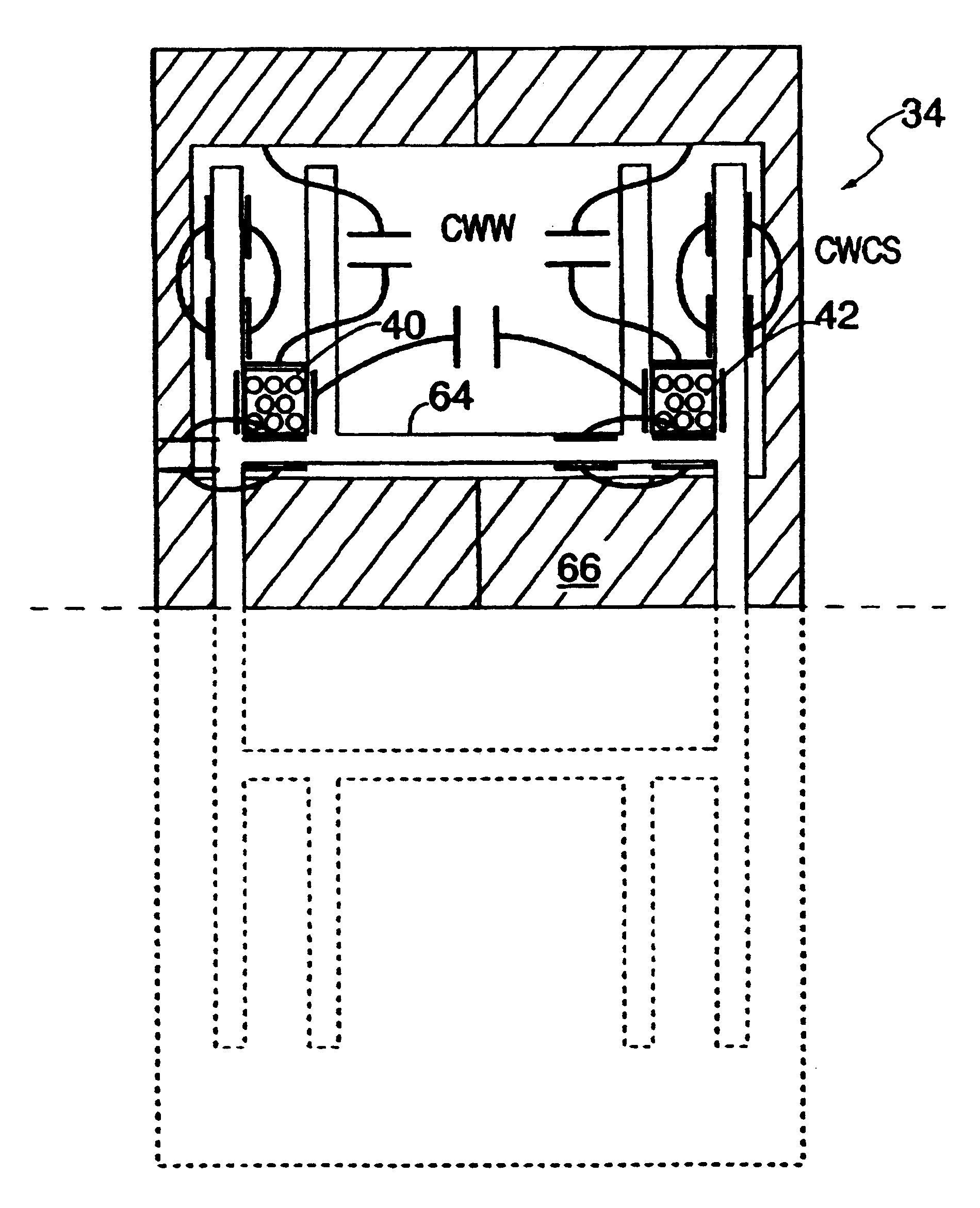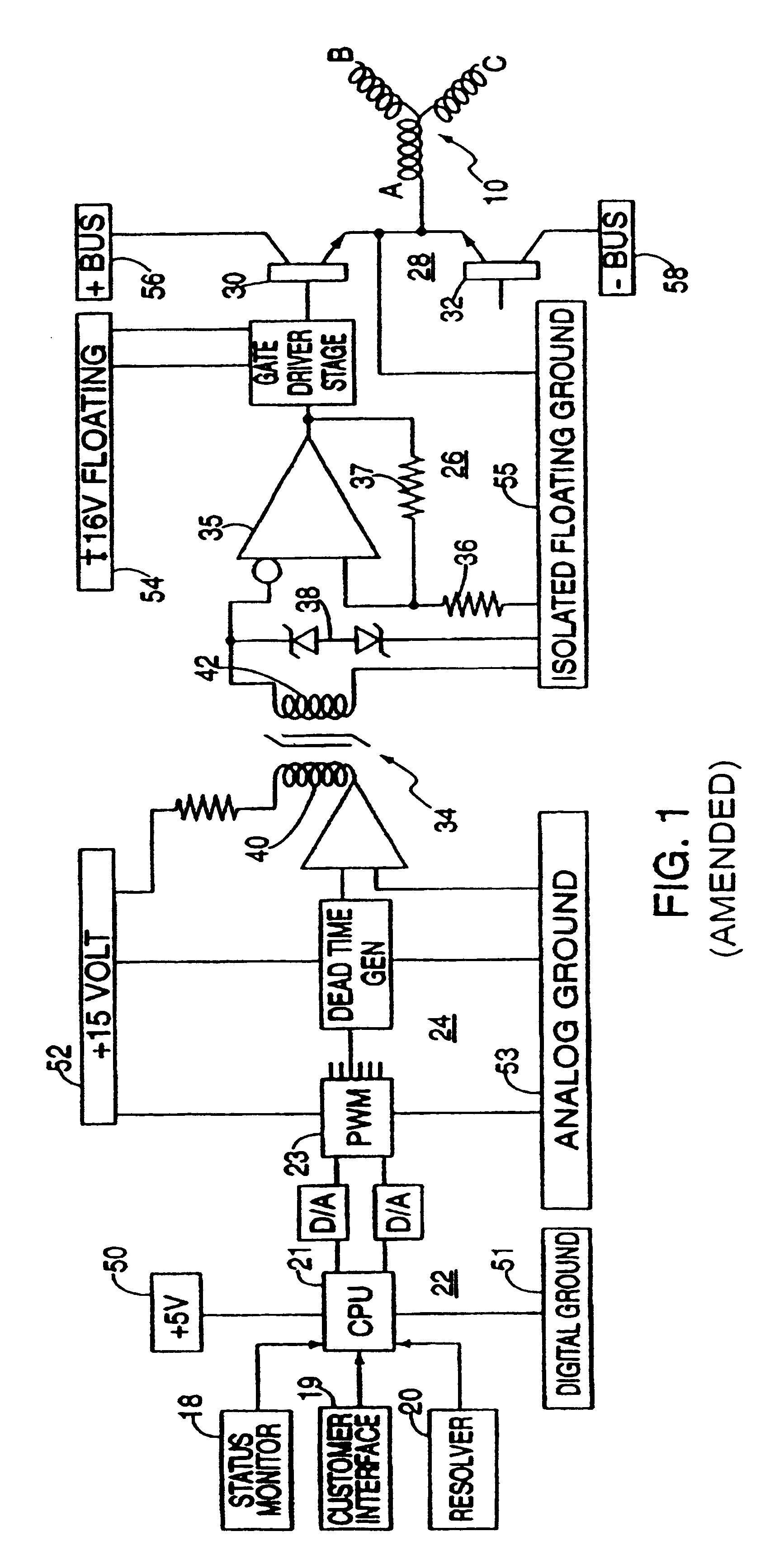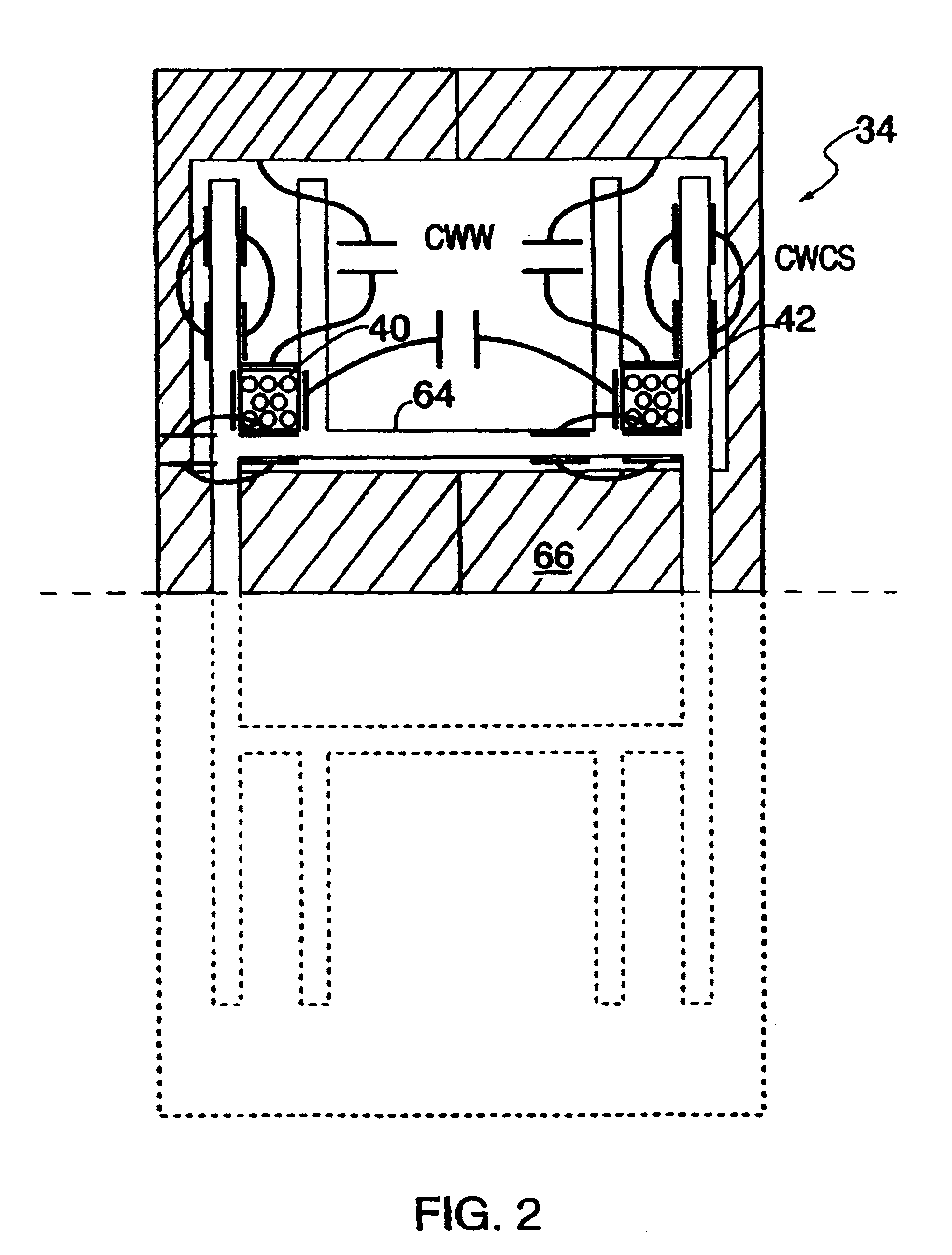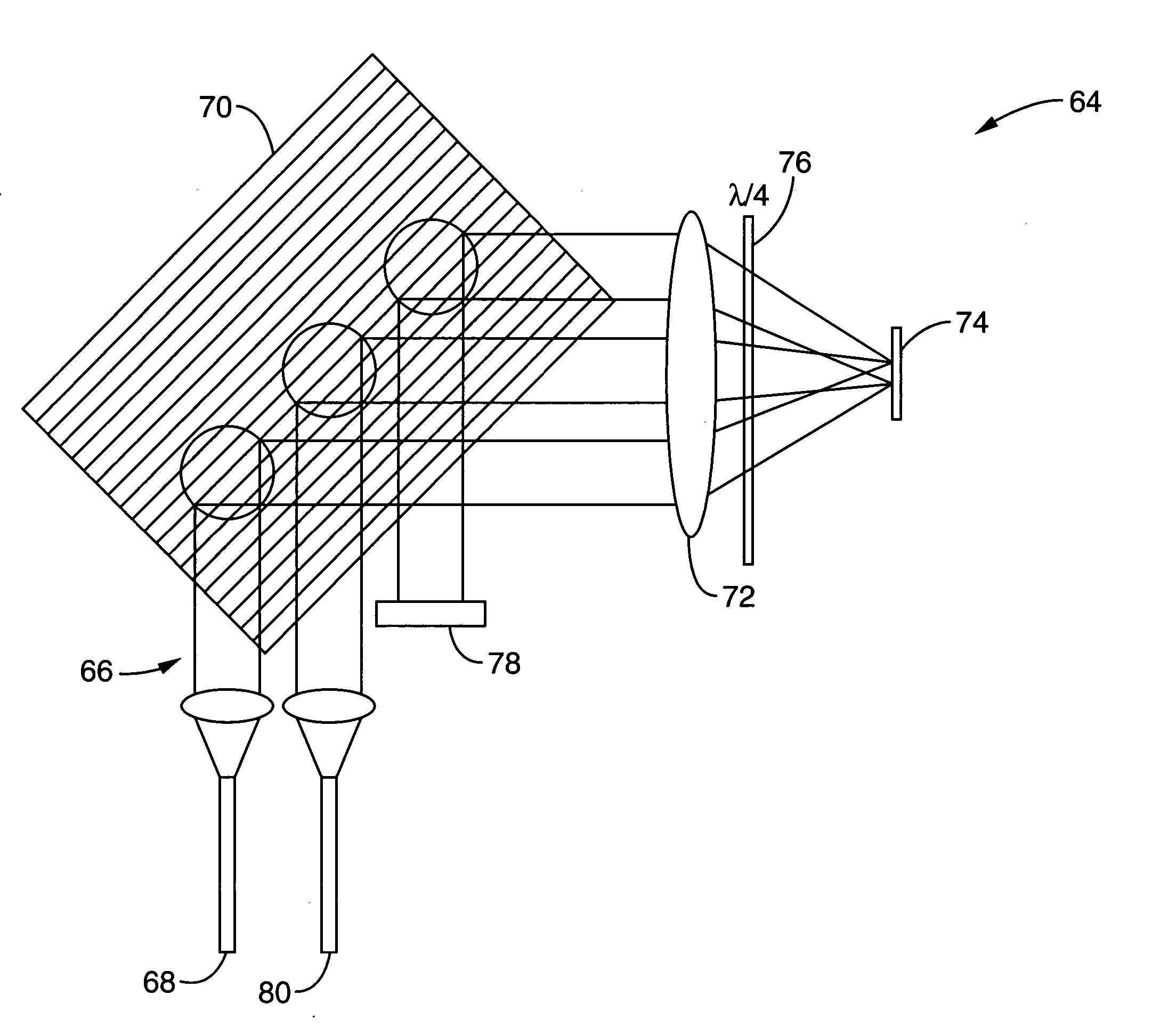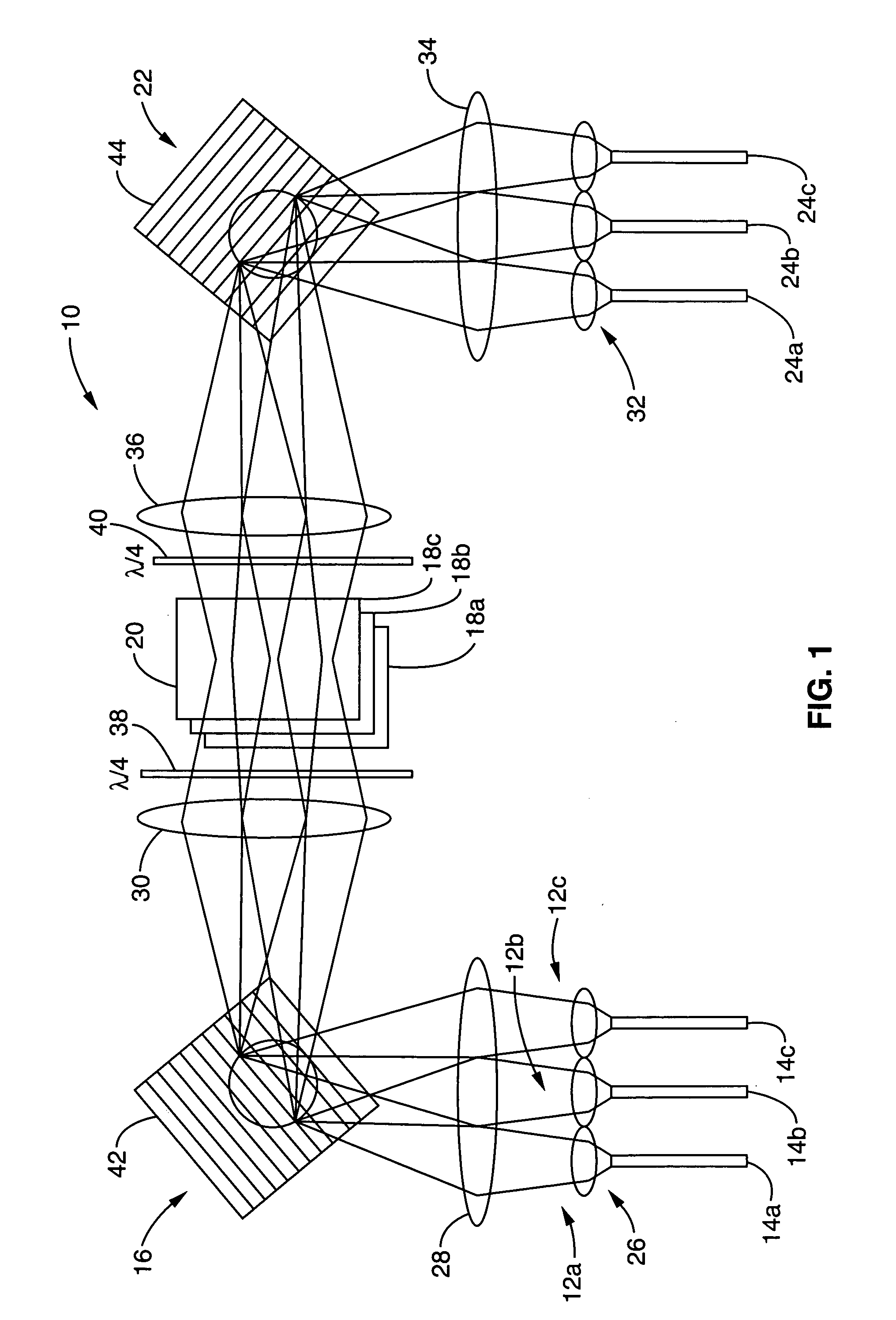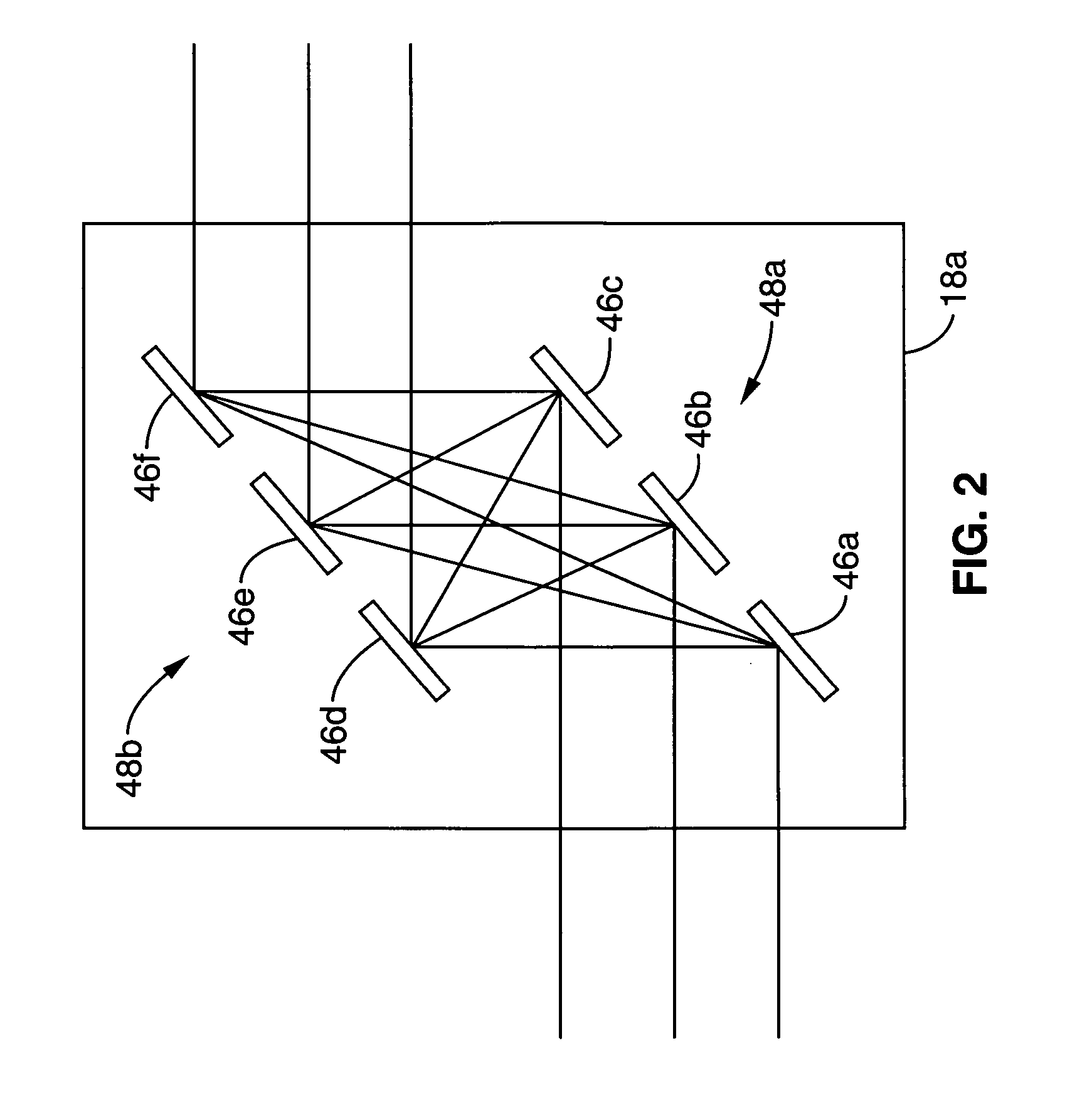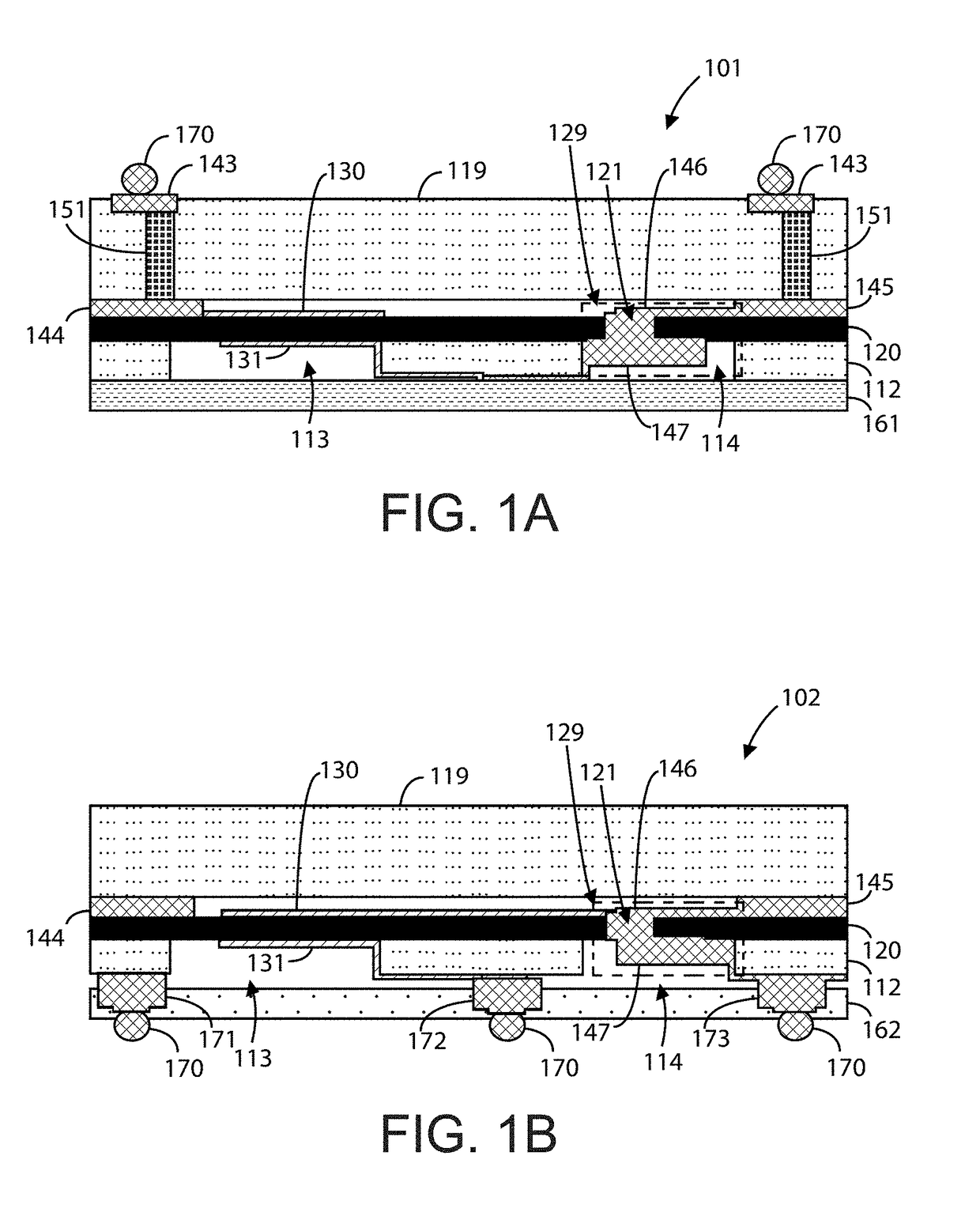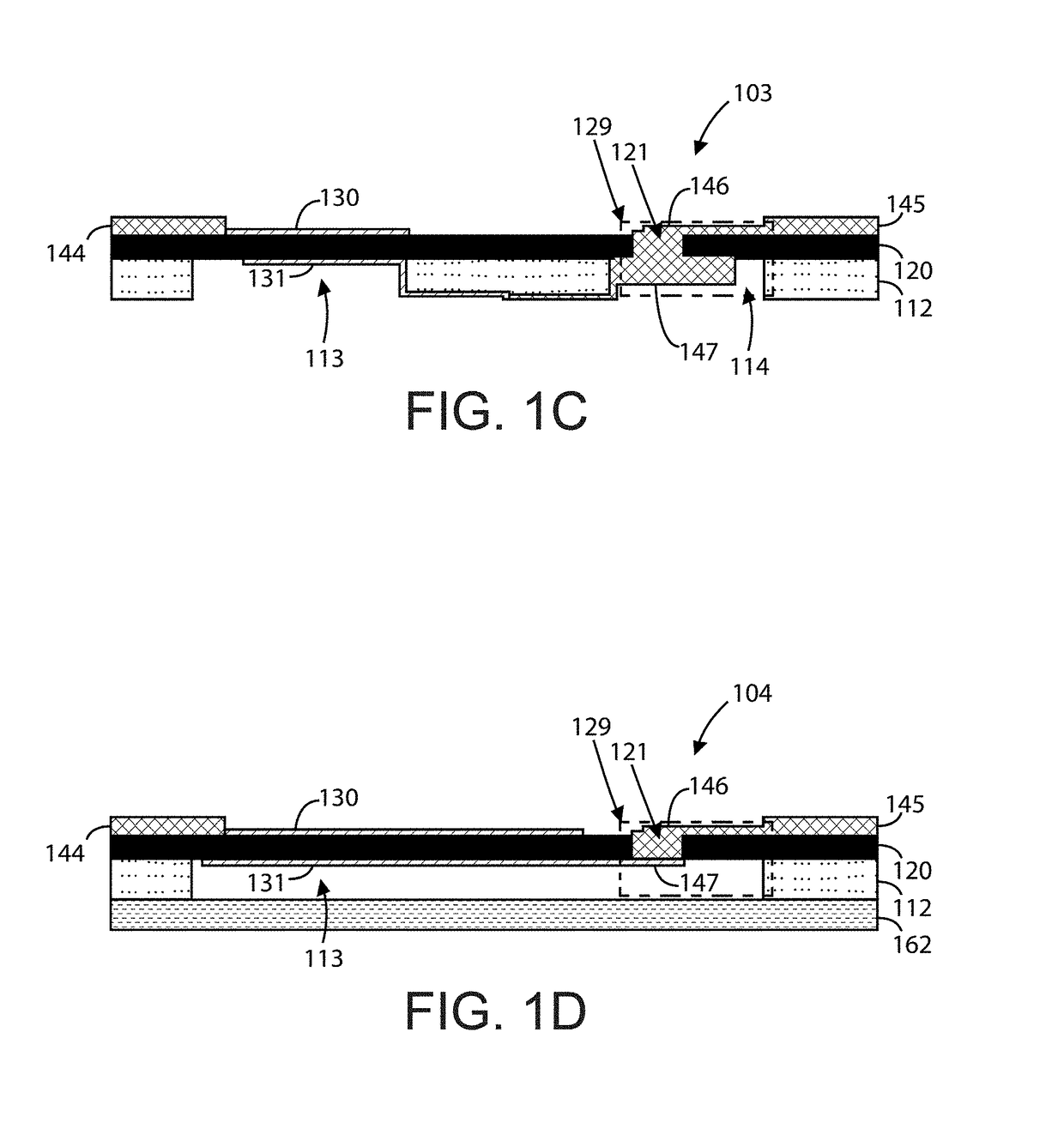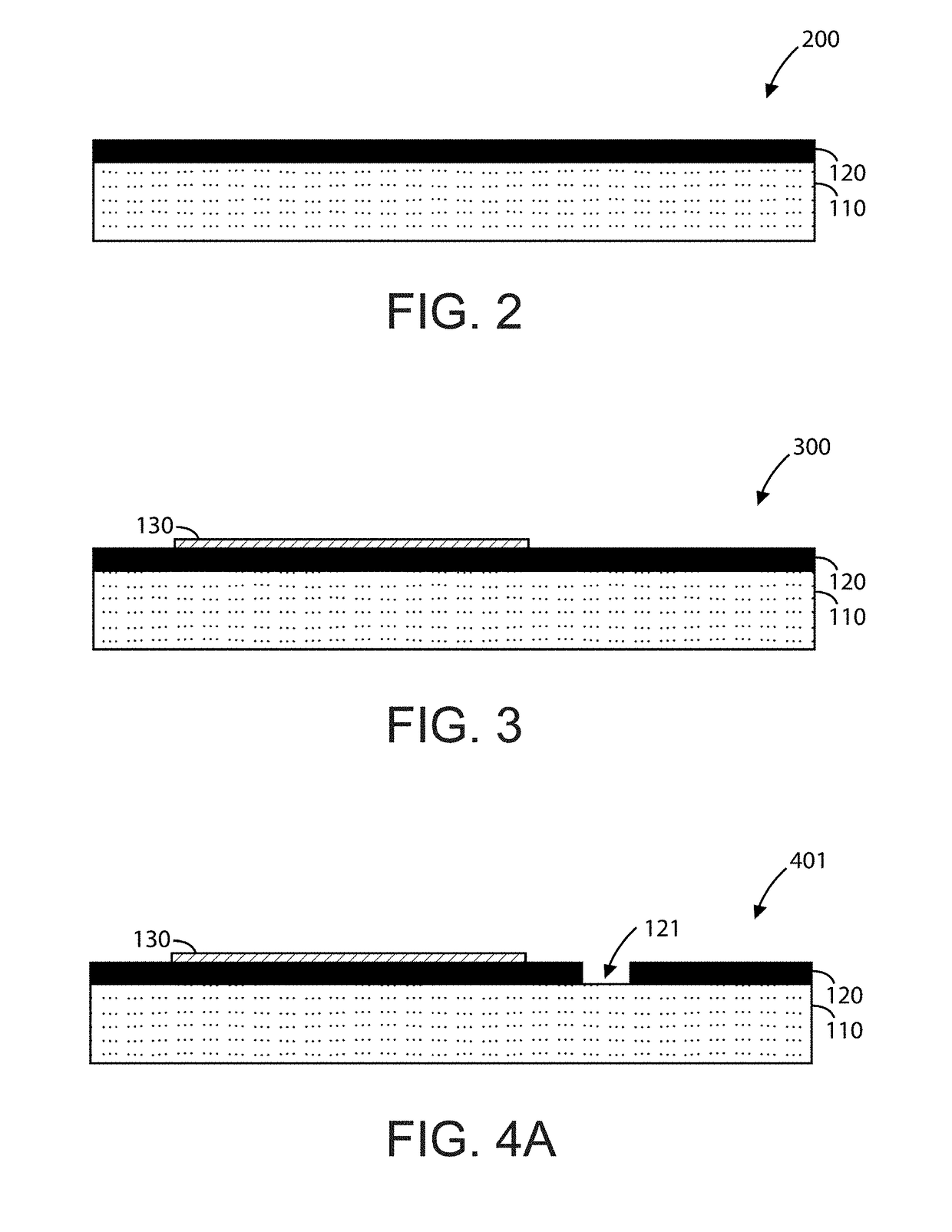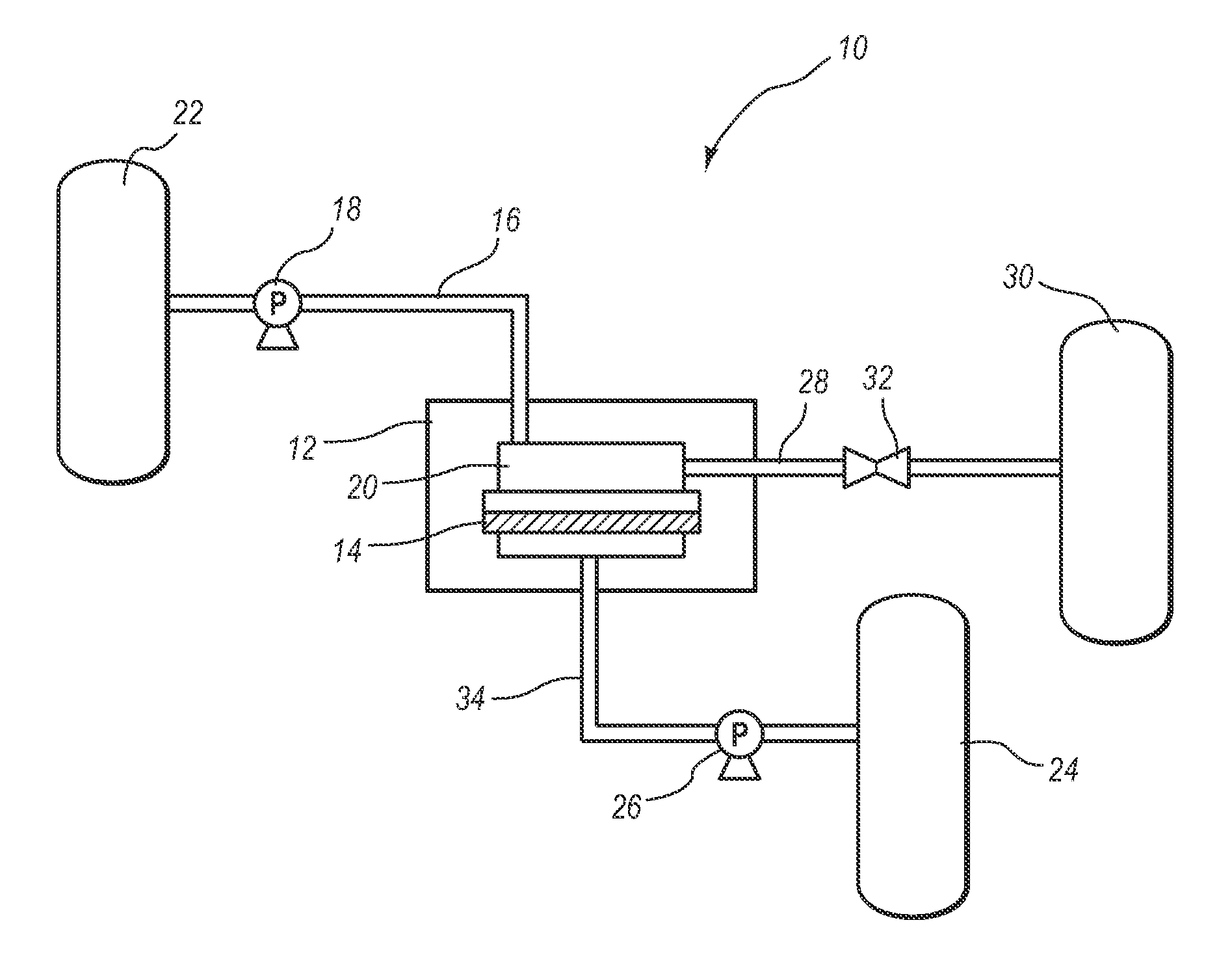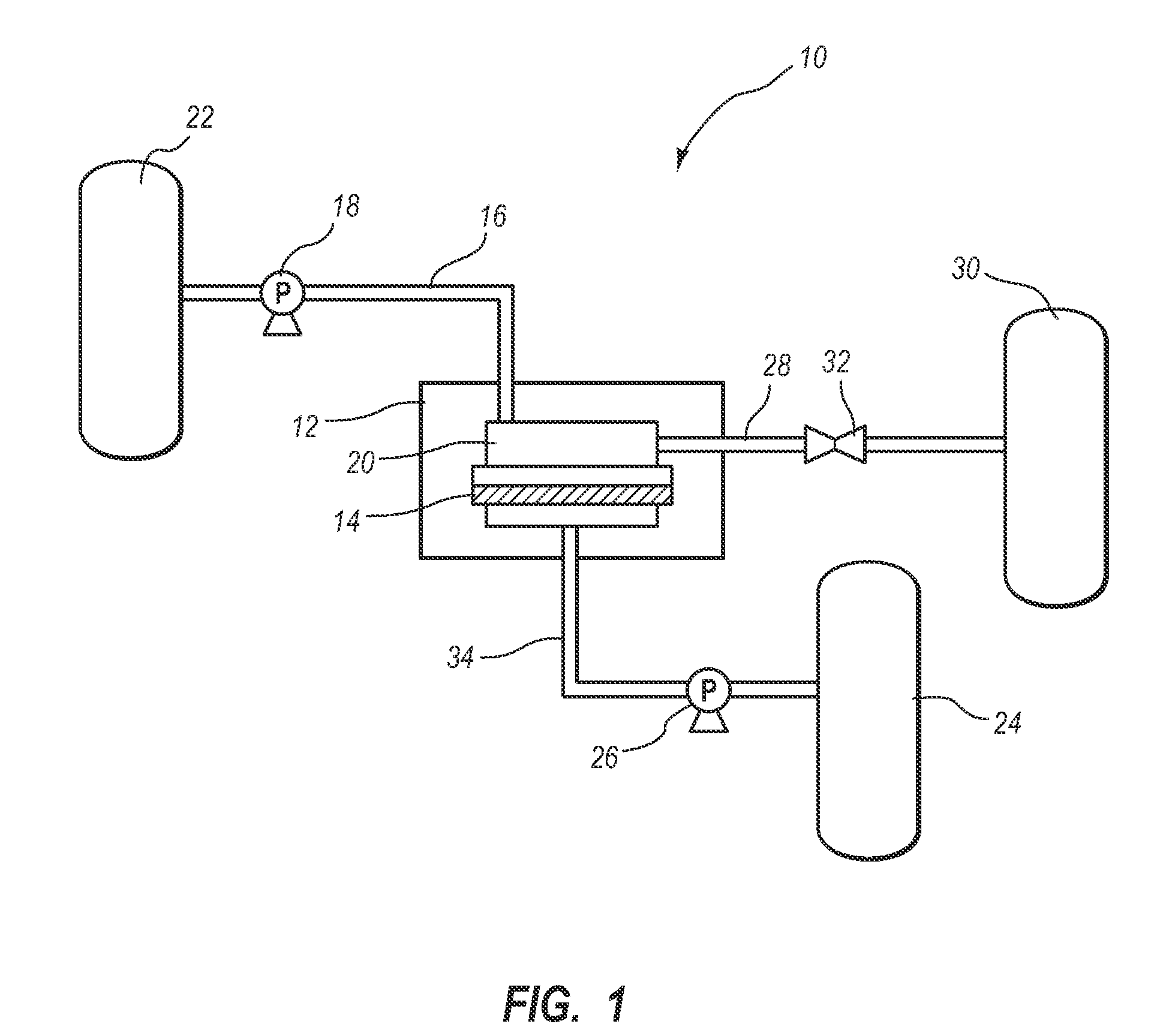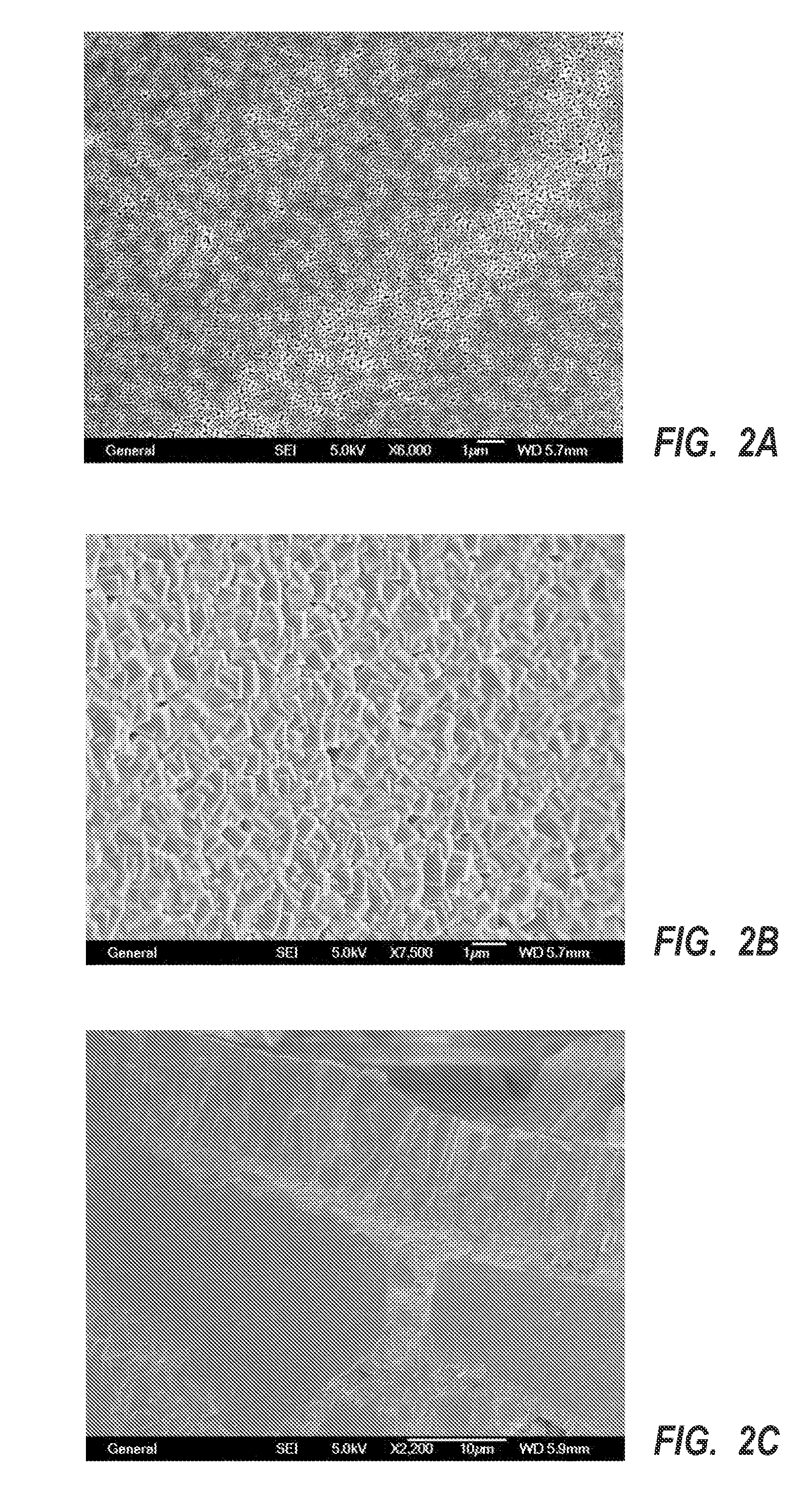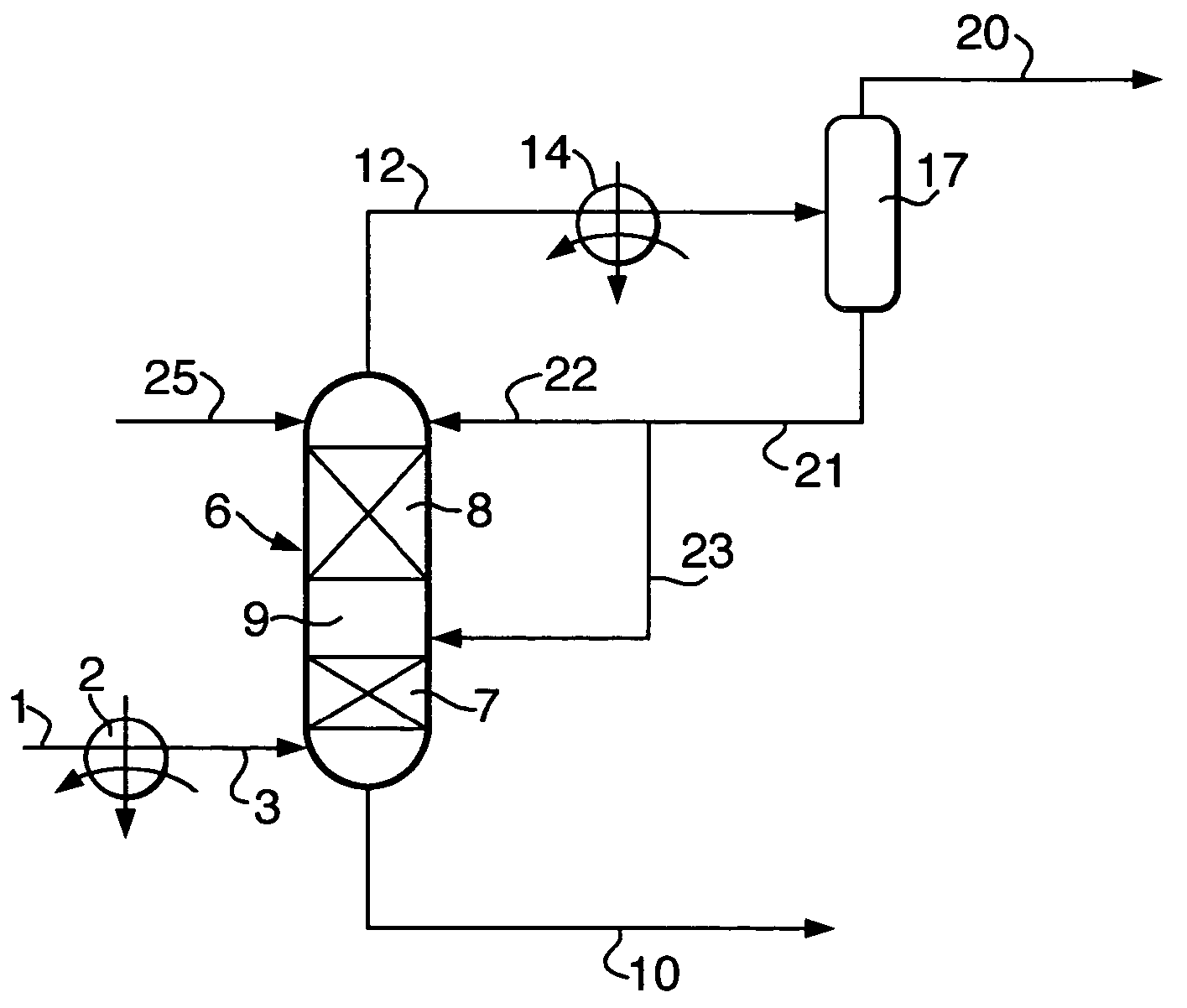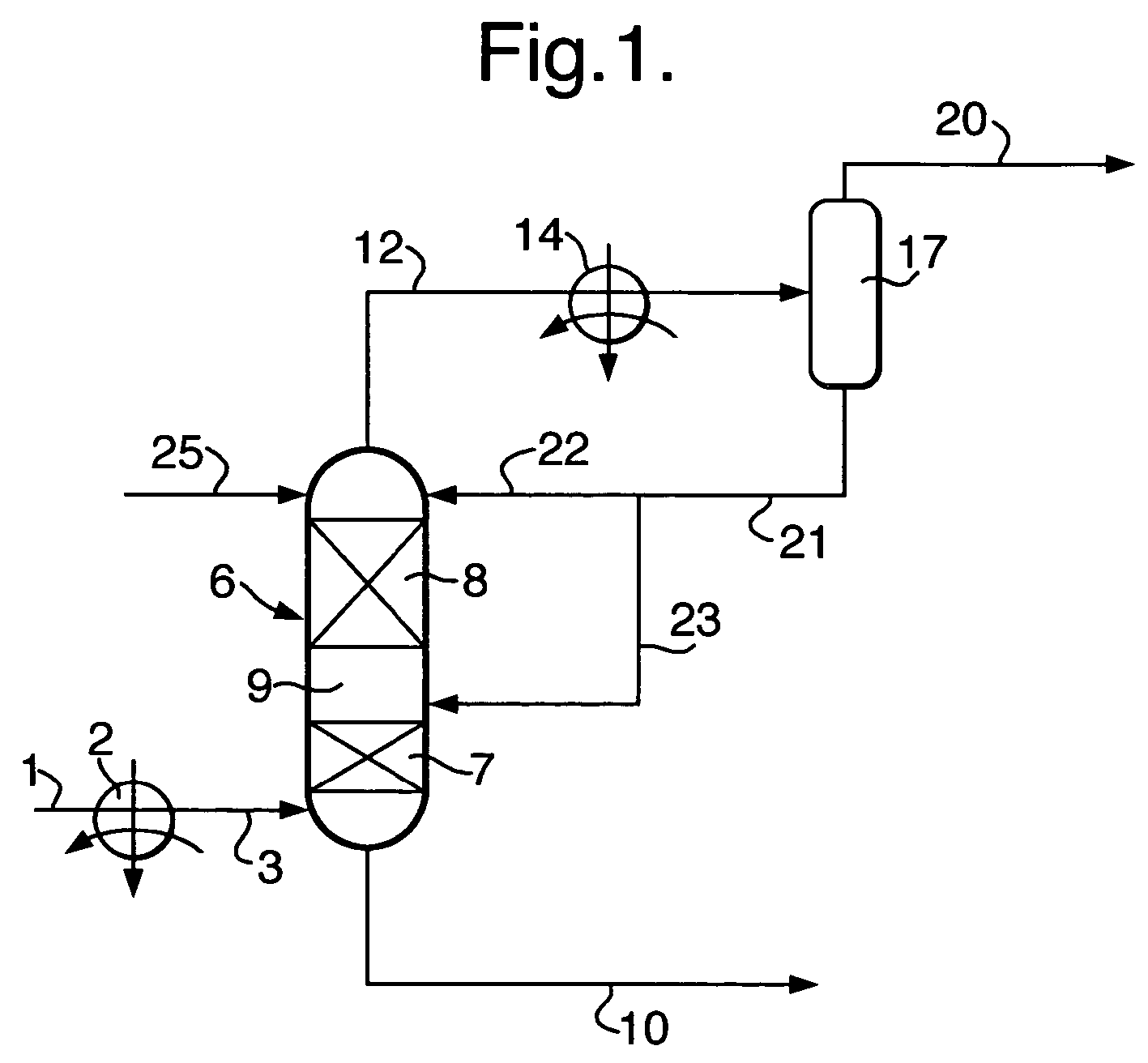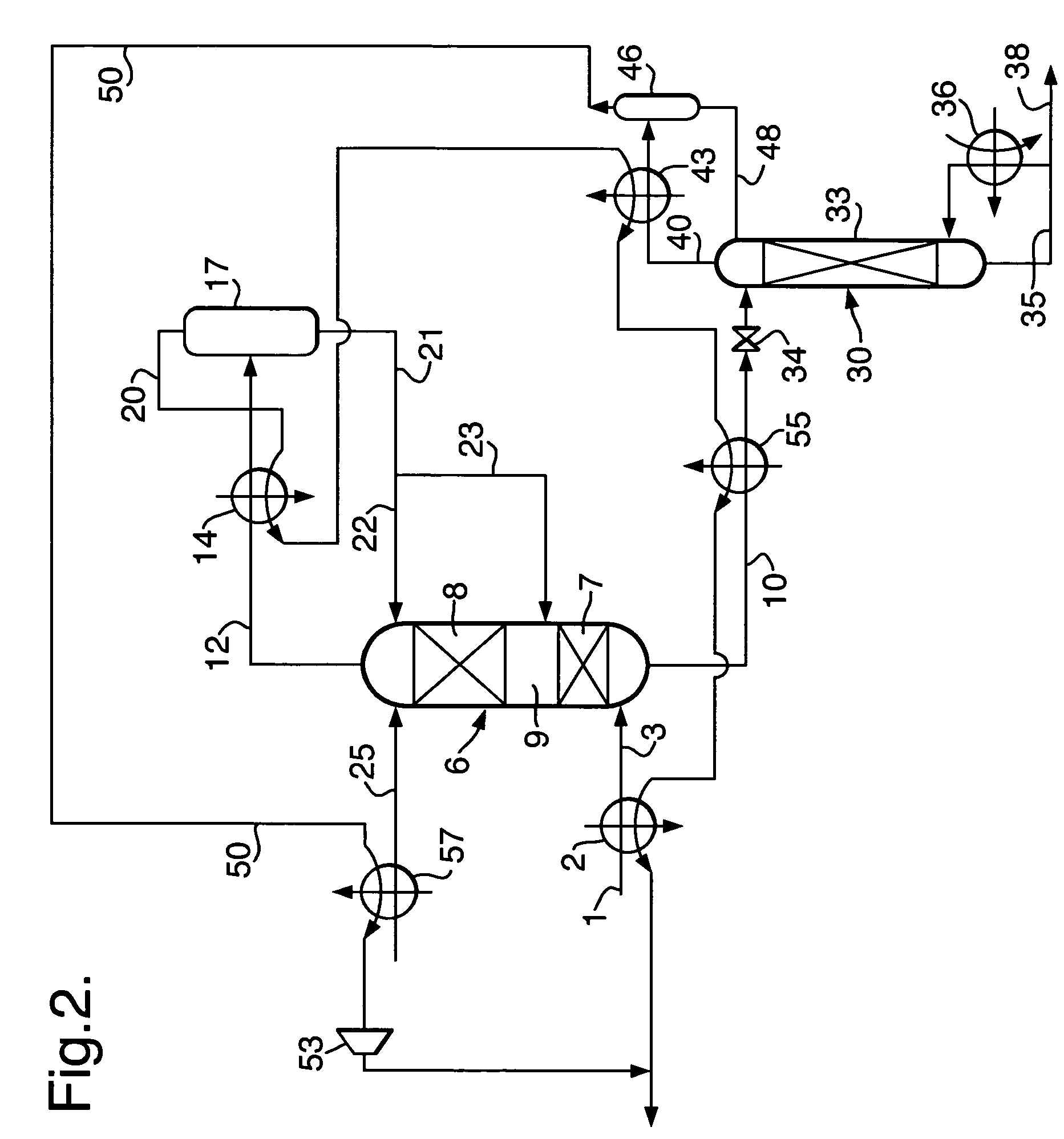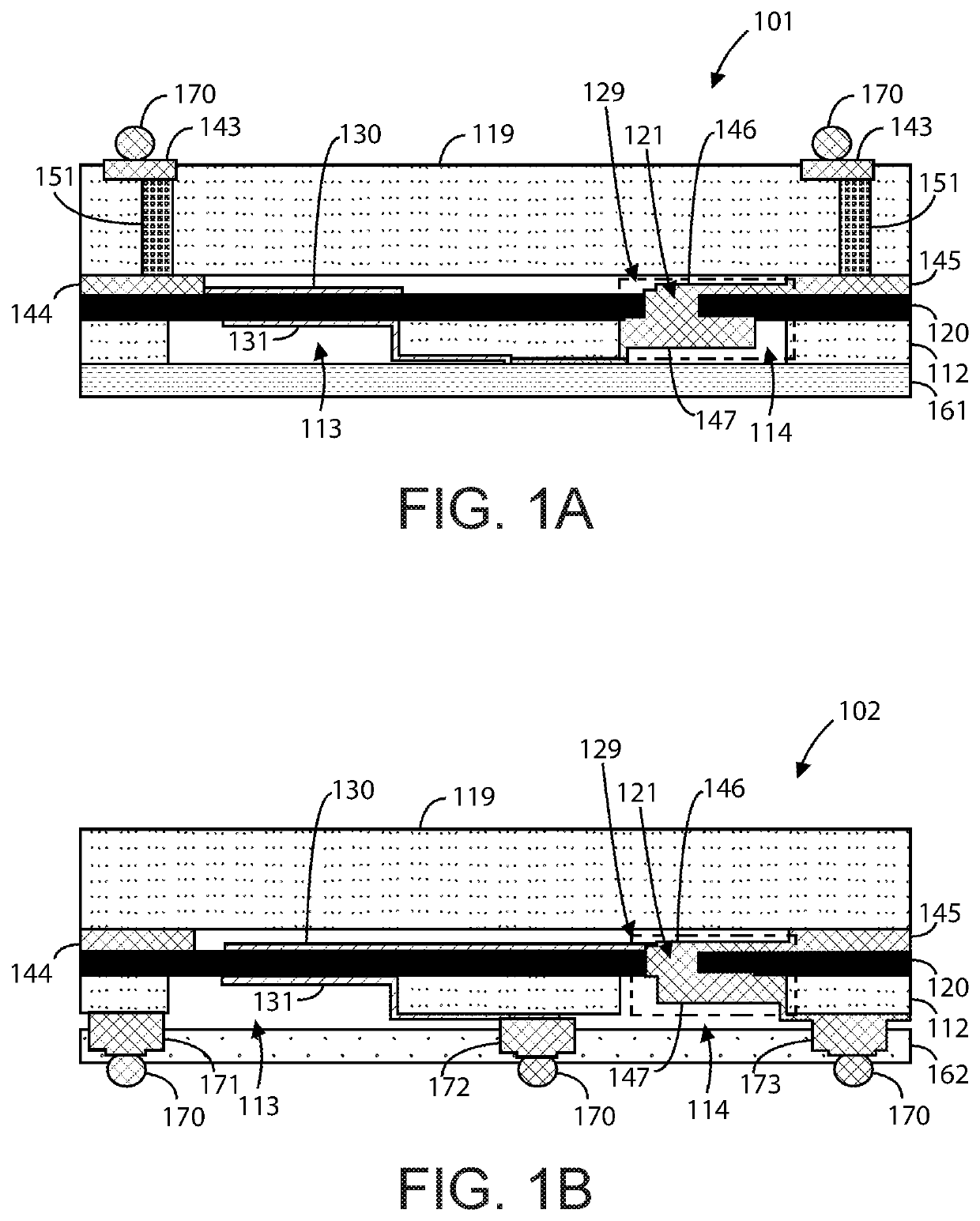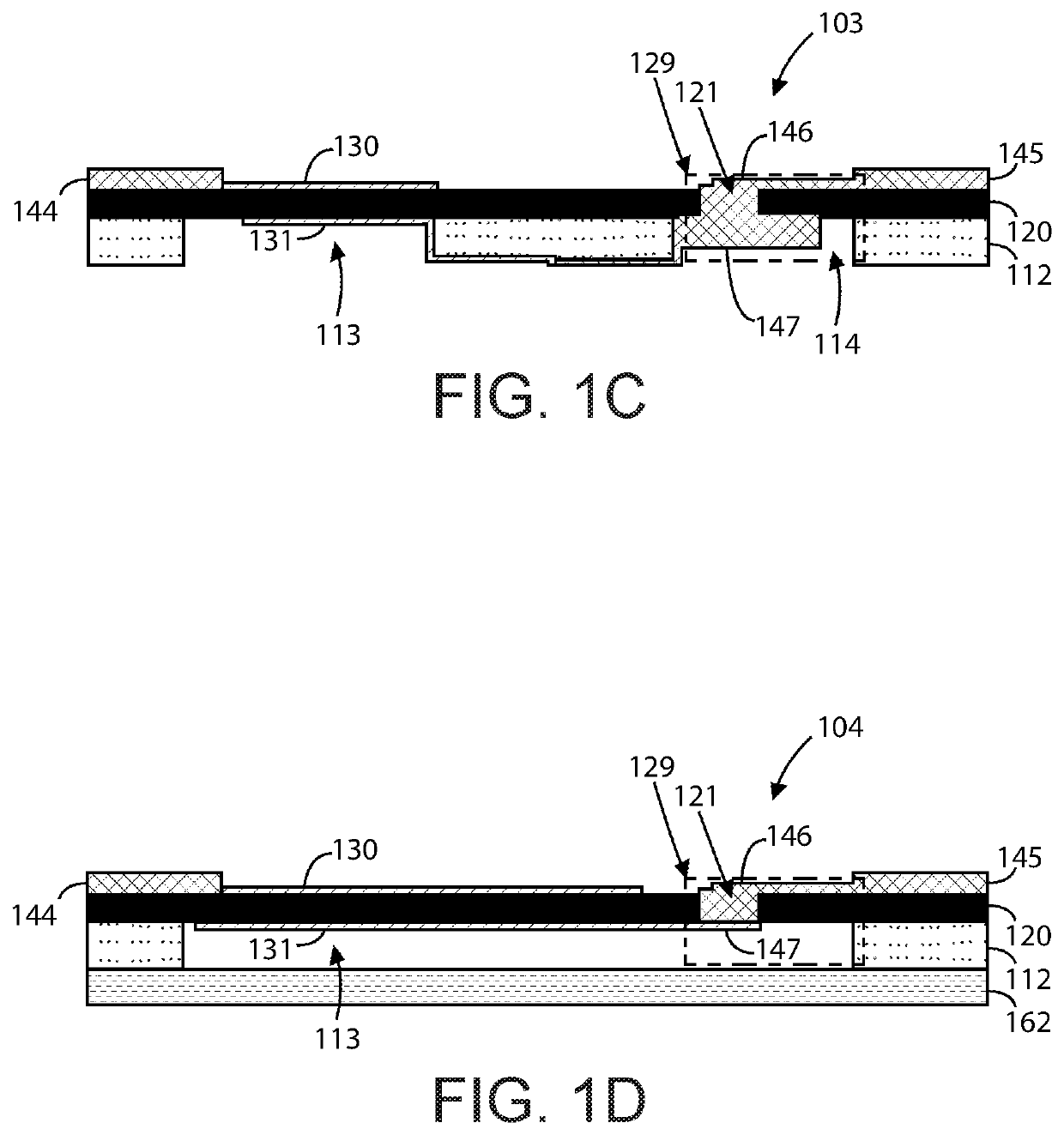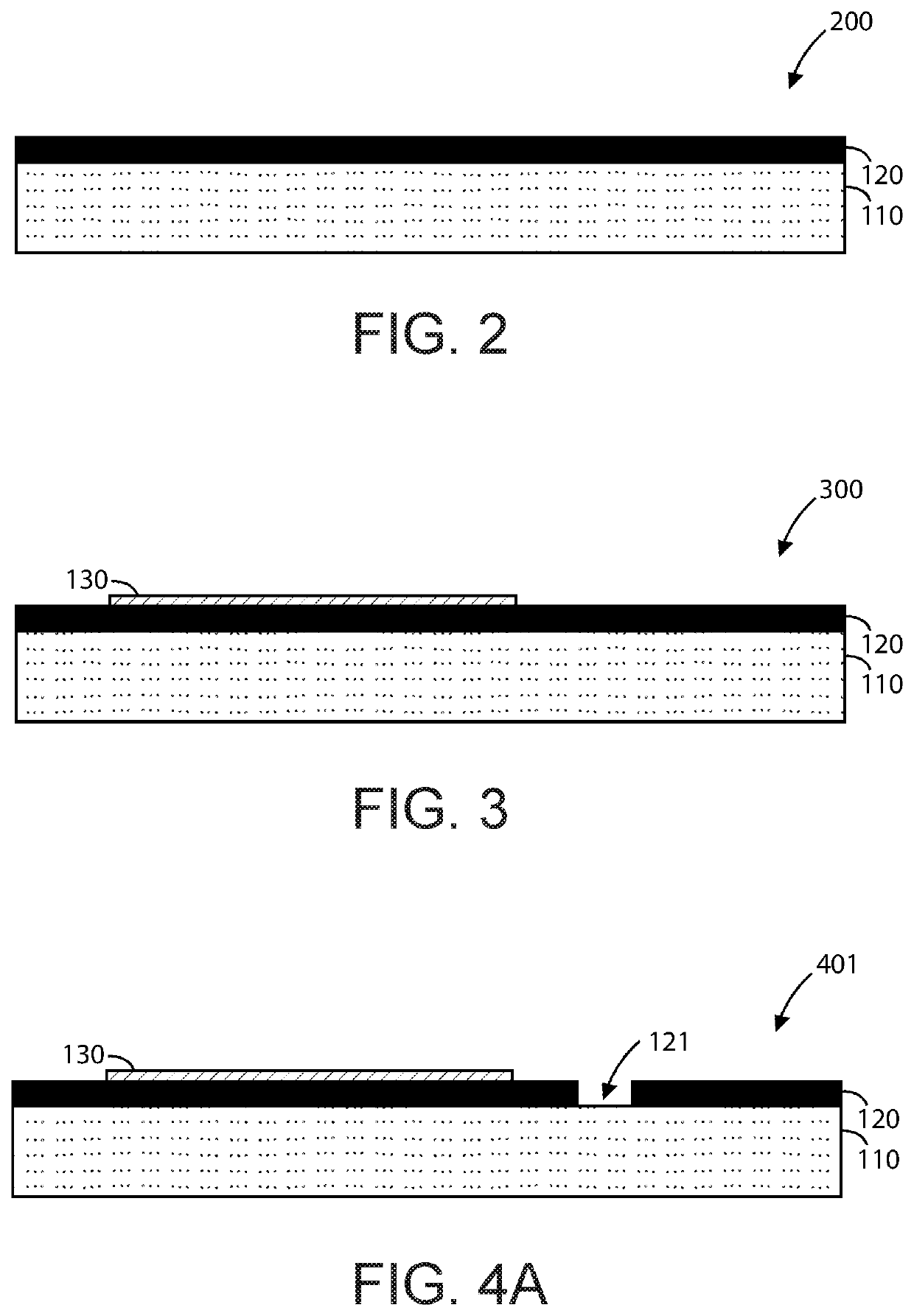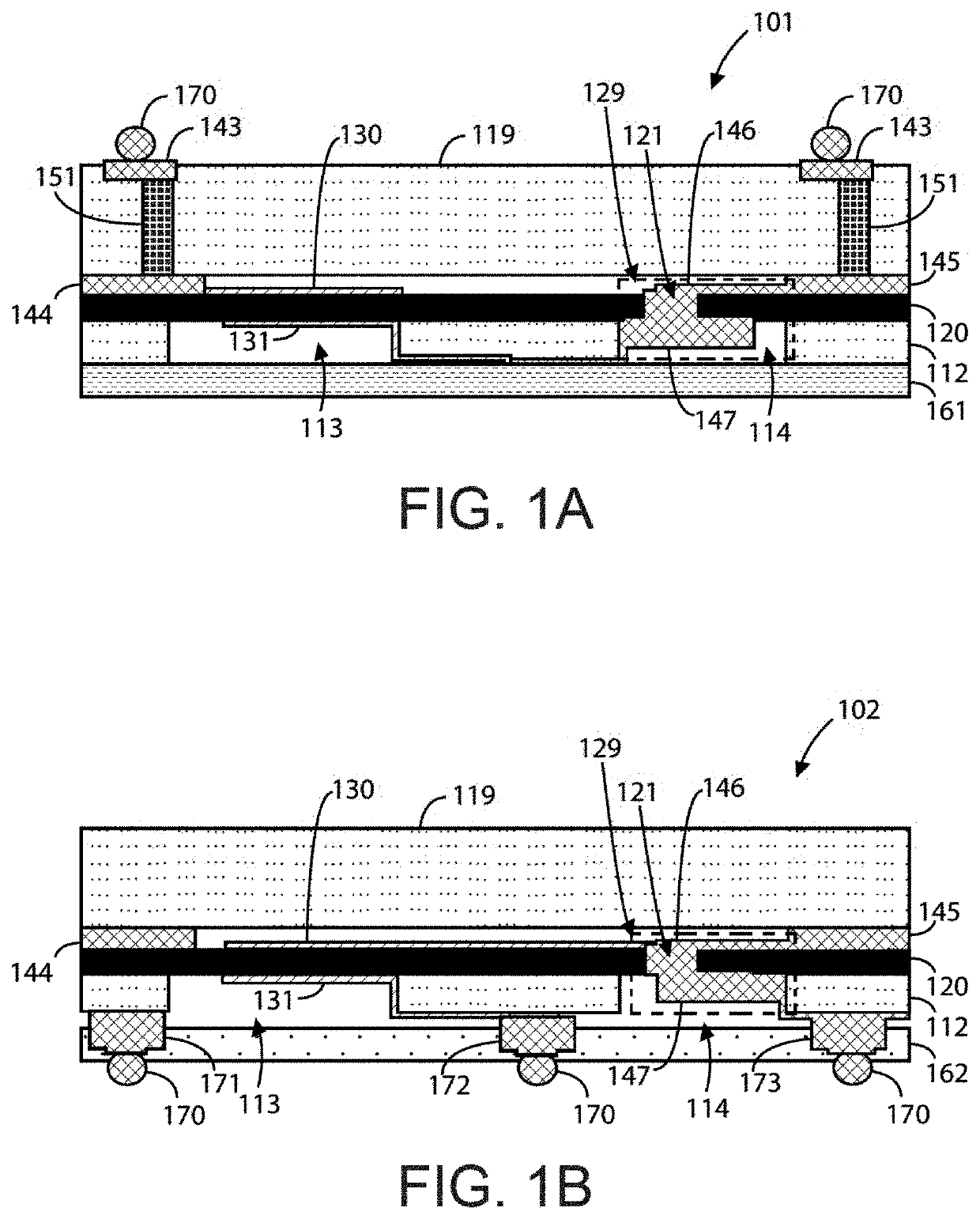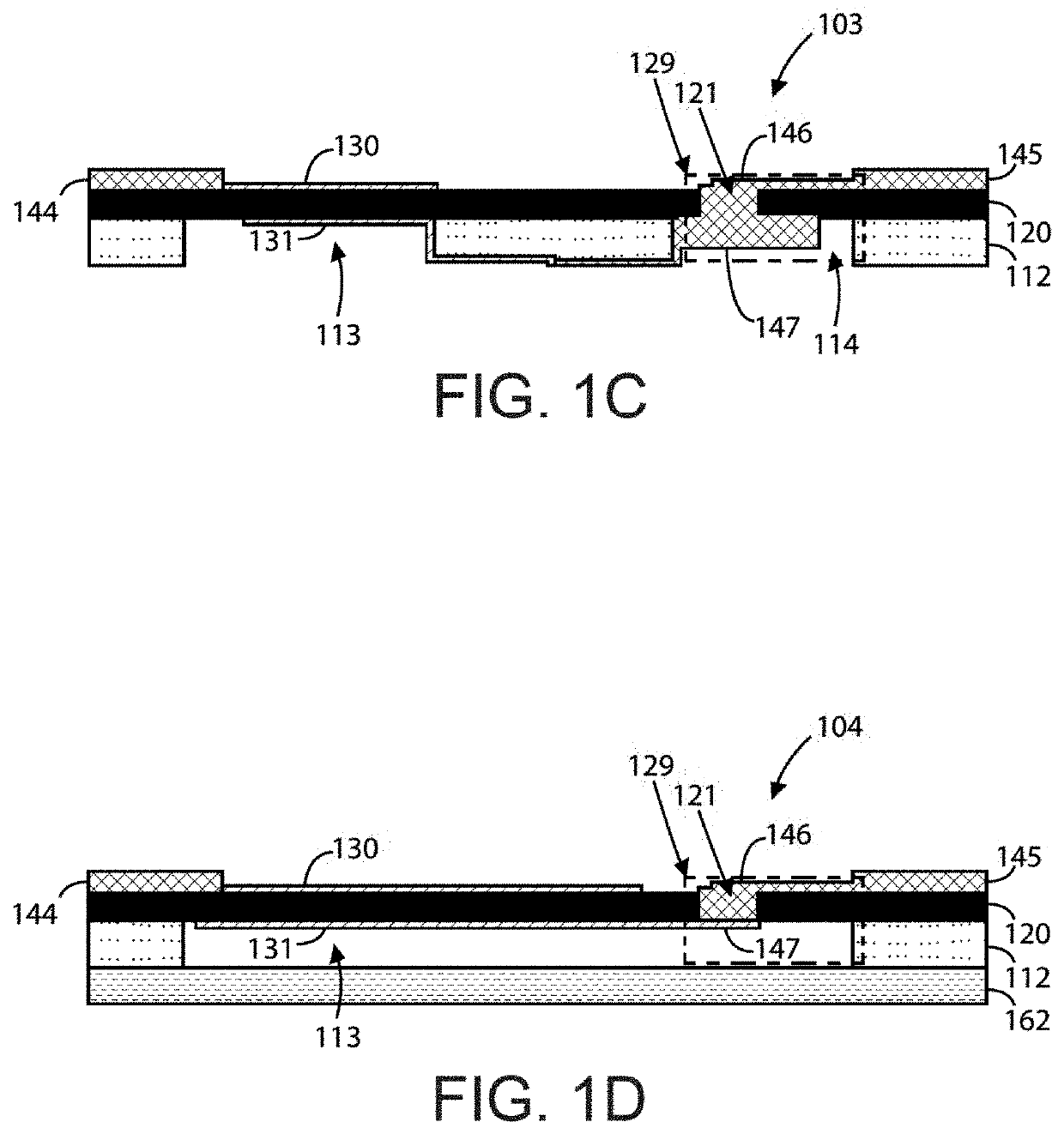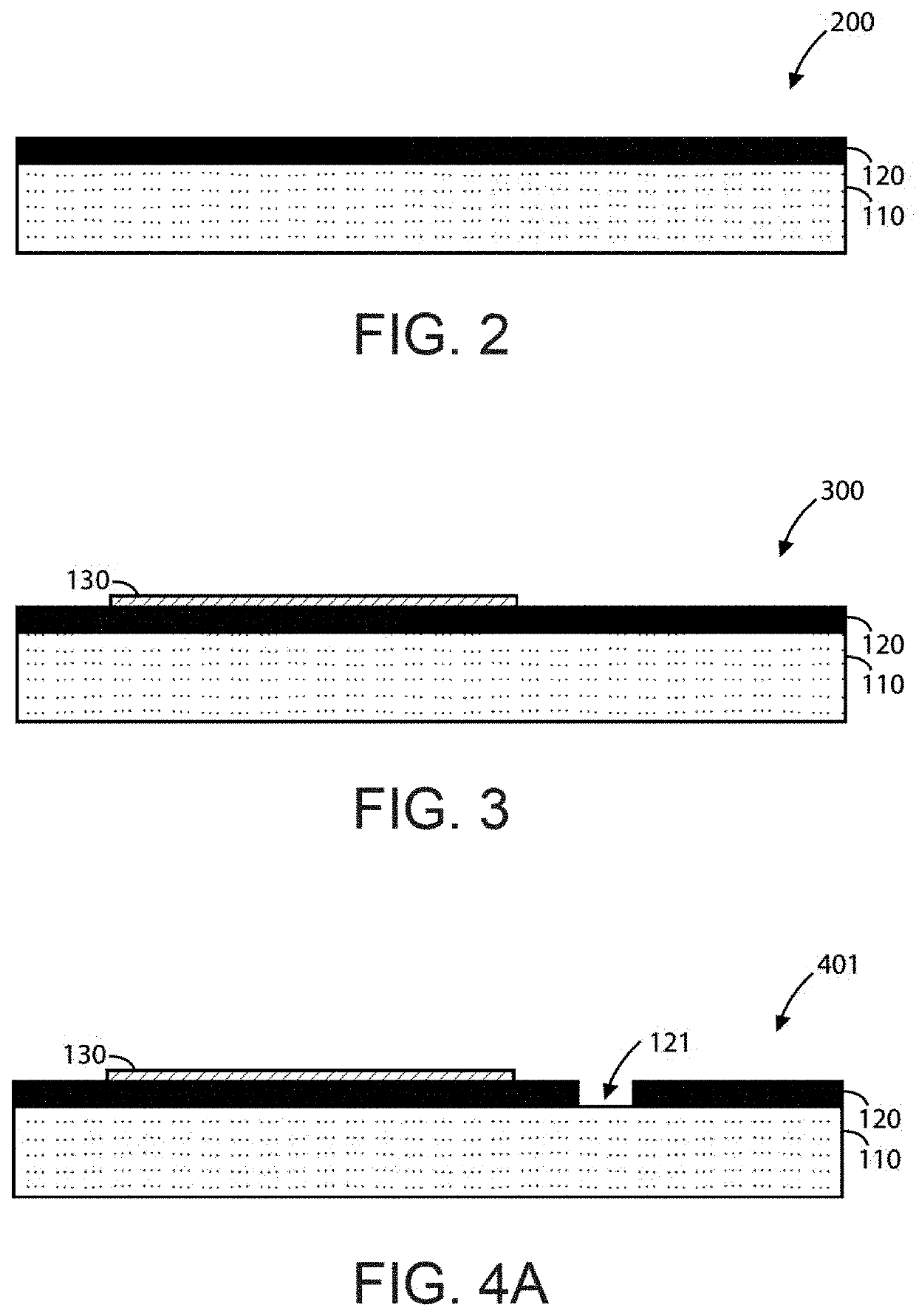Patents
Literature
90results about How to "High rejection" patented technology
Efficacy Topic
Property
Owner
Technical Advancement
Application Domain
Technology Topic
Technology Field Word
Patent Country/Region
Patent Type
Patent Status
Application Year
Inventor
Method and apparatus for reducing the effects of parasitic and galvanic currents in a resistivity measuring tool
InactiveUS6586939B1Reduce impactHigh rejectionElectric/magnetic detection for well-loggingAcoustic wave reradiationTransmitter coilCoupling
A transverse induction logging tool having a transmitter and receiver for downhole sampling of formation properties, the tool having a symmetrical shielded split-coil transmitter coil and a bucking coil interposed between the split transmitter coils to reduce coupling of the transmitter time varying magnetic field into the receiver. The tool provides symmetrical shielding of the coils and grounding at either the transmitter or receiver end only to reduce coupling of induced currents into the received signal. The tool provides an insulator between receiver electronics and the conductive receiver housing having contact with conductive wellbore fluid, to reduce parasitic current flowing in a loop formed by the upper housing, feed through pipe, lower housing and wellbore fluid adjacent the probe housing or mandrel. An internal verification loop is provided to track changes in transmitter current in the real and quadrature component of the received data signal. A galvanic electrode is housed in the same mandrel with the induction logging receiver and transmitter.
Owner:BAKER HUGHES HLDG LLC
Apparatus accurately measuring properties of a formation
InactiveUS6734675B2Reduce impactHigh rejectionElectric/magnetic detection for well-loggingMaterial strength using tensile/compressive forcesTransmitter coilCoupling
A transverse induction logging tool having a transmitter and receiver for downhole sampling of formation properties, the tool having a symmetrical shielded split-coil transmitter coil and a bucking coil interposed between the split transmitter coils to reduce coupling of the transmitter time varying magnetic field into the receiver. The tool provides symmetrical shielding of the coils and grounding at either the transmitter or receiver end only to reduce coupling of induced currents into the received signal. The tool provides an insulator between receiver electronics and the conductive receiver housing having contact with conductive wellbore fluid, to reduce parasitic current flowing in a loop formed by the upper housing, feed through pipe, lower housing and wellbore fluid adjacent the probe housing or mandrel. An internal verification loop is provided to track changes in transmitter current in the real and quadrature component of the received data signal. A galvanic electrode is housed in the same mandrel with the induction logging receiver and transmitter.
Owner:BAKER HUGHES HLDG LLC
Apparatus and method for measuring the signal from a fluorescing nanodrop contained by surface tension
InactiveUS7397036B2Reduce dispersionHigh rejectionRadiation pyrometrySpectrum investigationTE bufferFluorescence
Apparatus and method for measuring the fluorescence of nanodrop liquid samples is described in which the sample is held by surface tension between two anvil surfaces. Each anvil surface has an embedded optical fiber with its end finished flush with the surface in the containment area wetted by the sample with the fiber in line. Sample excitation is provided from the side of the sample remote from the containment area. By selection of the fiber transmission numeric aperture the impact of exciting and ambient light on the measurement is minimized. A method of virtual filtering is taught in which any ambient or exciting light that does impinge on the measuring sensor is corrected by subtracting a scaled representation of the source from the measurement. The method and apparatus is capable of detecting 1 femptomole of sodium fluorescein in 1 microliter of TE buffer.
Owner:NANODROP TECH LLC
Apparatus accurately measuring properties of a formation
InactiveUS20030090269A1Reduce impactHigh rejectionElectric/magnetic detection for well-loggingAcoustic wave reradiationInduction loggingEngineering
A transverse induction logging tool having a transmitter and receiver for downhole sampling of formation properties, the tool having a symmetrical shielded split-coil transmitter coil and a bucking coil interposed between the split transmitter coils to reduce coupling of the transmitter time varying magnetic field into the receiver. The tool provides symmetrical shielding of the coils and grounding at either the transmitter or receiver end only to reduce coupling of induced currents into the received signal. The tool provides an insulator between receiver electronics and the conductive receiver housing having contact with conductive wellbore fluid, to reduce parasitic current flowing in a loop formed by the upper housing, feed through pipe, lower housing and wellbore fluid adjacent the probe housing or mandrel. An internal verification loop is provided to track changes in transmitter current in the real and quadrature component of the received data signal. A galvanic electrode is housed in the same mandrel with the induction logging receiver and transmitter.
Owner:BAKER HUGHES INC
Tunable quantum cascade lasers and photoacoustic detection of trace gases, TNT, TATP and precursors acetone and hydrogen peroxide
ActiveUS7903704B2High rejectionShorten the timeMaterial analysis by optical meansOptical resonator shape and constructionQuantum cascade laserPeroxide
Methods and apparatus for broad tuning of single wavelength quantum cascade lasers and the use of light output from such lasers for highly sensitive detection of trace gases such as nitrogen dioxide, acetylene, and vapors of explosives such as trinitrotoluene (TNT) and triacetone triperoxide (TATP) and TATP's precursors including acetone and hydrogen peroxide. These methods and apparatus are also suitable for high sensitivity, high selectivity detection of other chemical compounds including chemical warfare agents and toxic industrial chemicals. A quantum cascade laser (QCL) system that better achieves single mode, continuous, mode-hop free tuning for use in L-PAS (laser photoacoustic spectroscopy) by independently coordinating gain chip current, diffraction grating angle and external cavity length is described. An all mechanical method that achieves similar performance is also described. Additionally, methods for improving the sensor performance by critical selection of wavelengths are presented.
Owner:DAYLIGHT SOLUTIONS
Disk drive using a disturbance sensor for disturbance frequency-identification and suppression
InactiveUS20070183076A1High rejectionDriving/moving recording headsRecord information storageFeedback controllerPeak value
A magnetic recording disk drive has a disturbance sensor and a disturbance frequency identifier that are used to adjust the frequency of a peak filter as the disturbance frequency changes. The sensor and the frequency identifier are separate from the servo control loop and thus do not rely on the head position error signal (PES) to predict the disturbance frequency. The adjustable peak filter is coupled in parallel with the servo feedback controller. The peak filter modifies the open loop transfer function and the error rejection function of the servo control loop to provide a higher rejection at the identified frequency. The peak filter may be switched out of or uncoupled from the servo feedback controller during track-seeking or as desired, depending on the amplitude of the sensor signal or the amplitude of the PES.
Owner:WESTERN DIGITAL TECH INC
Bituminous froth inclined plate separator and hydrocarbon cyclone treatment process
InactiveUS20060249439A1Low costReduce componentsReversed direction vortexOther chemical processesCycloneProcess engineering
Discloses apparatus to perform a process to remove water and minerals from a bitumen froth output of a oil sands hot water extraction process. A bitumen froth feed stream is diluted with a solvent and supplied to a primary inclined plate separator stage, which separates the bitumen into an overflow stream providing a bitumen product output from the circuit and a bitumen depleted underflow stream. A primary cyclone state, a secondary inclined plate separator stage and a secondary cyclone stage further process the underflow stream to produce a secondary bitumen recovery product stream and a recycle stream. The secondary bitumen recovery product stream is incorporated into and becomes part of the circuit bitumen product output stream. The recycle stream is incorporated into the bitumen froth feed stream for reprocessing by the circuit.
Owner:SUNCOR ENERGY INC
Multi-wavelength cross-connect optical switch
InactiveUS6922239B2High performance featuresReduce lossMultiplex system selection arrangementsRadiation pyrometryFiberGrating
A cross-connect switch for fiber-optic communication networks employing a wavelength dispersive element, such as a grating, and a stack of regular (non-wavelength selective) cross bar switches using two-dimensional arrays of micromachined, electrically actuated, individually-tiltable, controlled deflection micro-mirrors for providing multiport switching capability for a plurality of wavelengths. Using a one-dimensional micromirror array, a fiber-optic based MEMS switched spectrometer that does not require mechanical motion of bulk components or large diode arrays can be constructed with readout capability for WDM network diagnosis or for general purpose spectroscopic applications.
Owner:RGT UNIV OF CALIFORNIA
Modified thin film composite reverse osmosis membrane and a process for preparation thereof
ActiveUS20150290595A1Improved resistant to foulingReduce pollutionMembranesSeawater treatmentUltrafiltrationHigh flux
The present invention relates to a complete process for preparation of high flux and salt rejection thin film composite (TFC) reverse osmosis (RO) membrane including process for preparation of support membrane for thin film, process for thin film coating of support membrane by in-situ interfacial polymerization between diamines and trimesoyl chloride, machine design, chemistry and details of process (engineering+chemistry+ambient) parameter at 1×100 sqm scale upgradable to a scale even 10-20 times higher. The produced membrane is characterized by 96% salt rejection and 48 LM-2H 1 flux with 2000 ppm sodium chloride solution at 250 psi pressure and 95% salt rejection and 46 LM2H 1 flux with 35000 ppm sodium chloride solution at 900 psi pressure. The present invention also relates to complete machine design for PSF ultrafiltration membrane casting and coating for TFC membrane production at commercial level.
Owner:COUNCIL OF SCI & IND RES
Lamb wave resonator
ActiveUS20090102316A1Easy to useHigh quality factorPiezoelectric/electrostriction/magnetostriction machinesImpedence networksResonanceResonator
A Lamb wave resonator includes a piezoelectric layer, and a first electrode against a first face of the piezoelectric layer. The first electrode includes fingers and a contact arm, with each finger including a first side in contact with the contact arm and two other sides parallel to one another. Portions of the piezoelectric layer are at least partially etched between the two fingers to form a recess. The fingers are spaced apart from one another by a distance W calculated according to the following equation:W=n·valateralf,withn∈Nwhere,valateral is an acoustic propagation speed of Lamb waves,n is an order of a resonance mode of the Lamb waves,f is a resonance frequency of the Lamb wave resonator.
Owner:CENT NAT DE LA RECHERCHE SCI +1
Membrane fabrication methods using organosilica materials and uses thereof
ActiveUS20160168485A1High rejectionTunable surface propertiesCatalytic naphtha reformingSolid sorbent liquid separationAlkoxy groupActive site
Methods for fabricating a membrane with an organosilica material which is a polymer comprising independent units of Formula [Z3Z4SiCH2]3 (I), wherein each Z3 represents a hydroxyl group, a C1-C4 alkoxy group or an oxygen atom bonded to a silicon atom of another unit or an active site on the support and each Z4 represents a hydroxyl group, a C1-C4 alkoxy group, a C1-C4 alkyl group, an oxygen atom bonded to a silicon atom of another unit or an active site on the support are provided. Methods of removing a contaminant from a hydrocarbon stream are also provided.
Owner:EXXON RES & ENG CO
Lamb wave resonator
ActiveUS7868517B2Easy to useHigh quality factorImpedence networksPiezoelectric/electrostriction/magnetostriction machinesResonanceResonator
A Lamb wave resonator includes a piezoelectric layer, and a first electrode against a first face of the piezoelectric layer. The first electrode includes fingers and a contact arm, with each finger including a first side in contact with the contact arm and two other sides parallel to one another. Portions of the piezoelectric layer are at least partially etched between the two fingers to form a recess. The fingers are spaced apart from one another by a distance W calculated according to the following equation:W=n·valateralf,withn∈Nwhere,valateral is an acoustic propagation speed of Lamb waves,n is an order of a resonance mode of the Lamb waves,f is a resonance frequency of the Lamb wave resonator.
Owner:CENT NAT DE LA RECHERCHE SCI +1
Method of solvent recovery from a dilute solution
ActiveUS20160339390A1Reduce gradientHigh rejectionReverse osmosisWater/sewage treatment by flocculation/precipitationEvaporationSolvent
The method of solvent recovery includes using a plurality of solvent recovery units to recover solvent from a dilute solution. The solvent recovery units can include a plurality of reverse osmosis or forward osmosis membrane systems arranged in series. For reverse osmosis, at least some of the concentrate in a last reverse osmosis unit of the series is recycled back to the permeate of that unit to provide a mixed permeate. The mixed permeate is then passed successively to the permeate side of each preceding reverse osmosis unit in the series. For forward osmosis, a draw solution is passed sequentially from the permeate side of each unit to the permeate side of the preceding unit. The draw solution may be prepared by concentrating part of the concentrate stream by evaporation and recycling it back as a draw solution.
Owner:AL BAKRI SAMI ABDULRAHMAN
Wide bandwidth microwave balun
A wide bandwidth microwave balun utilizes frequency band splitting and two conventional baluns operating in a high frequency band and a low frequency band, which when combined offer a full bandwidth output, thus to offer wide bandwidth impedance matching and second-harmonic rejection.
Owner:TAMIRAS PER PTE LTD LLC
Method of solvent recovery from a dilute solution
The method of solvent recovery includes using a plurality of solvent recovery units to recover solvent from a dilute solution. The solvent recovery units can include a plurality of reverse osmosis or forward osmosis membrane systems arranged in series. For reverse osmosis, at least some of the concentrate in a last reverse osmosis unit of the series is recycled back to the permeate of that unit to provide a mixed permeate. The mixed permeate is then passed successively to the permeate side of each preceding reverse osmosis unit in the series. For forward osmosis, a draw solution is passed sequentially from the permeate side of each unit to the permeate side of the preceding unit. The draw solution may be prepared by concentrating part of the concentrate stream by evaporation and recycling it back as a draw solution.
Owner:AL BAKRI SAMI ABDULRAHMAN
Integrated osmosis systems and methods
InactiveUS9604178B1Improve permeabilityReduce power consumptionWater treatment parameter controlMembranesConcentration polarizationCost effectiveness
Integrated, sequential stages of nanofiltration, forward osmosis, and reverse osmosis and related membranes provide an Integrated Osmosis structure, systems and methods. By optimally placing and using the desired characteristics of each membrane, performance and cost effectiveness not attainable individually is obtained. Integrated Osmosis systems provide high diffusive and osmotic permeability, high rejection, low power consumption, high mass transfer, and favorable Peclet number, by manipulating convection, advection and diffusion, low concentration polarization gradients, low reverse salt flux and effective restoration of performance after cleaning fouled membranes. Benefits include increased permeate recovery and decreased waste concentrate volume from reverse osmosis processes or other elevated osmotic pressure solutions. Integrated Osmosis first employs nanofiltration for selective harvesting of solutes, proffering a reduced osmotic pressure permeate. Forward osmosis dewaters the lowered osmotic pressure permeate generating a dilute draw solution which serves as feed to a reverse osmosis process. Reverse osmosis permeate provides freshwater and concentrate provides draw solution for the forward osmosis process.
Owner:BHARWADA UPEN
Non-Contiguous Carrier Aggregation
InactiveUS20140301339A1Reduce power consumptionImprove performancePower managementModulated-carrier systemsCarrier signalEngineering
Owner:TELEFON AB LM ERICSSON (PUBL)
Brine-Conserving Nanofiltration Water Softener System
InactiveUS20080116134A1Easy dischargePollution minimizationWater treatment parameter controlIon-exchanger regenerationWater softeningSaline water
A brine recycling apparatus and process form a part of a water softening system (10). The water softening system (10) has a brine tank (43) for receiving brine solution that has passed through a softening tank (19) of the softening system (10) to remove hardness ions adsorbed on resin regenerating particles in the softening tank (19). The brine solution in the brine tank (43) is forced through a filter such as a nanofilter (25) that allows a much higher proportion of the brine ions to pass than the hardness ions. The liquid passing through the filter (25) is returned to the brine tank (43). The liquid that does not pass through the filter (25) may be directed to a drain. A preferred system uses a pump (51) to force the brine solution through the filter (25).
Owner:CARTWRIGHT PETER S
Apparatus and method for measuring the signal from a fluorescing nanodrop contained by surface tension
InactiveUS20080002181A1Increase unwanted ambientIncrease background excitation light energyRadiation pyrometrySpectrum investigationTE bufferFluorescence
Apparatus and method for measuring the fluorescence of nanodrop liquid samples is described in which the sample is held by surface tension between two anvil surfaces. Each anvil surface has an embedded optical fiber with its end finished flush with the surface in the containment area wetted by the sample with the fiber in line. Sample excitation is provided from the side of the sample remote from the containment area. By selection of the fiber transmission numeric aperture the impact of exciting and ambient light on the measurement is minimized. A method of virtual filtering is taught in which any ambient or exciting light that does impinge on the measuring sensor is corrected by subtracting a scaled representation of the source from the measurement. The method and apparatus is capable of detecting 1 femptomole of sodium fluorescein in 1 microliter of TE buffer.
Owner:NANODROP TECH LLC
Enhanced process for selective salt recovery from wastewater, waste salts, and brines
ActiveUS20180029904A1Enhances sulfate depletionFacilitating hydrated salt crystallizationWater contaminantsAlkali metal sulfite/sulfate purificationSulfateSalt water
A process for treating wastewater or waste brines that include sodium and chloride ions. The waste brine is concentrated and thereafter directed to a Mirabilite crystallizer that produces hydrated sulfate salt crystals and a first solution. The hydrated crystals are melted to form an aqueous sulfate solution that is directed to a sodium sulfate crystallizer which produces sodium sulfate salt crystals. The first solution produced by the Mirabilite crystallizer is directed to a nanofiltration device which produces a permeate stream and a reject stream containing sulfate removed by the nanofiltration device. The permeate stream is directed to a sodium chloride crystallizer that produces sodium chloride salt crystals. The reject stream is recycled to the Mirabilite crystallizer.
Owner:VEOLIA WATER TECH INC
Communication System and Method for Transmitting and Receiving Signals
InactiveUS20120063368A1Improve efficiencySmall and cheapMultiple-port networksRadio transmissionCommunications systemPhase shifted
A communication system transmits signals having frequencies that lie within a transmission band and receives signals having frequencies that lie within a reception band. The system includes a duplexer and an antenna. The duplexer includes a transmission branch and a reception branch. The transmission branch includes a transmission filter, a transmission phase shifting network and a transmission matching network. The reception branch includes a reception filter, a reception phase shifting network and a reception matching network. The transmission matching network and the reception matching network have predominately constant phase shifts over frequencies within the reception band and within the transmission band, respectively. The antenna is coupled to the transmission matching network and to the reception matching network, and shows a predominantly reactance-only impedance variation over frequencies in the transmission band and over frequencies in the reception band.
Owner:QUALCOMM TECHNOLOGIES INC
5.6 GHz Wi-Fi ACOUSTIC WAVE RESONATOR RF FILTER CIRCUIT
An RF circuit device using modified lattice, lattice, and ladder circuit topologies. The devices can include four resonator devices and four shunt resonator devices. In the ladder topology, the resonator devices are connected in series from an input port to an output port while shunt resonator devices are coupled the nodes between the resonator devices. In the lattice topology, a top and a bottom serial configurations each includes a pair of resonator devices that are coupled to differential input and output ports. A pair of shunt resonators is cross-coupled between each pair of a top serial configuration resonator and a bottom serial configuration resonator. The modified lattice topology adds baluns or inductor devices between top and bottom nodes of the top and bottom serial configurations of the lattice configuration. These topologies may be applied using single crystal or polycrystalline bulk acoustic wave (BAW) resonators.
Owner:AKOUSTIS INC
5.5 GHz WI-FI COEXISTENCE ACOUSTIC WAVE RESONATOR RF FILTER CIRCUIT
An RF circuit device using modified lattice, lattice, and ladder circuit topologies. The devices can include four resonator devices and four shunt resonator devices. In the ladder topology, the resonator devices are connected in series from an input port to an output port while shunt resonator devices are coupled the nodes between the resonator devices. In the lattice topology, a top and a bottom serial configurations each includes a pair of resonator devices that are coupled to differential input and output ports. A pair of shunt resonators is cross-coupled between each pair of a top serial configuration resonator and a bottom serial configuration resonator. The modified lattice topology adds baluns or inductor devices between top and bottom nodes of the top and bottom serial configurations of the lattice configuration. These topologies may be applied using single crystal or polycrystalline bulk acoustic wave (BAW) resonators.
Owner:AKOUSTIS INC
High frequency pulse transformer for an IGBT gate drive
InactiveUSRE38082E1Improve isolationLittle high-frequency power lossAC motor controlSingle motor speed/torque controlCapacitanceEngineering
A pulse transformer for use in a high frequency motor controller to isolate the electronic control stages from the power stages in a motor controller. The primary and secondary windings are wound on a common ferrite core and spaced apart from one another. The wire size used for the windings is relatively small (gauge 37 or less). Each of the windings has between 10 and 13 turns. The interwinding capacitance must be below 5 picofarads, preferably below 1 picofarad, and most preferably below 0.2 picofarads.
Owner:KOLLMORGEN CORP
Multi-wavelength cross-connect optical switch
InactiveUS20050058393A1High performance featuresReduce lossMultiplex system selection arrangementsSpectrum investigationFiber-optic communicationWavelength selectivity
A cross-connect switch for fiber-optic communication networks employing a wavelength dispersive element, such as a grating, and a stack of regular (non-wavelength selective) cross bar switches using two-dimensional arrays of micromachined, electrically actuated, individually-tiltable, controlled deflection micromirrors for providing multiport switching capability for a plurality of wavelengths. Using a one-dimensional micromirror array, a fiber-optic based MEMS switched spectrometer that does not require mechanical motion of bulk components or large diode arrays can be constructed with readout capability for WDM network diagnosis or for general purpose spectroscopic applications.
Owner:SOLGAARD OLAV +2
FRONT END MODULE FOR 5.2 GHz Wi-Fi ACOUSTIC WAVE RESONATOR RF FILTER CIRCUIT
ActiveUS20190036592A1Minimizes layout areaSave power consumptionSpatial transmit diversityAmplifier modifications to reduce noise influenceWi-FiPower detector
A front end module (FEM) for a 5.2 GHz Wi-Fi acoustic wave resonator RF filter circuit. The device can include a power amplifier (PA), a 5.2 GHz resonator, and a diversity switch. The device can further include a low noise amplifier (LNA). The PA is electrically coupled to an input node and can be configured to a DC power detector or an RF power detector. The resonator can be configured between the PA and the diversity switch, or between the diversity switch and an antenna. The LNA may be configured to the diversity switch or be electrically isolated from the switch. Another 5.2 GHZ resonator may be configured between the diversity switch and the LNA. In a specific example, this device integrates a 5.2 GHz PA, a 5.2 GHZ bulk acoustic wave (BAW) RF filter, a single pole two throw (SP2T) switch, and a bypassable LNA into a single device.
Owner:AKOUSTIS INC
Zeolite membrane and methods of making and using same for water desalination
InactiveUS20100270239A1High rateExtend instrument lifeMembranesSemi-permeable membranesWater desalinationWater use
A novel zeolite membrane is manufactured using zeolite seeds that are deposited on a support material. The seeds are then further grown in a secondary growth step to form a membrane with inter-grown particles. The pore size of the zeolite membrane is in a range between 3 angstrom and 8 angstrom, which allows water to flow through the membrane at a relatively high flux rate while excluding dissolved ions. The novel zeolite membrane is surprisingly efficient for desalinating sea water using reverse osmosis. The zeolite membrane is capable of high rates of water flux rate and high percentage of ion rejection.
Owner:HEADWATERS TECH INNOVATION LLC
Removing natural gas liquids from a gaseous natural gas stream
Process for removing natural gas liquids from a gaseous natural gas stream at elevated pressure to obtain a gaseous product stream having a reduced content of natural gas liquids is provided.
Owner:SHELL OIL CO
5G n41 2.6 GHz BAND ACOUSTIC WAVE RESONATOR RF FILTER CIRCUIT
ActiveUS20190341906A1High rejectionSimple and cost-effectiveImpedence networksTransformerSingle crystal
An RF circuit device using modified lattice, lattice, and ladder circuit topologies. The devices can include four resonator devices and four shunt resonator devices. In the ladder topology, the resonator devices are connected in series from an input port to an output port while shunt resonator devices are coupled the nodes between the resonator devices. In the lattice topology, a top and a bottom serial configurations each includes a pair of resonator devices that are coupled to differential input and output ports. A pair of shunt resonators is cross-coupled between each pair of a top serial configuration resonator and a bottom serial configuration resonator. The modified lattice topology adds baluns or inductor devices between top and bottom nodes of the top and bottom serial configurations of the lattice configuration. These topologies may be applied using single crystal or polycrystalline bulk acoustic wave (BAW) resonators.
Owner:AKOUSTIS INC
5.9 GHz c-V2X and DSRC acoustic wave resonator RF filter circuit
ActiveUS10979023B2High rejectionSimple and cost-effectiveImpedence networksPiezoelectric/electrostrictive devicesHemt circuitsEngineering
An RF circuit device using modified lattice, lattice, and ladder circuit topologies. The devices can include four resonator devices and four shunt resonator devices. In the ladder topology, the resonator devices are connected in series from an input port to an output port while shunt resonator devices are coupled the nodes between the resonator devices. In the lattice topology, a top and a bottom serial configurations each includes a pair of resonator devices that are coupled to differential input and output ports. A pair of shunt resonators is cross-coupled between each pair of a top serial configuration resonator and a bottom serial configuration resonator. The modified lattice topology adds baluns or inductor devices between top and bottom nodes of the top and bottom serial configurations of the lattice configuration. These topologies may be applied using single crystal or polycrystalline bulk acoustic wave (BAW) resonators.
Owner:AKOUSTIS INC
Features
- R&D
- Intellectual Property
- Life Sciences
- Materials
- Tech Scout
Why Patsnap Eureka
- Unparalleled Data Quality
- Higher Quality Content
- 60% Fewer Hallucinations
Social media
Patsnap Eureka Blog
Learn More Browse by: Latest US Patents, China's latest patents, Technical Efficacy Thesaurus, Application Domain, Technology Topic, Popular Technical Reports.
© 2025 PatSnap. All rights reserved.Legal|Privacy policy|Modern Slavery Act Transparency Statement|Sitemap|About US| Contact US: help@patsnap.com
